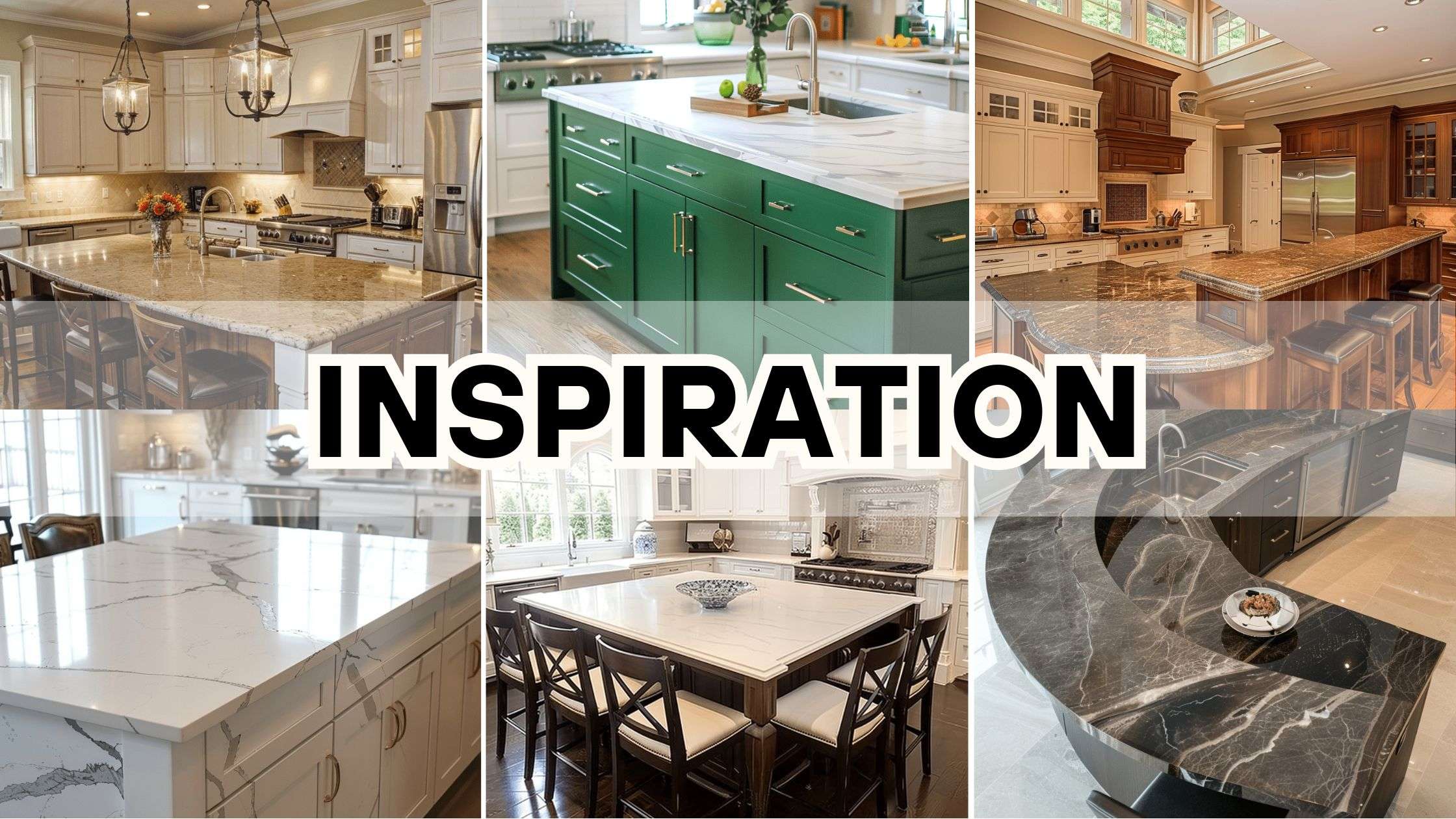A kitchen island can completely transform the look and functionality of your kitchen. 🍏
Whether adding seating, storage, or simply a touch of lightning, the possibilities are endless.✨
From cozy seating nooks to clever storage solutions, we’ve got inspiration for every kitchen (yes, even small ones!).
✔️ Seating options for every family & style
✔️ Creative decor ideas to personalize your space
✔️ Expert tips on materials, shapes & sizes
1. Multi-functional Kitchen Island with Seating
1.1 Modern Seating Options
For a contemporary touch, consider sleek bar stools or custom-built bench seating.
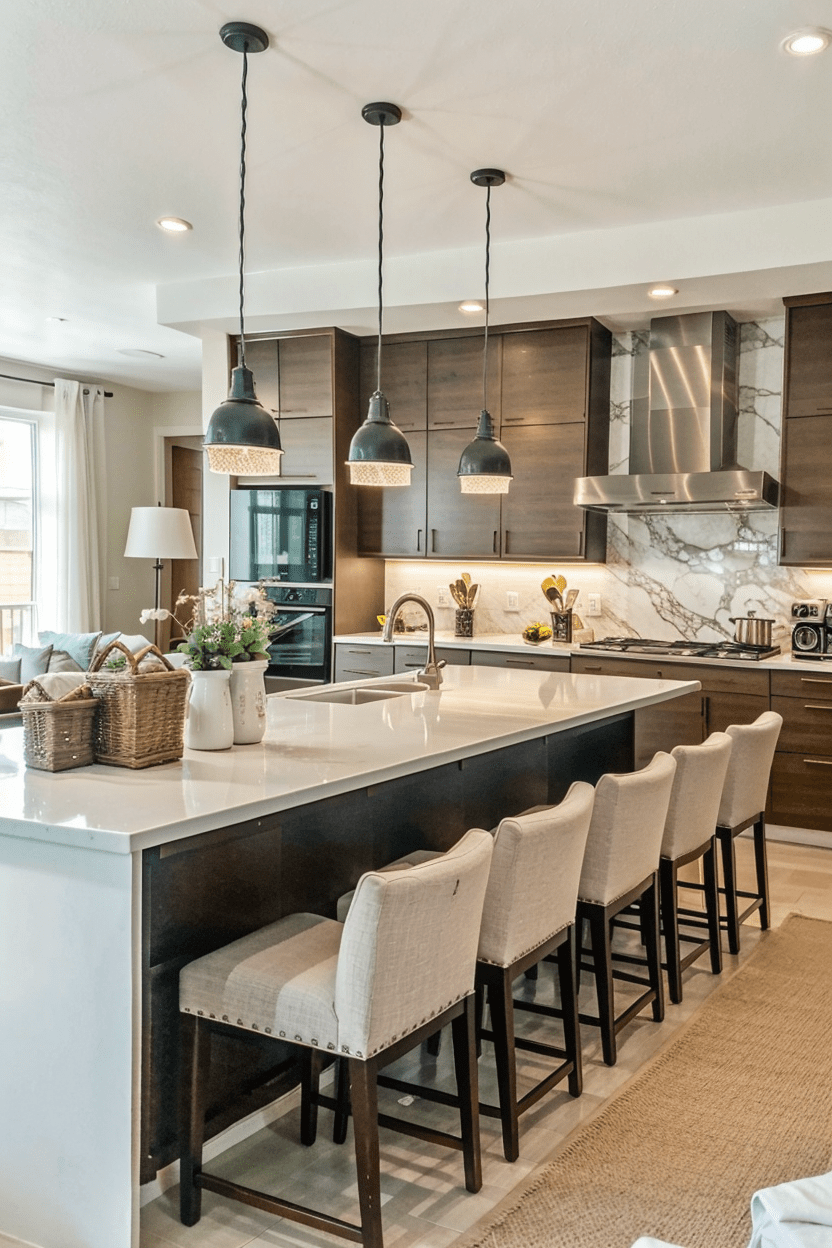
The design works not just as a place to put your food, but as a welcome space to gather at your kitchen.
Ideal For: Modern homes and open-plan living areas.
Pro Tip: Incorporate under-island lighting to make the seating area pop.
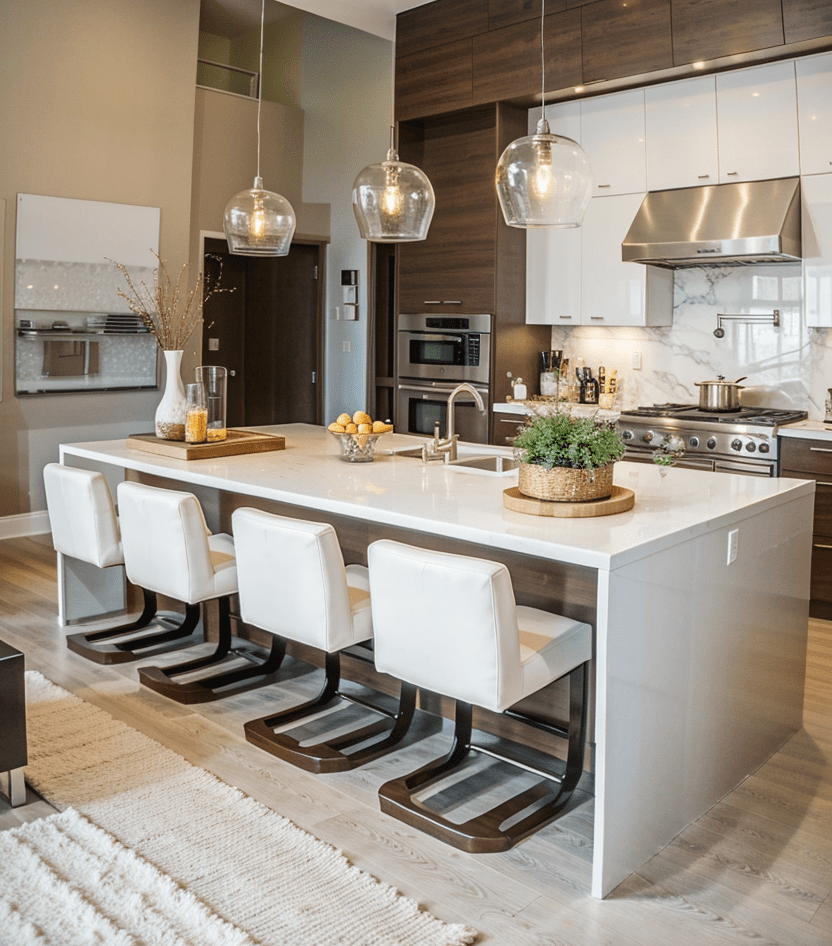
1.2 Family-Friendly Seating
If you have a large family, a kitchen island with a built-in diner-style seating can be the perfect addition.
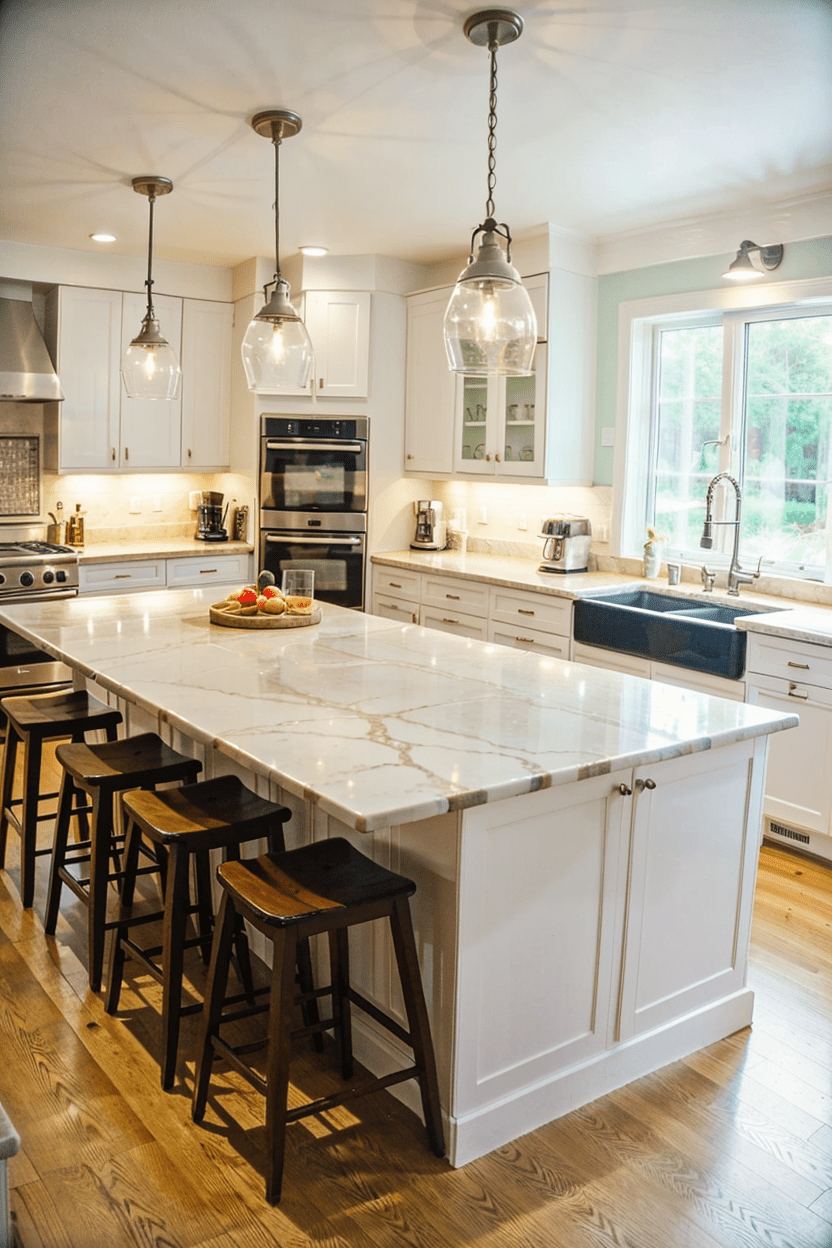
Ideal For: Families who enjoy casual dining.
Pro Tip: Choice durable materials like high-quality wood or laminate that can withstand spills and scratches.
2. Innovative Kitchen Island Lighting
2.1 Pendant Lights Over Your Island
Key for functionality and ambiance, pendant lights add a stylish touch to your kitchen.
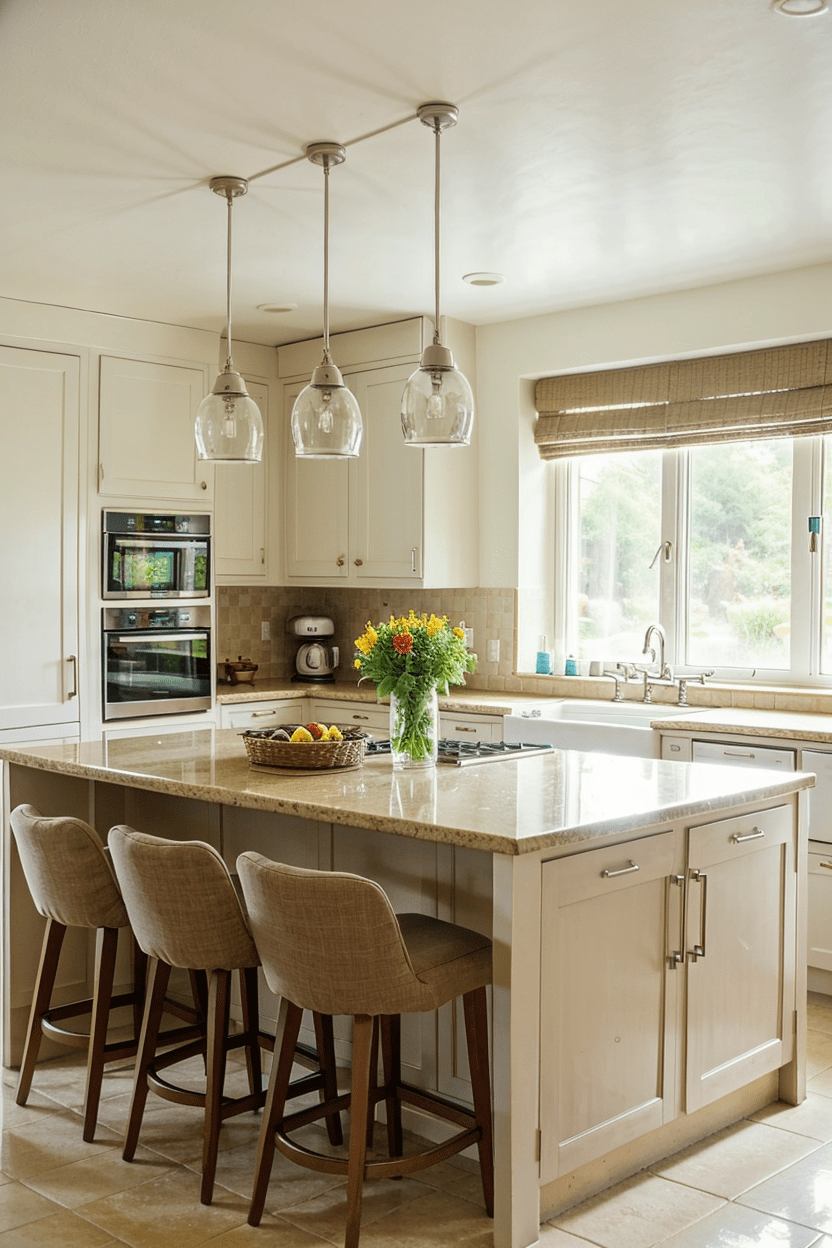
Ideal For: Providing focused lighting for tasks like meal prep.
Pro Tip: Choose adjustable pendants for versatility. 💡
2.2 Layered Kitchen Island Lighting
Combine different types of lighting – under-cabinet lighting, pendant lights, and recessed lights – to create an inviting atmosphere.
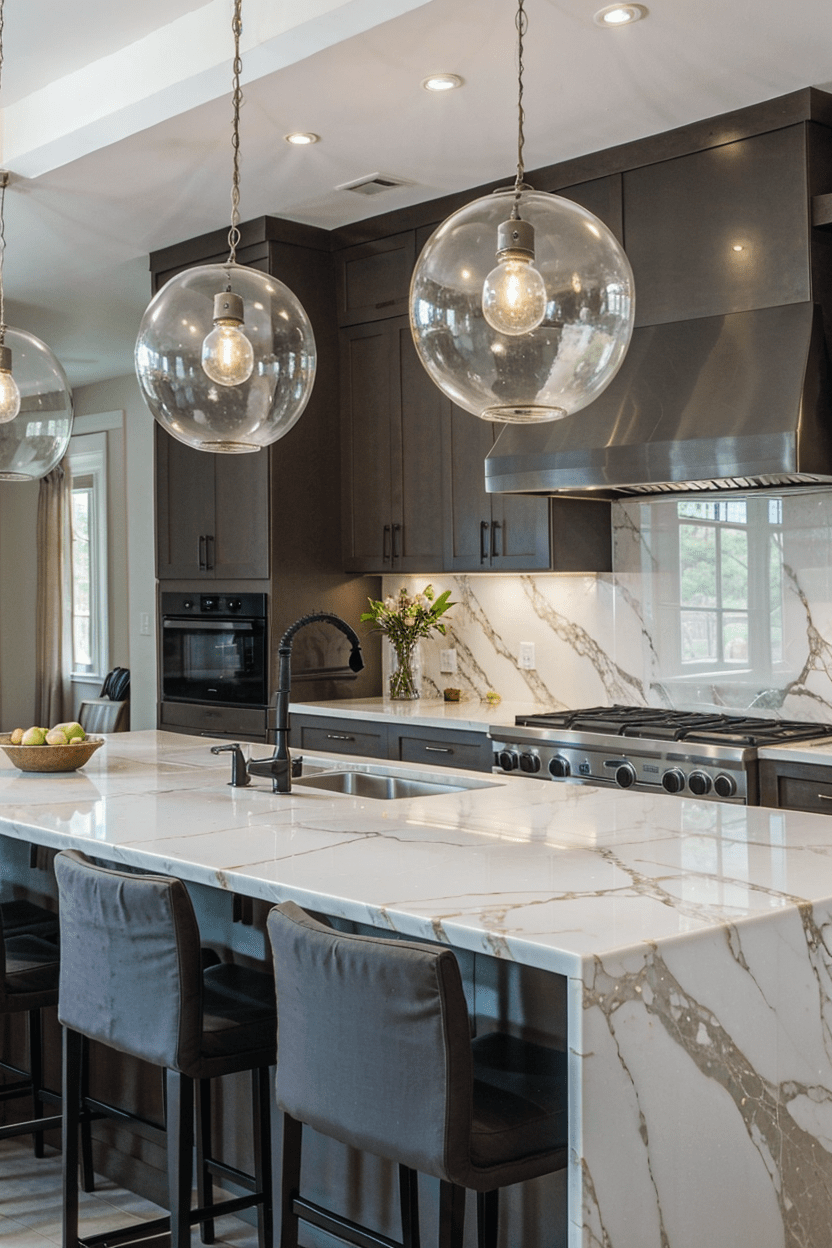
Ideal For: Chic, multi-functional spaces.
Pro Tip: Use dimmers to control the mood and intensity of your kitchen lighting.
3. Small-Space Kitchen Island Ideas
3.1 Compact Kitchen Islands for Small Kitchens
Minimise clutter by choosing a small, but efficient, kitchen island with clever storage features.
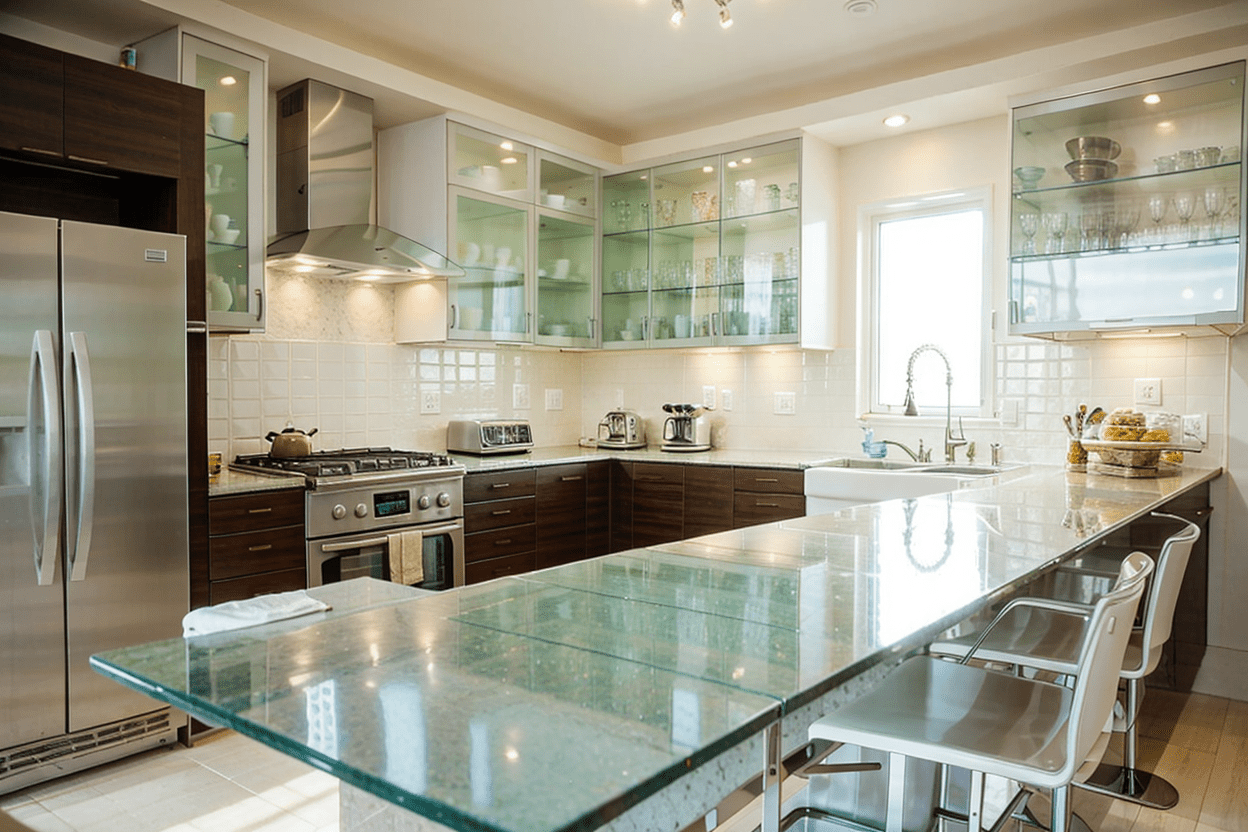
Ideal For: Small kitchens or studio apartments.
Pro Tip: Use multi-tiered shelves and hooks to make the most of every inch.
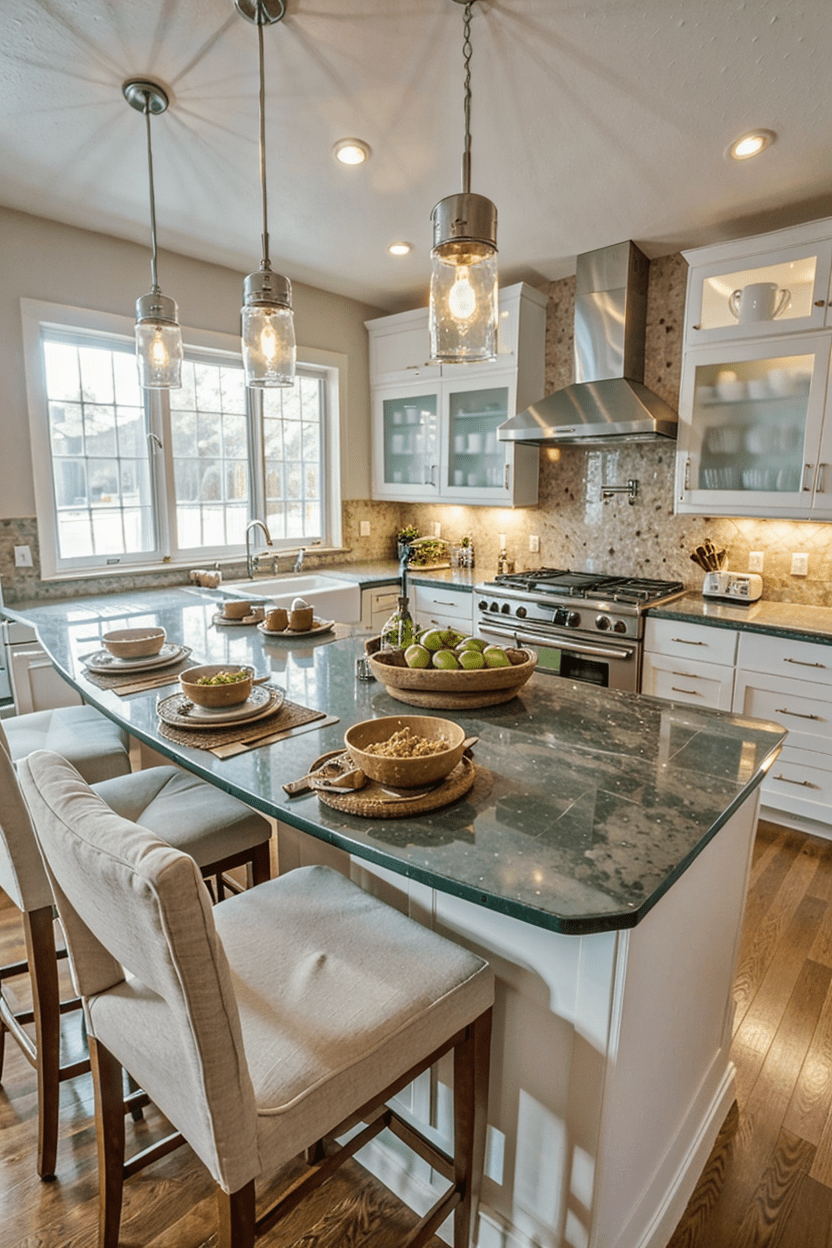
3.2 Rolling Kitchen Islands
A kitchen island on wheels can be an excellent solution for small spaces, allowing for flexibility and mobility.
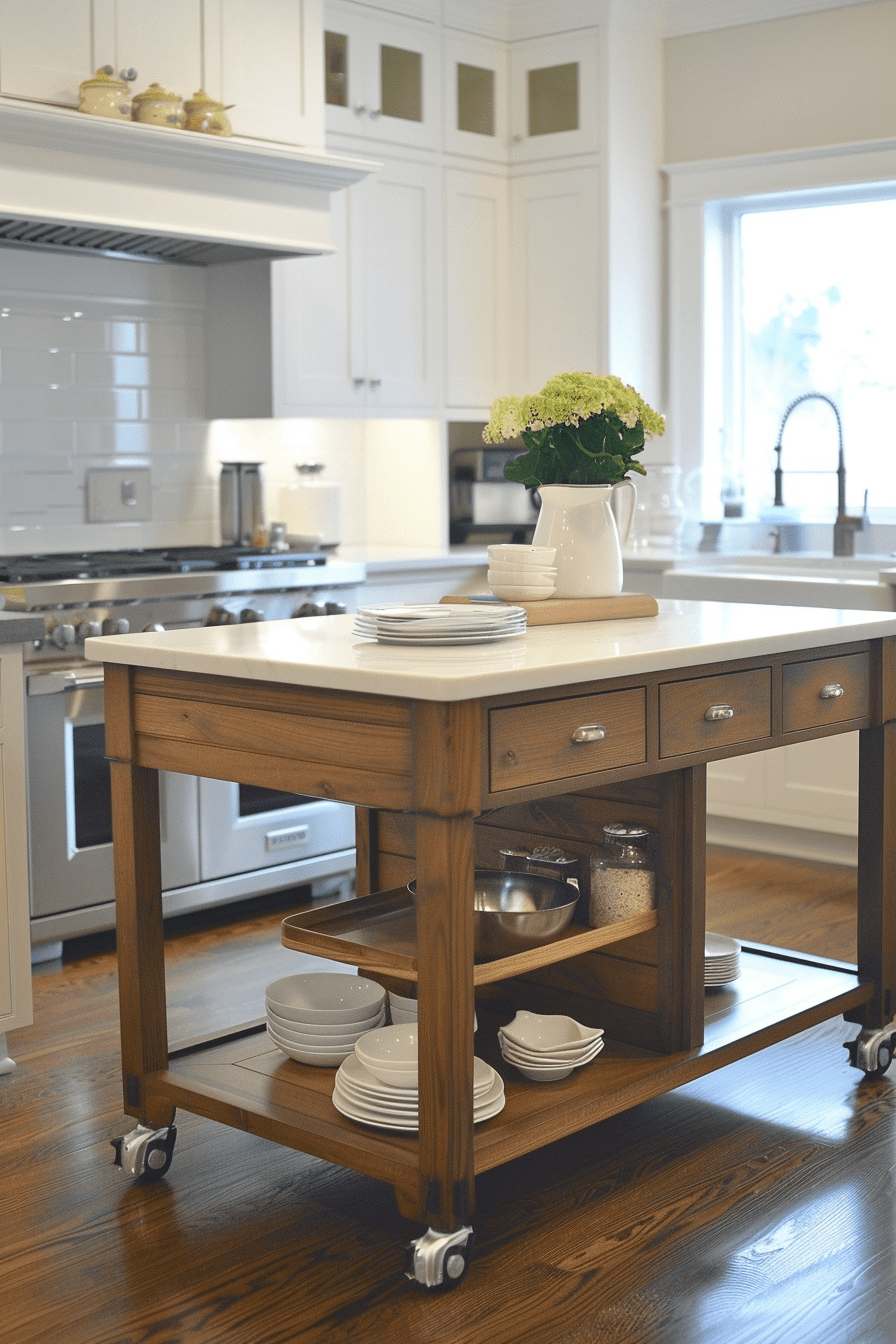
Ideal For: Temporary cooking spaces or open-plan areas.
Pro Tip: When not in use, it can easily be rolled to a corner or another room.
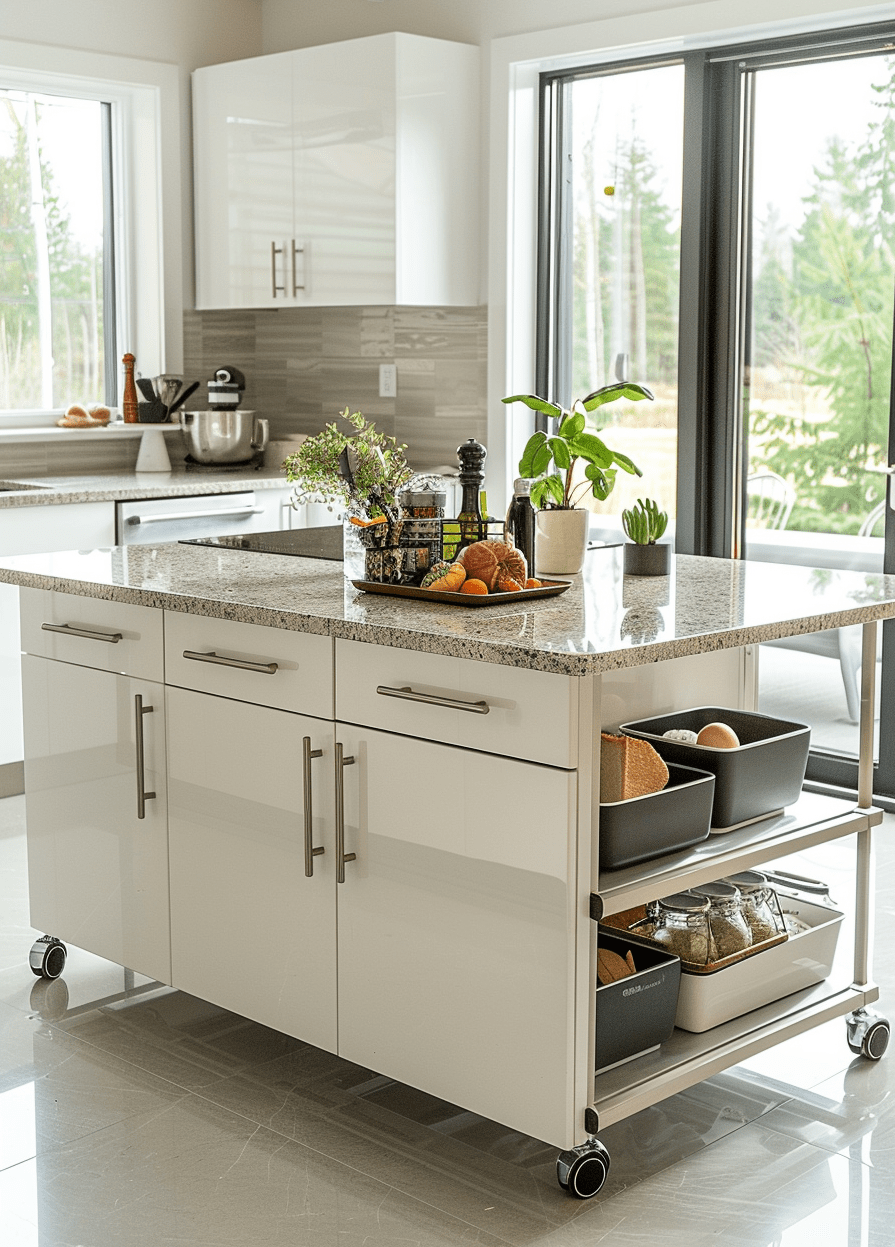
4. Creative Kitchen Island Decor Ideas
4.1 Centerpieces & Greenery
Bring your kitchen island to new heights with the addition of floral or fruit centerpieces.
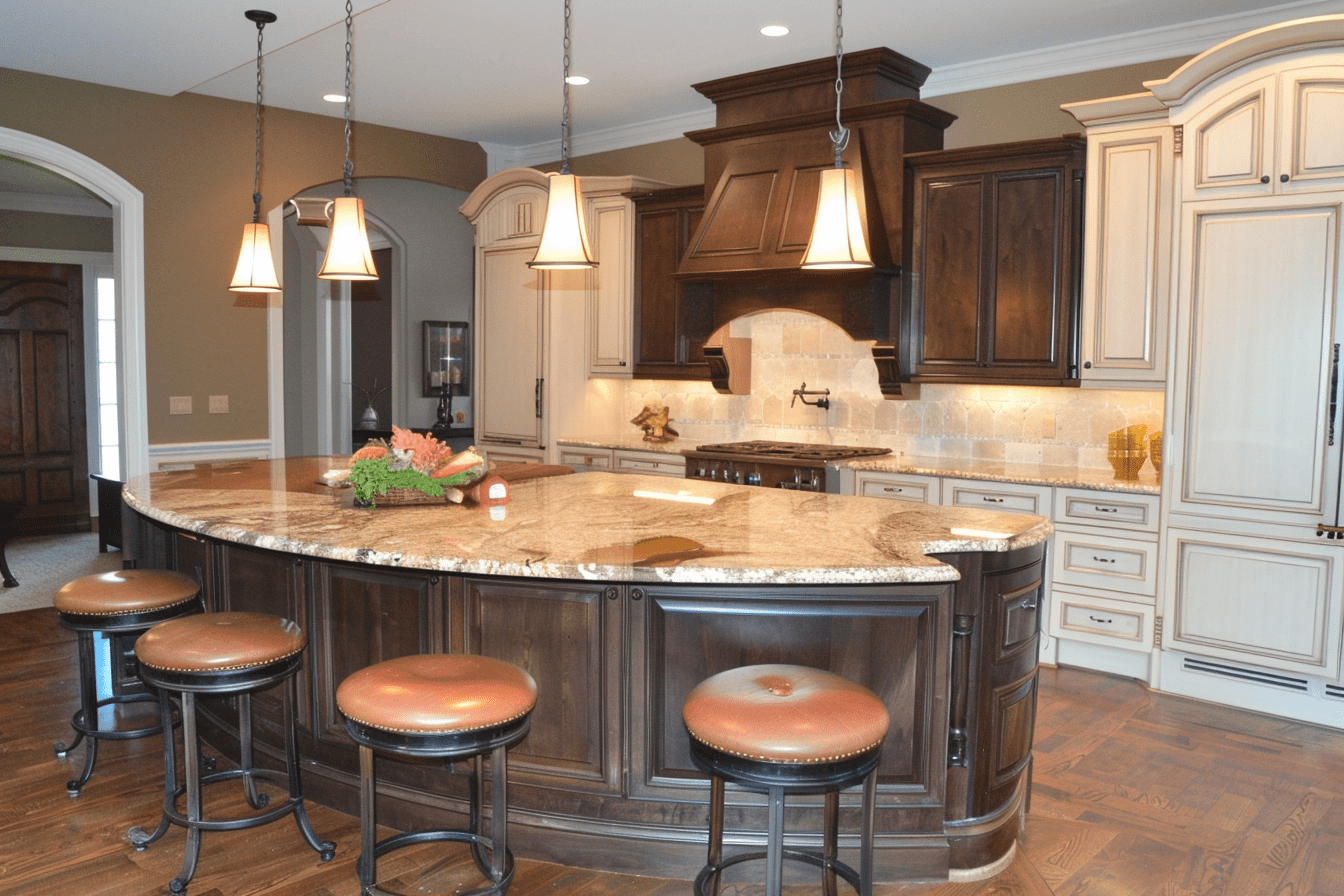
Ideal For: Adding a burst of color to your kitchen.
Pro Tip: Succulents or herbs in chic planters can add a touch of nature while remaining low-maintenance.
4.2 Seasonal Decor
Rotate seasonal decorations to keep your kitchen feeling fresh and up-to-date.
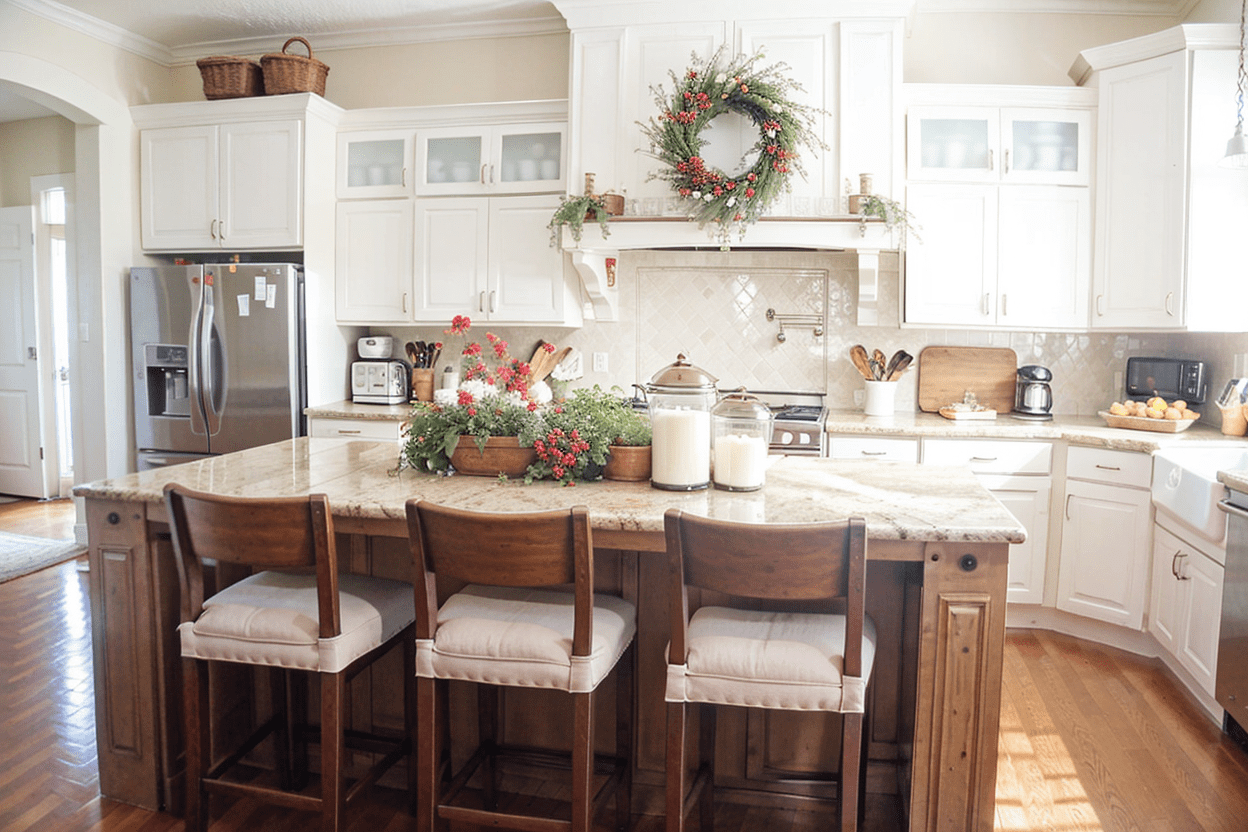
Ideal For: Homeowners who love to celebrate holidays and seasons.
Pro Tip: Use neutral-colored trays or vases as bases to make switching decor hassle-free.
5. Kitchen Island Designs to Suit Every Taste
5.1 Modern and Minimalist Islands
If you prefer a modern, streamlined style, go for a monochrome palette with crisp, straight lines.
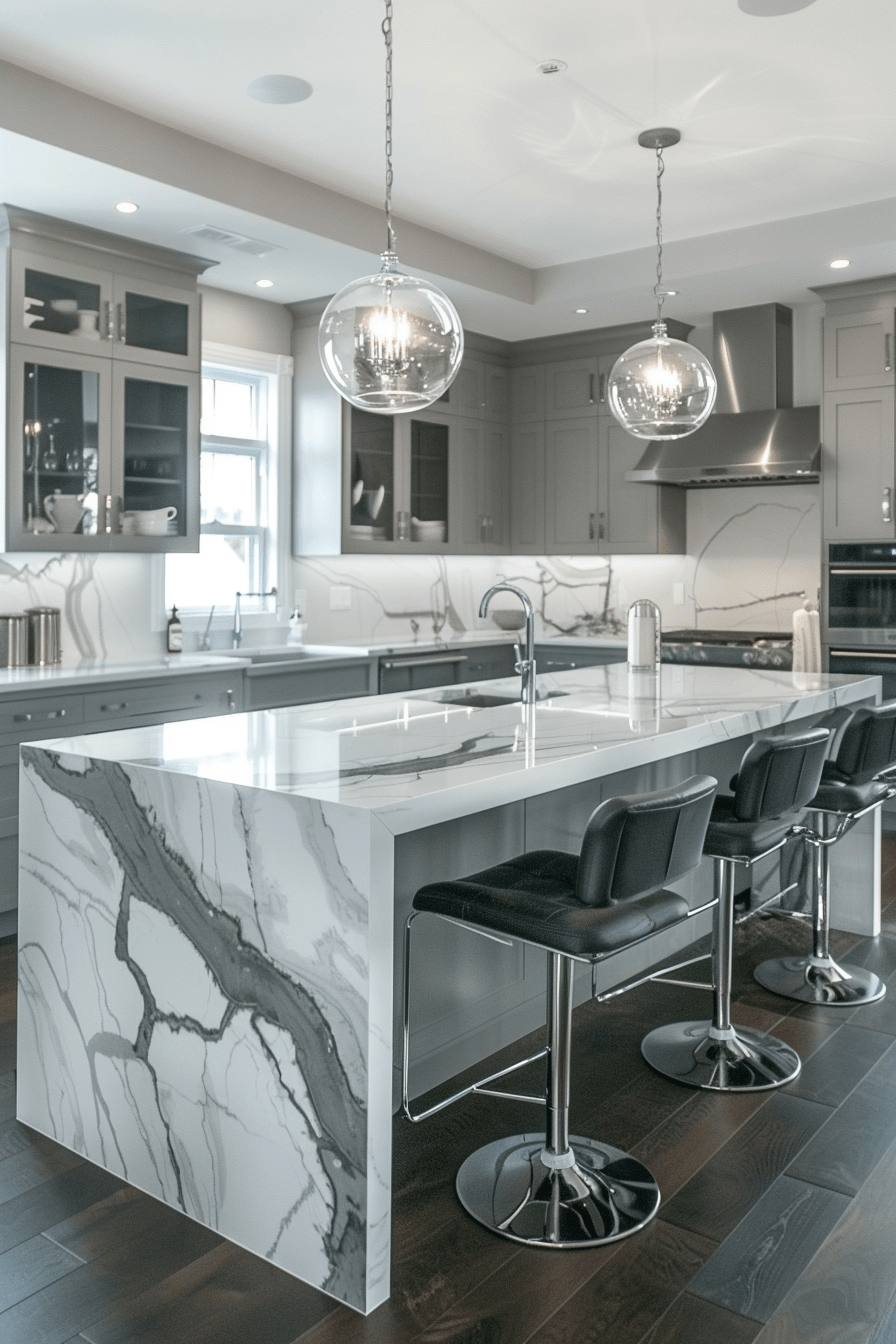
Ideal For: Modern homes with an open-plan layout.
Pro Tip: Use sleek, built-in appliances to keep surfaces clutter-free.
5.2 Rustic & Farmhouse Islands
Bring the countryside into your home with salvaged wood and shabby-chic fixtures.
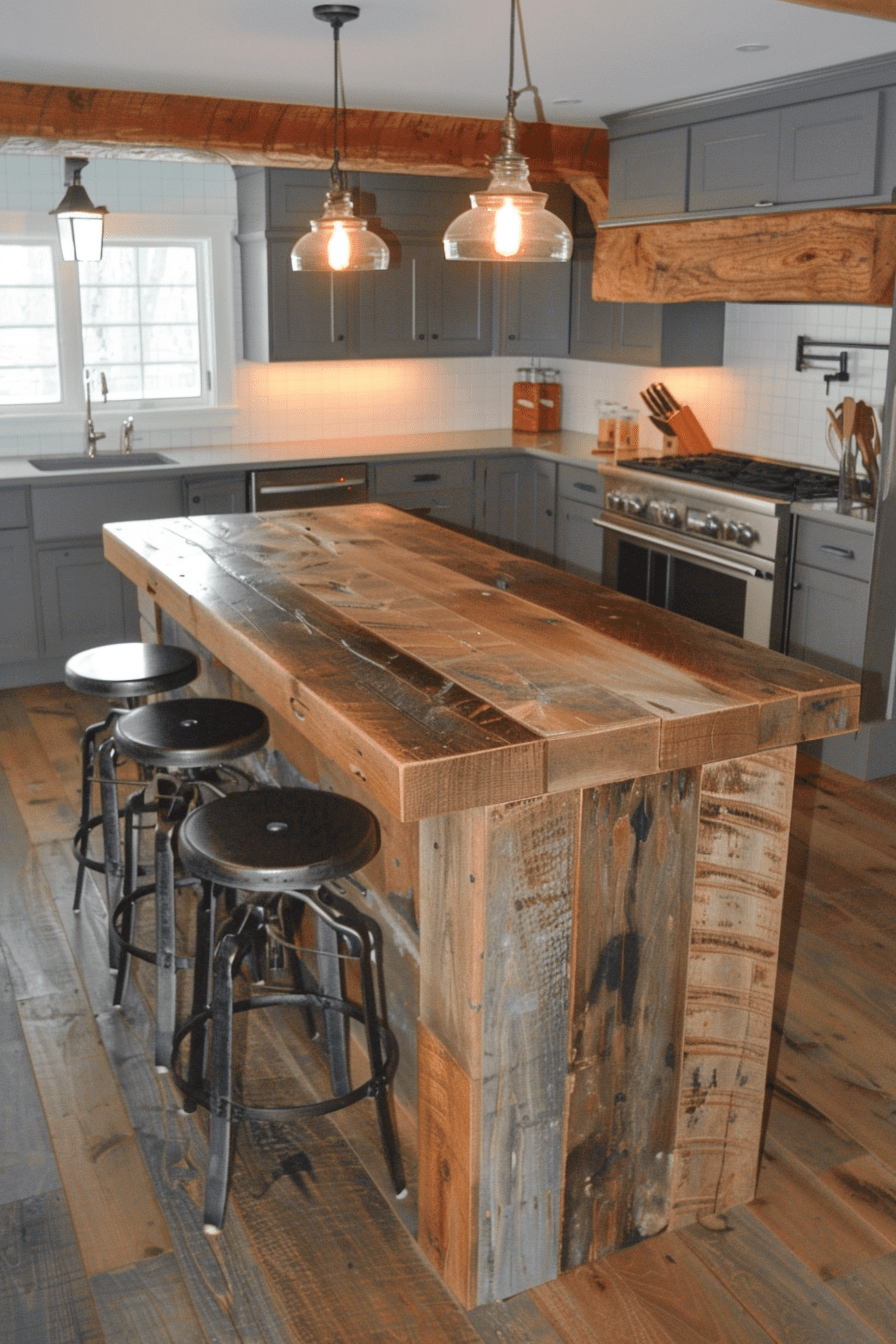
Ideal For: Homes that emphasize a cozy, lived-in feel.
Pro Tip: Complement the style with vintage knick-knacks and mismatched bar stools.
6. Functional Kitchen Island Features
6.1 Islands with Built-in Storage
Make the most of your kitchen island by incorporating drawers, cabinets, and open shelving.
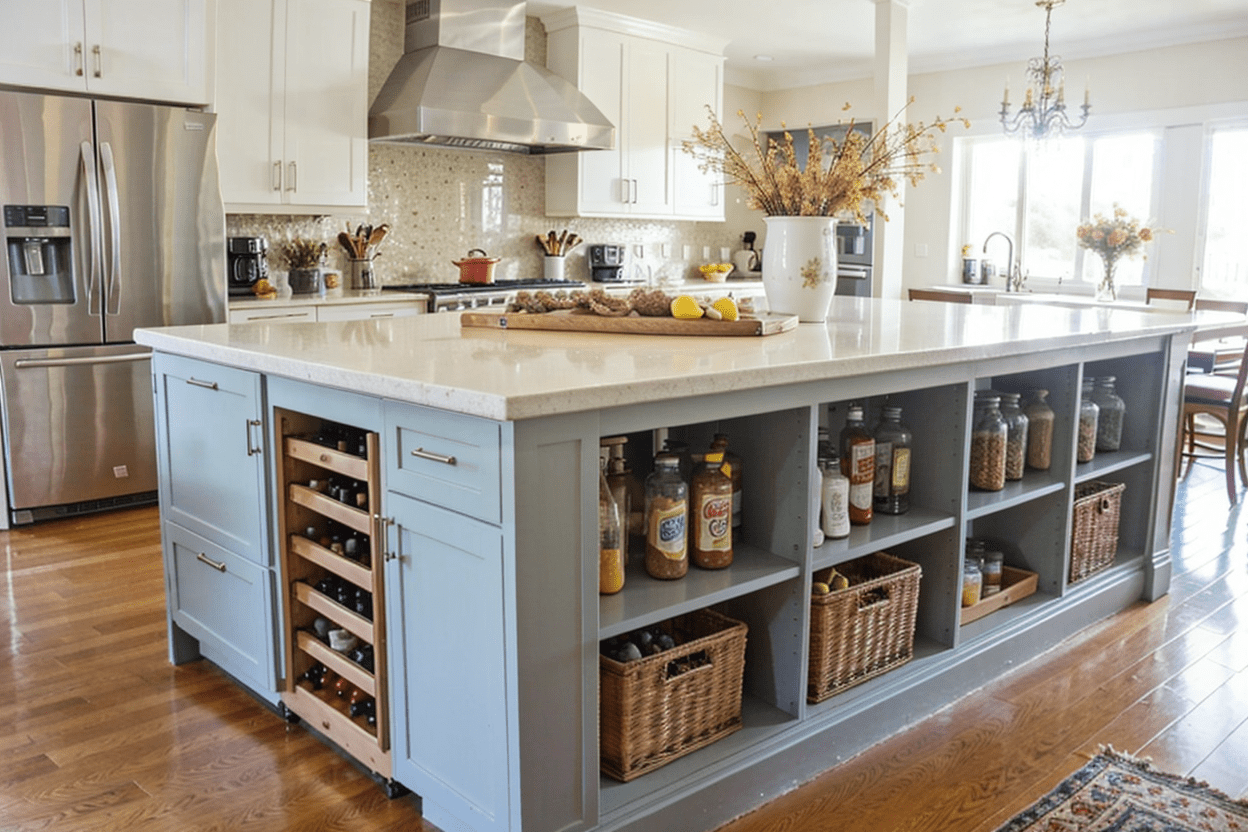
Ideal For: Keeping your kitchen organized and clutter-free.
Pro Tip: Use pull-out shelves and hidden compartments for added functionality.
6.2 Islands with Appliances
Consider incorporating a sink, stovetop, or even a mini-fridge into your kitchen island.
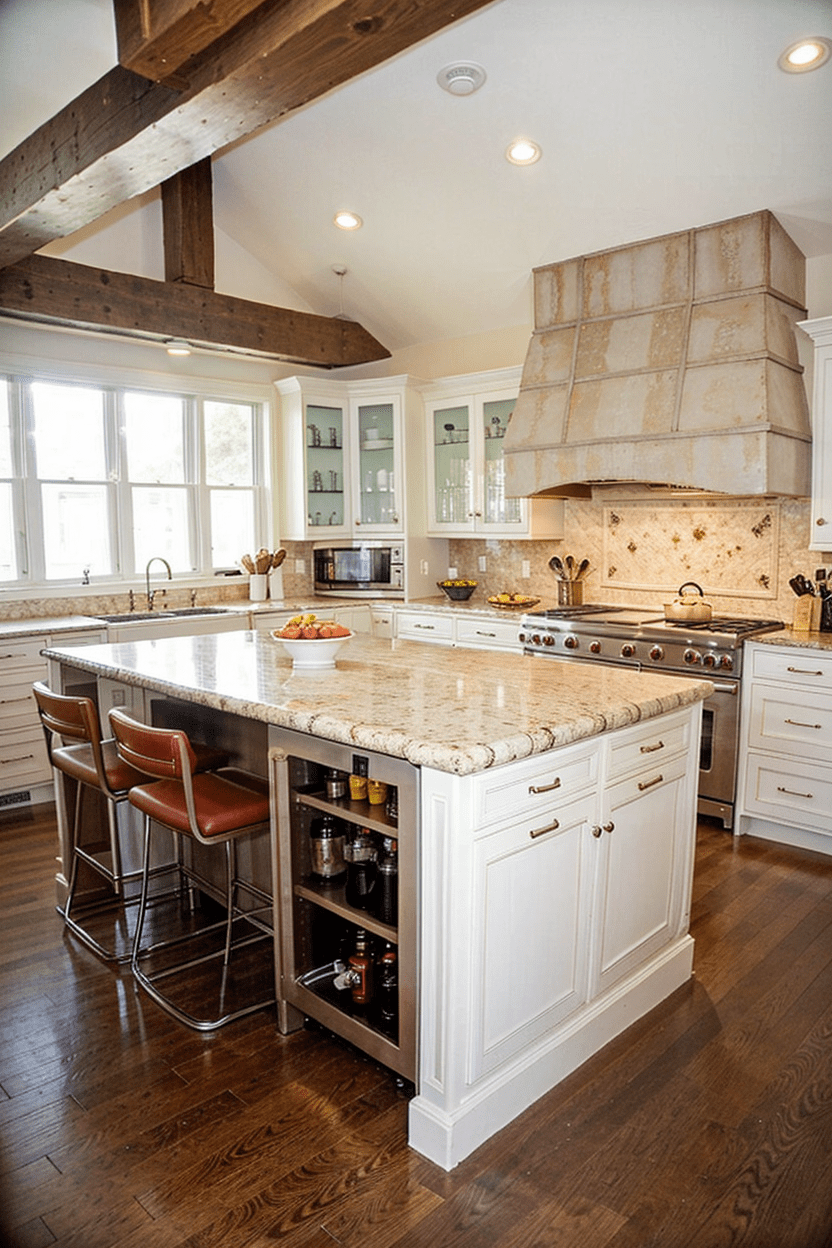
Ideal For: Streamlining your cooking process.
Pro Tip: Ensure there is enough ventilation and wiring if you are integrating appliances.
7. Thoughtful Kitchen Island Countertops
7.1 Granite & Marble Countertops
These materials add a touch of luxury while being highly durable.
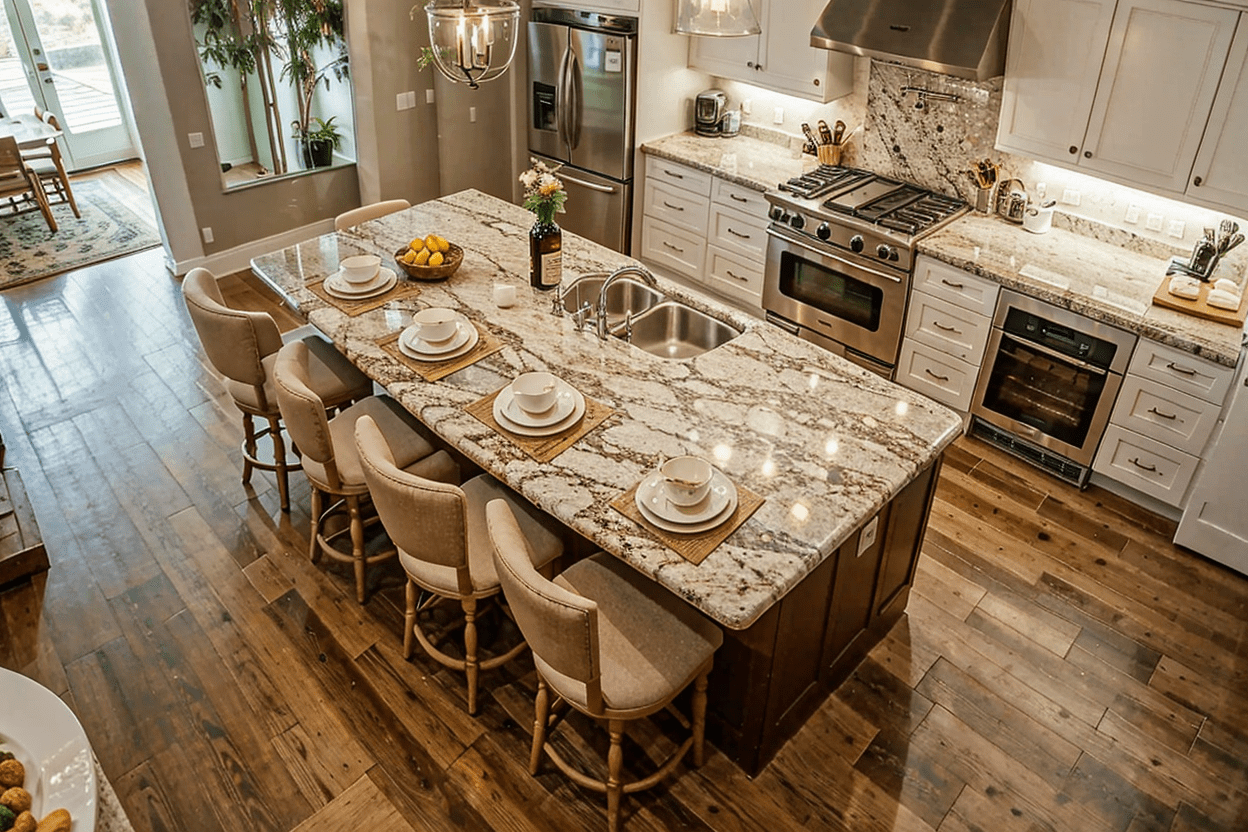
Ideal For: Creating a high-end look.
Pro Tip: Use different finishes to complement the rest of your kitchen decor.
7.2 Butcher Block Countertops
This butcher block countertop is ideal for a less formal or country kitchen.
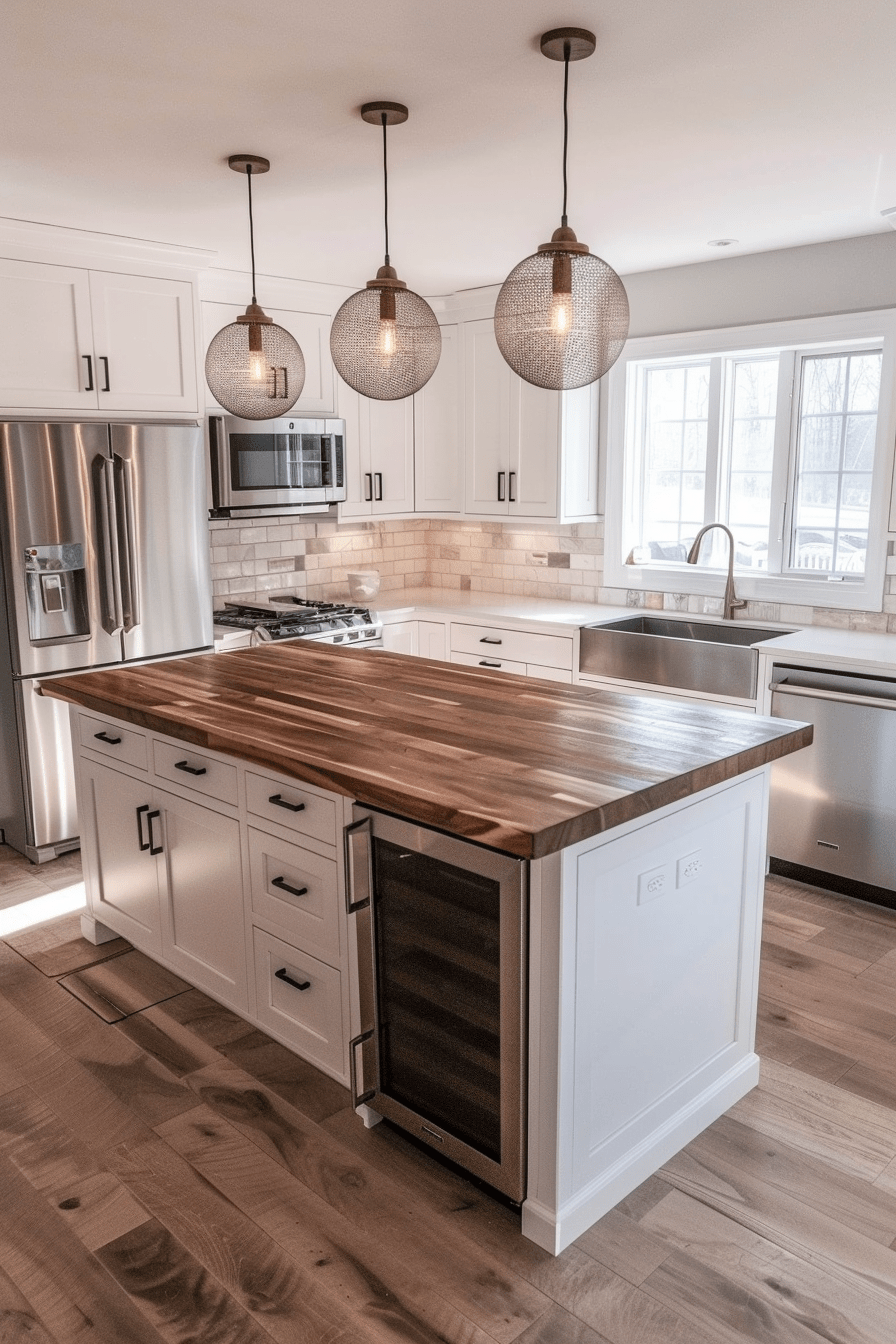
Ideal For: Home chefs who need extra prep space.
Pro Tip: Regularly treat the wood to maintain its appearance and durability.
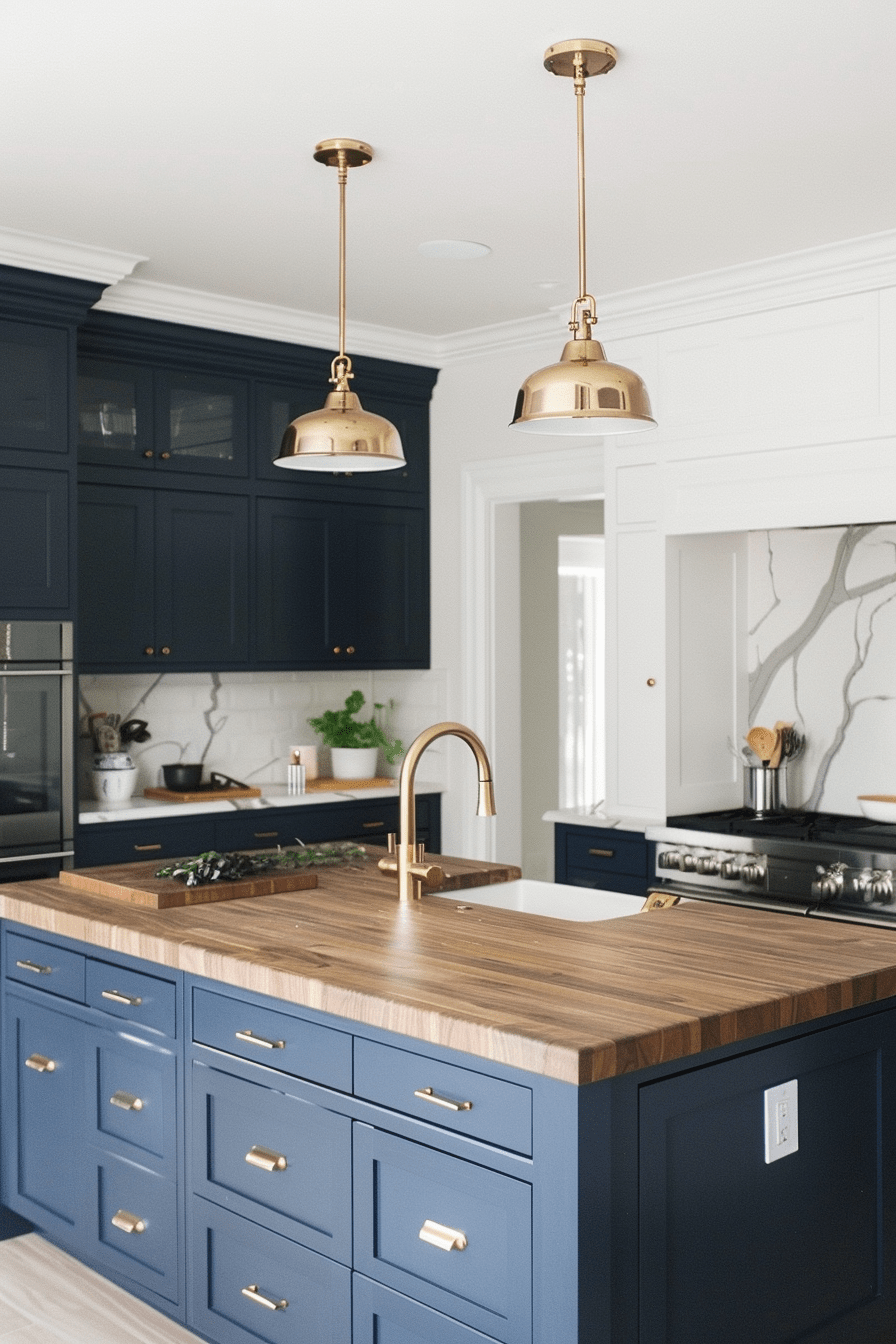
Types of Kitchen Islands
Kitchen islands are a great focal point in kitchen design which can be as practical as it is decorative depending on the user’s preference.
Their type, structure and mobility being decisive factors in the usability of the area and how effectively it is integrated into your house.
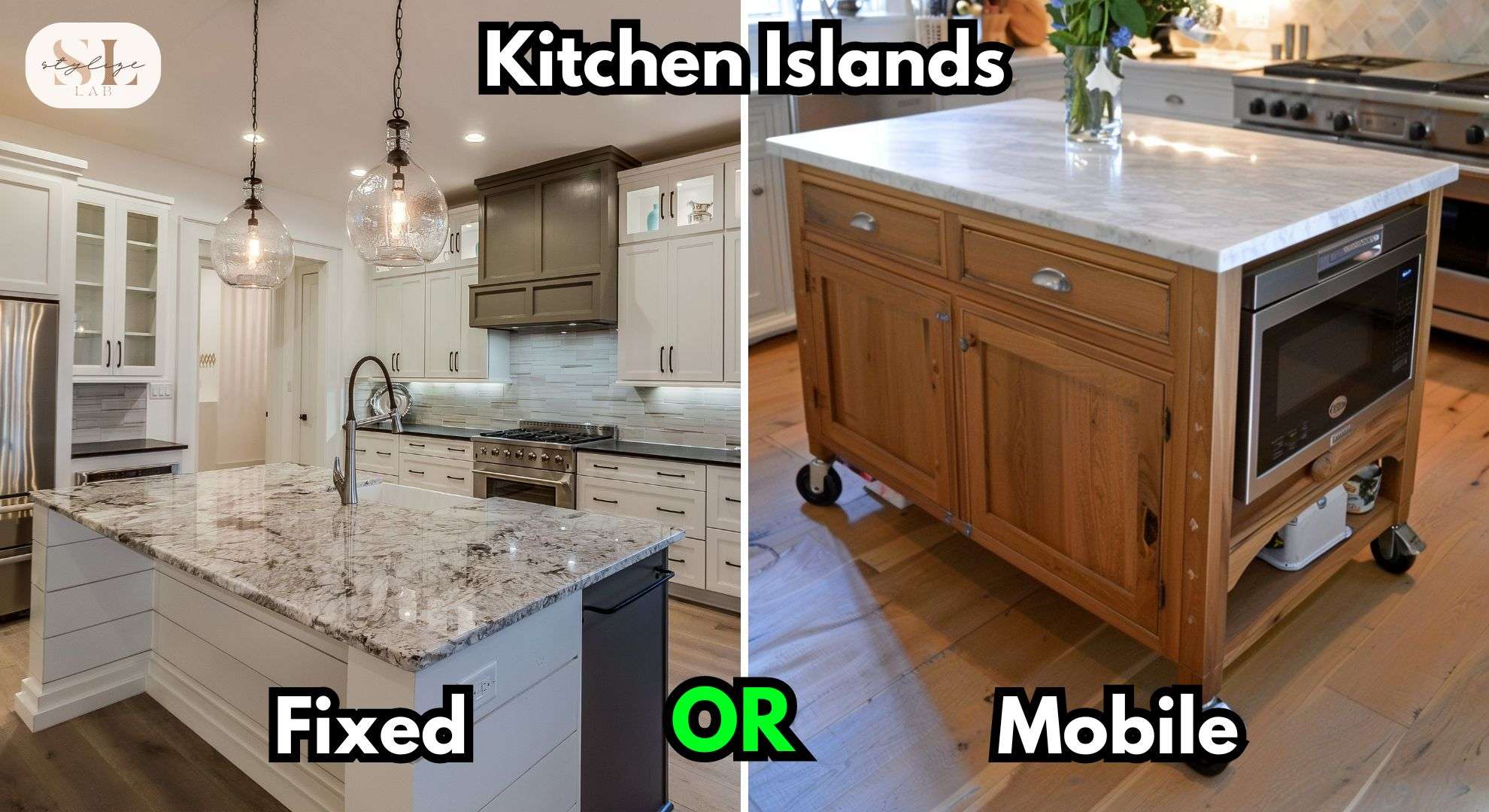
Below is a detailed description of the types of the kitchen islands.
Fixed vs. Mobile
Fixed Kitchen Islands
A fixed kitchen island is constructed and fixed to the floor, attached to the kitchen design at the original construction or during a total renovation.
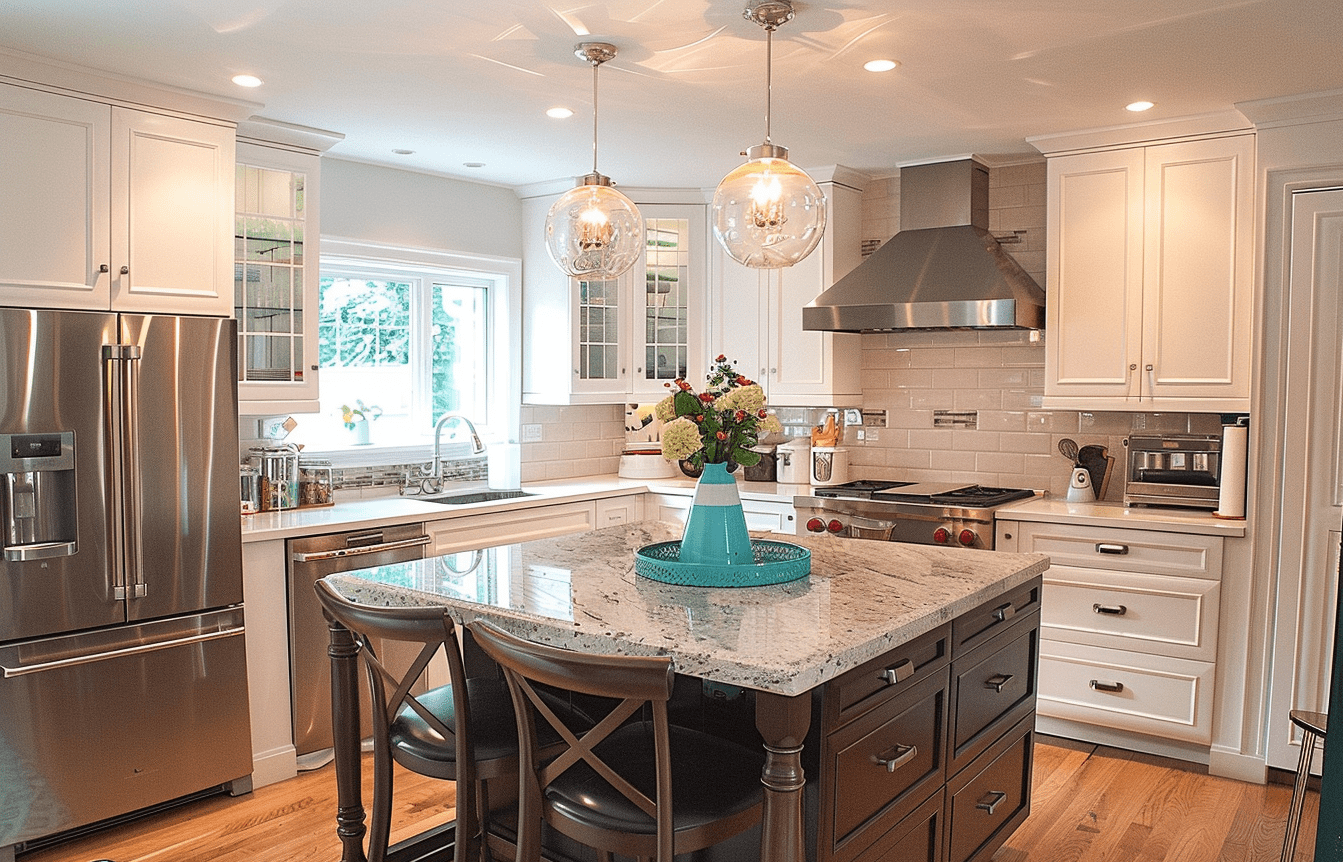
Pros:
Stability: Literally locked in place, they will allow you to handle heavier workloads, such as kneading dough or chopping vegetables, without anything wobbling. 🍞
Customizability: Particularly custom-built, they can be made to fit the proportions and shape of the kitchen exactly.
Integrated Features: Fixed islands can have a variety of features, including sinks, cook tops, electrical outlets, and built-in appliances. 🎛️♨️
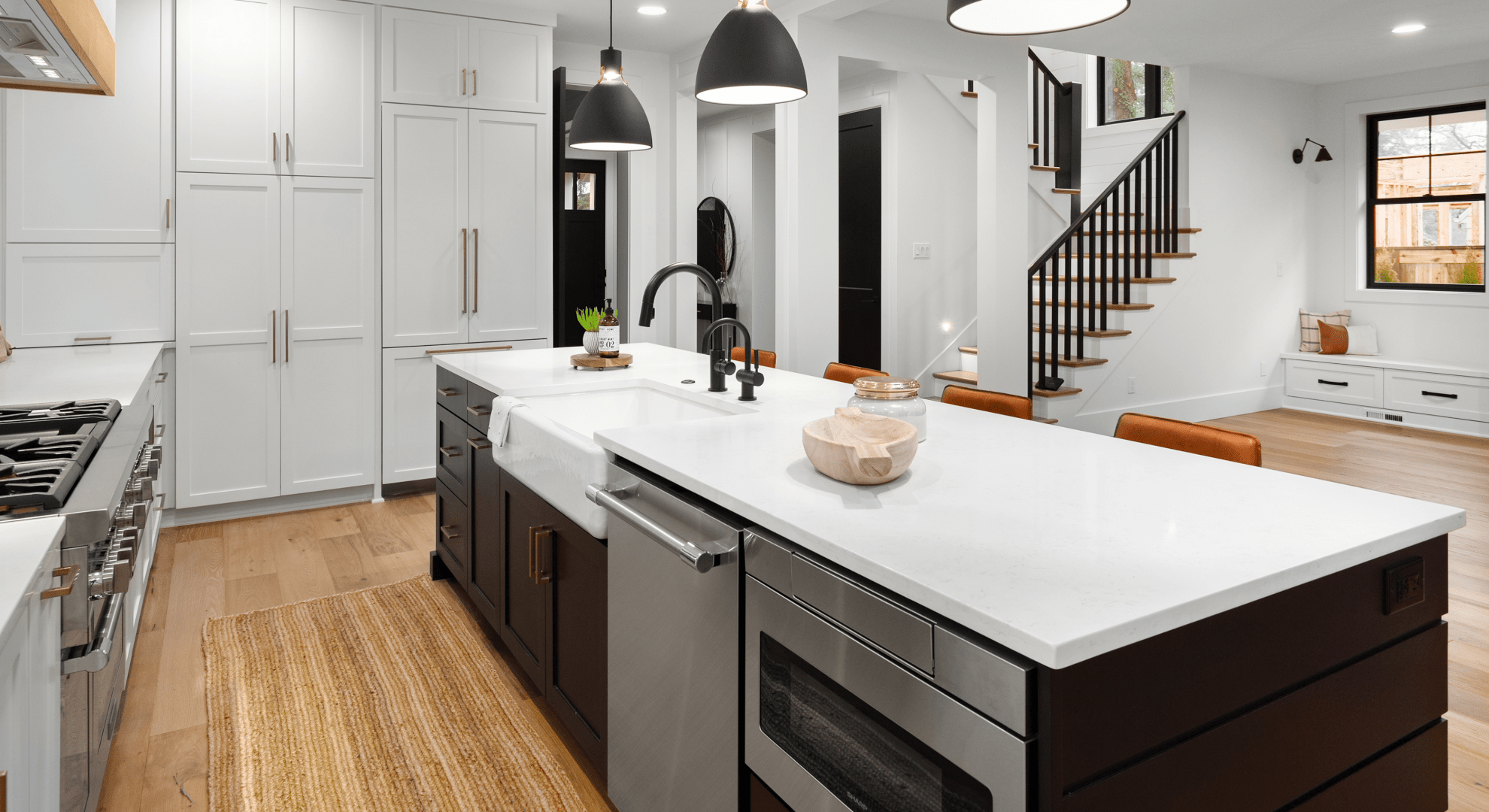
Cons:
Less Flexibility: When installed, the kitchen is more difficult to reconfigure.
Higher Cost: Installation can be expensive, especially with additional plumbing or electrical work.
Mobile Kitchen Islands
A mobile kitchen island is an independent unit that can be wheeled to a position where required.
It is set upon a frame which enables mobility and perfect functionality while cooking.
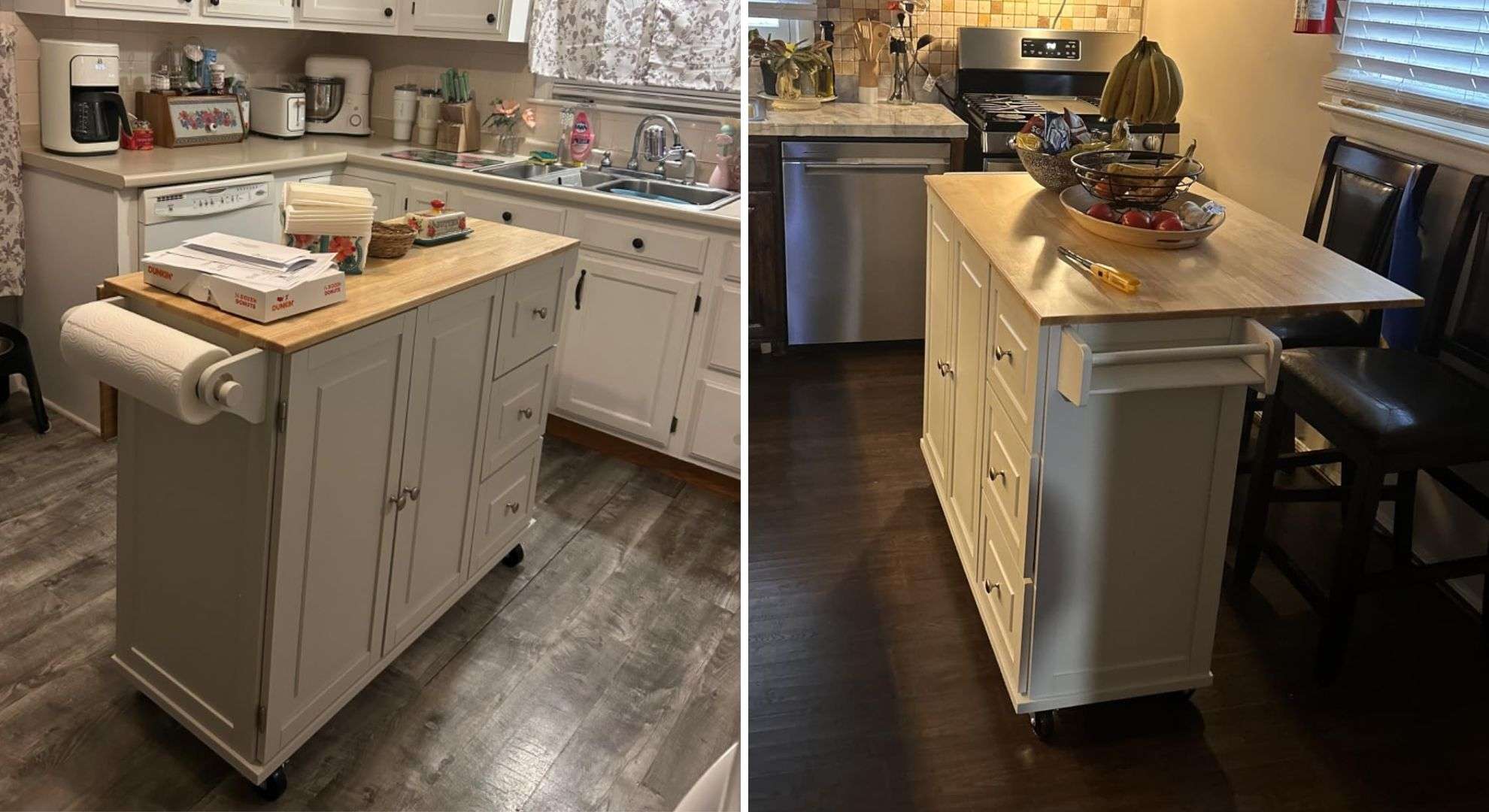
Pros:
Flexibility: They offer the freedom to rearrange the kitchen layout, which is ideal for smaller spaces or kitchens that serve multiple functions.
Cost-Effective: Generally less expensive than fixed islands, they are an affordable option for those on a budget.
Additional Workspace: Ideal for adding extra countertop and storage space without a permanent commitment.
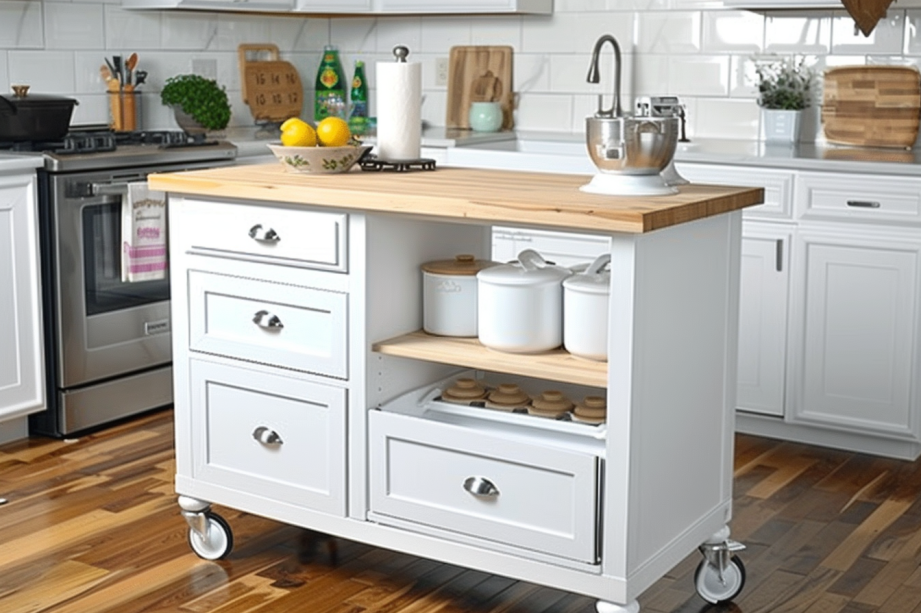
Cons:
Stability: Mobile islands may not be as stable as fixed ones, limiting their use for certain heavy-duty tasks.
Fewer Integral Features: They don’t generally feature more complex integral features, such as sinks or cooktops, though some high-end models might.
Pre-Manufactured vs. Custom-Built
Pre-Manufactured Kitchen Islands
Pre-manufactured islands are ready-made units that can be bought in a furniture or kitchen supply store. They are usually standard in size, shape and material.
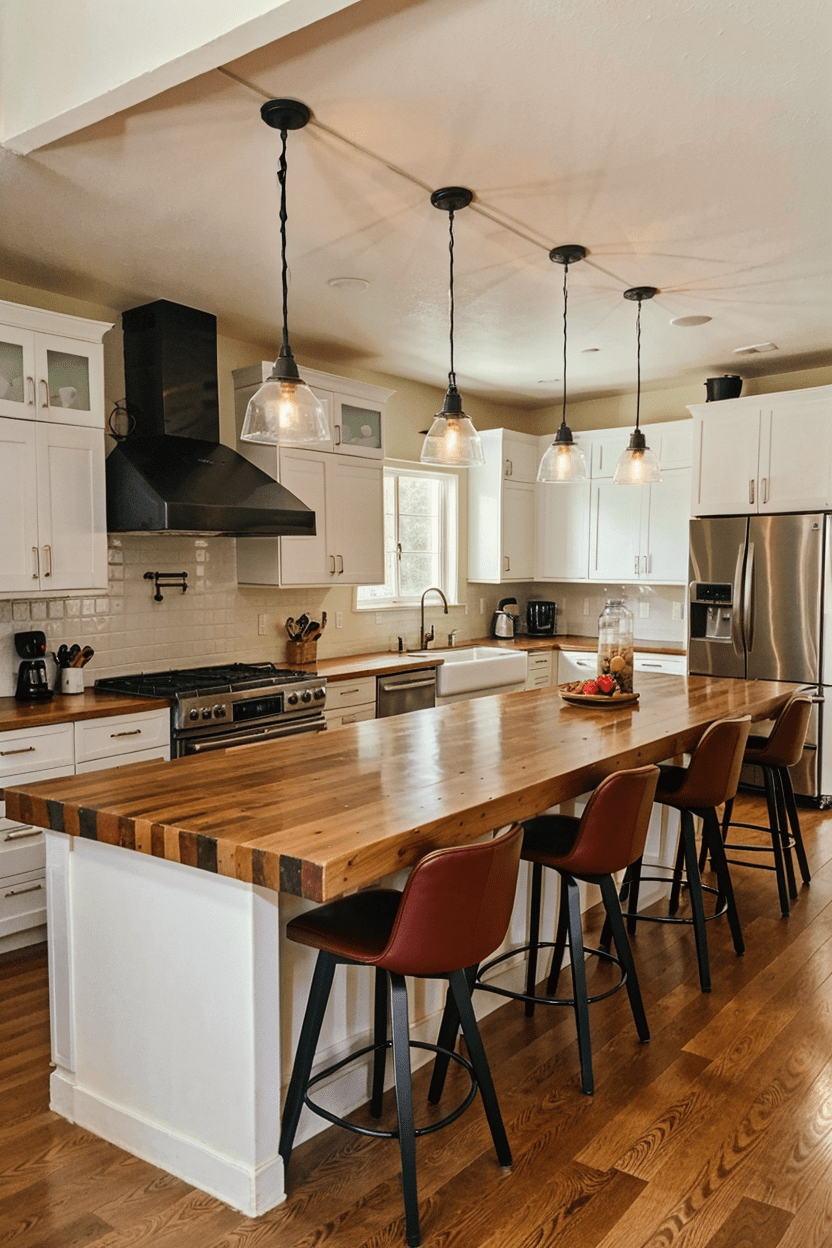
Pros:
Convenience: They are easy to purchase and generally quicker to install, often just requiring assembly.
Cost: More budget-friendly compared to custom-built options.
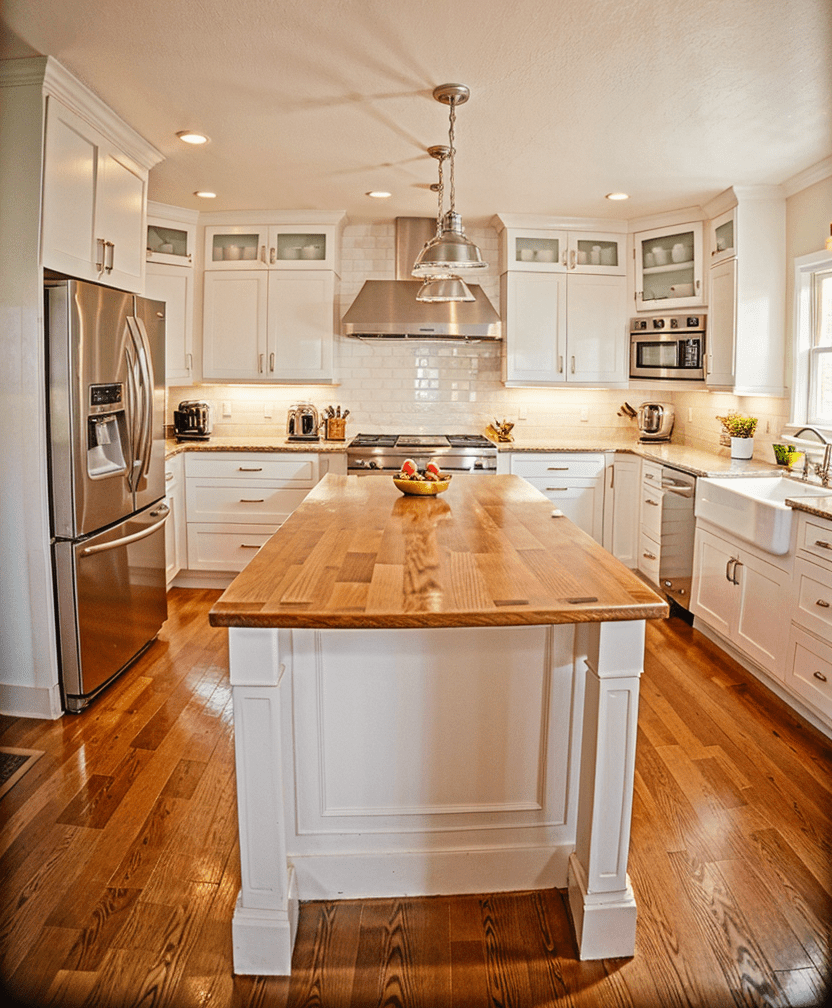
Versatility: Available in a wide assortment of styles and finishes, fashionable or classic, which should make it easier for kitchens to match.
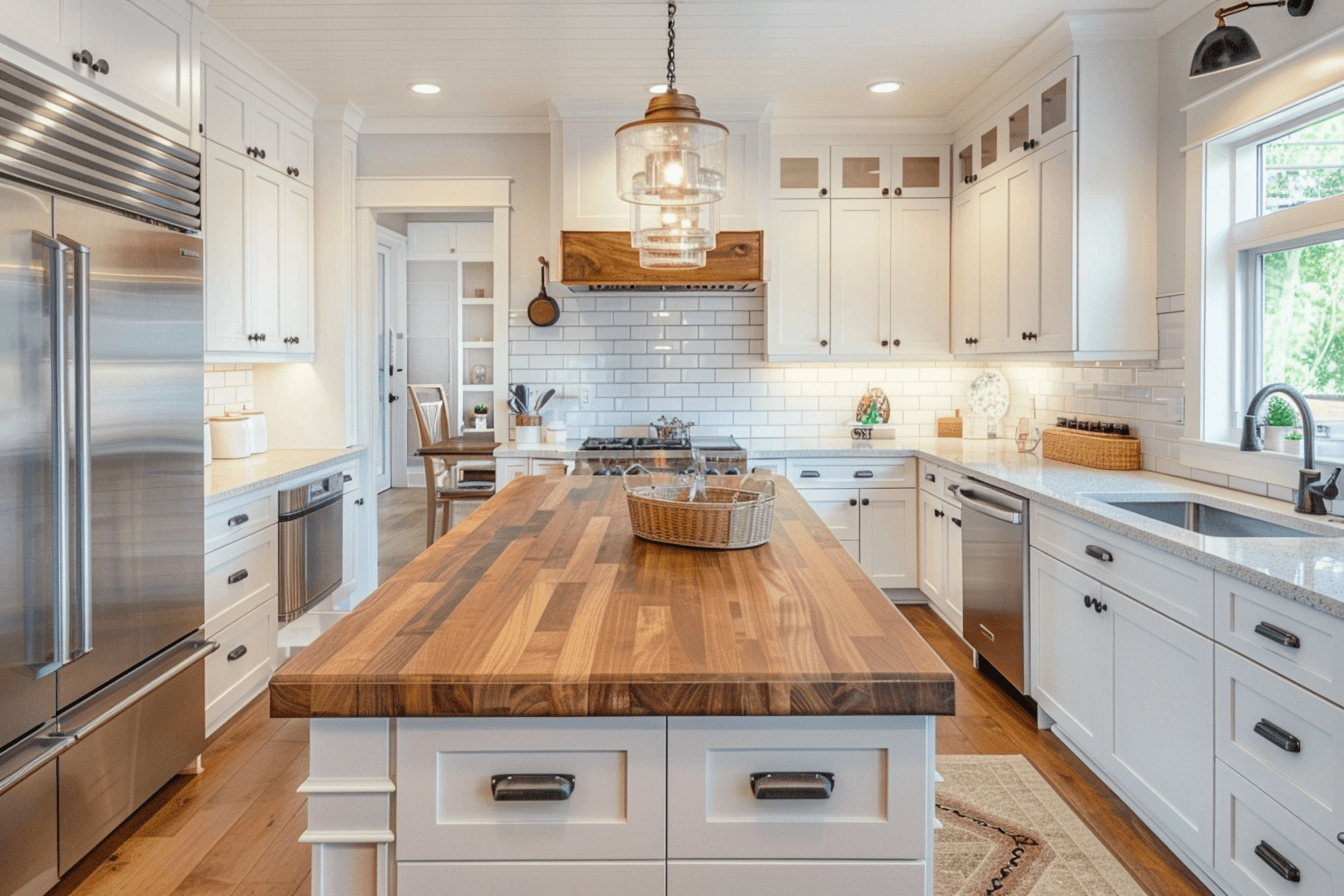
Cons:
Limited Customization: Options are limited to the models available, which might not fit perfectly or match the specific aesthetics of your kitchen.
Quality: May offer less durability and lower-quality materials compared to custom-built islands.
Custom-Built Kitchen Islands
Custom-made kitchen islands will be made to fit the size, shape, the material, design and the functionality that a homeowner prefers.
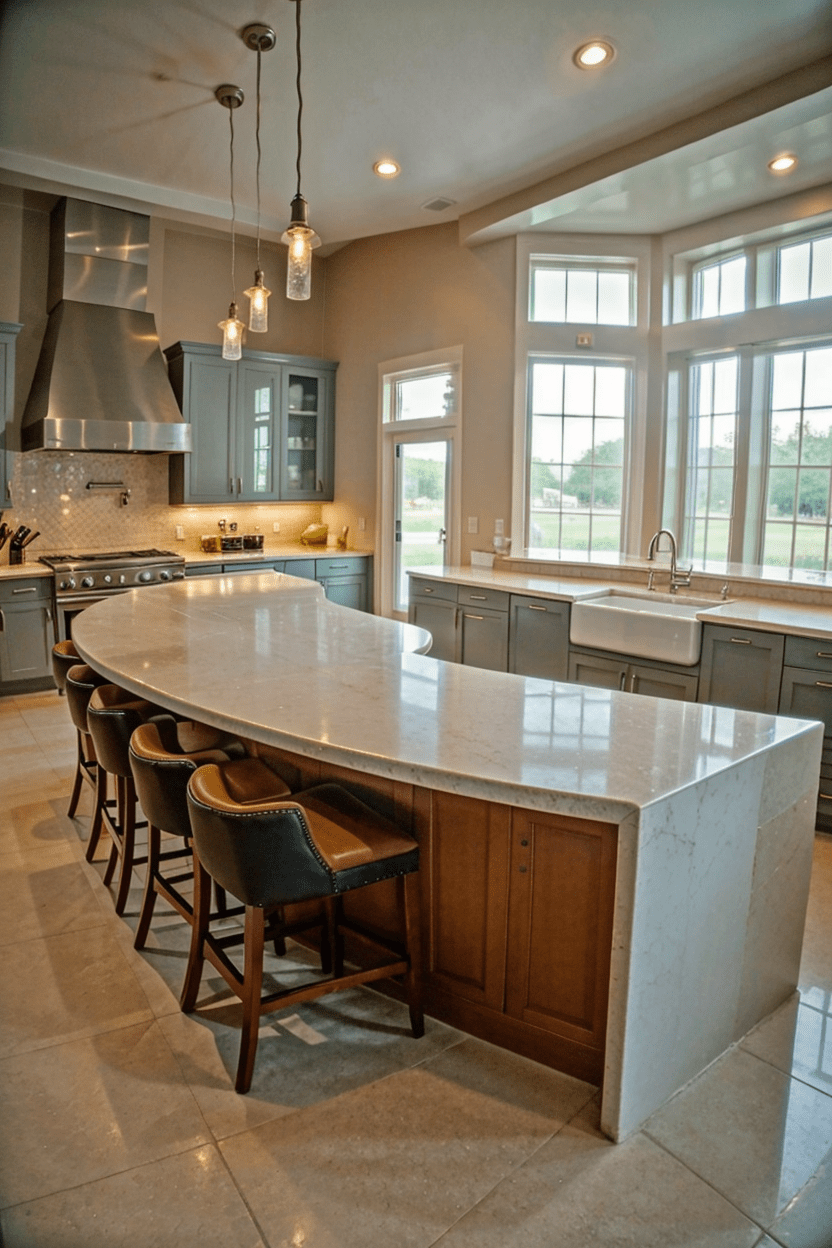
Pros:
Personalization: Fully customizable to match the kitchen’s dimensions, style, and functional requirements.
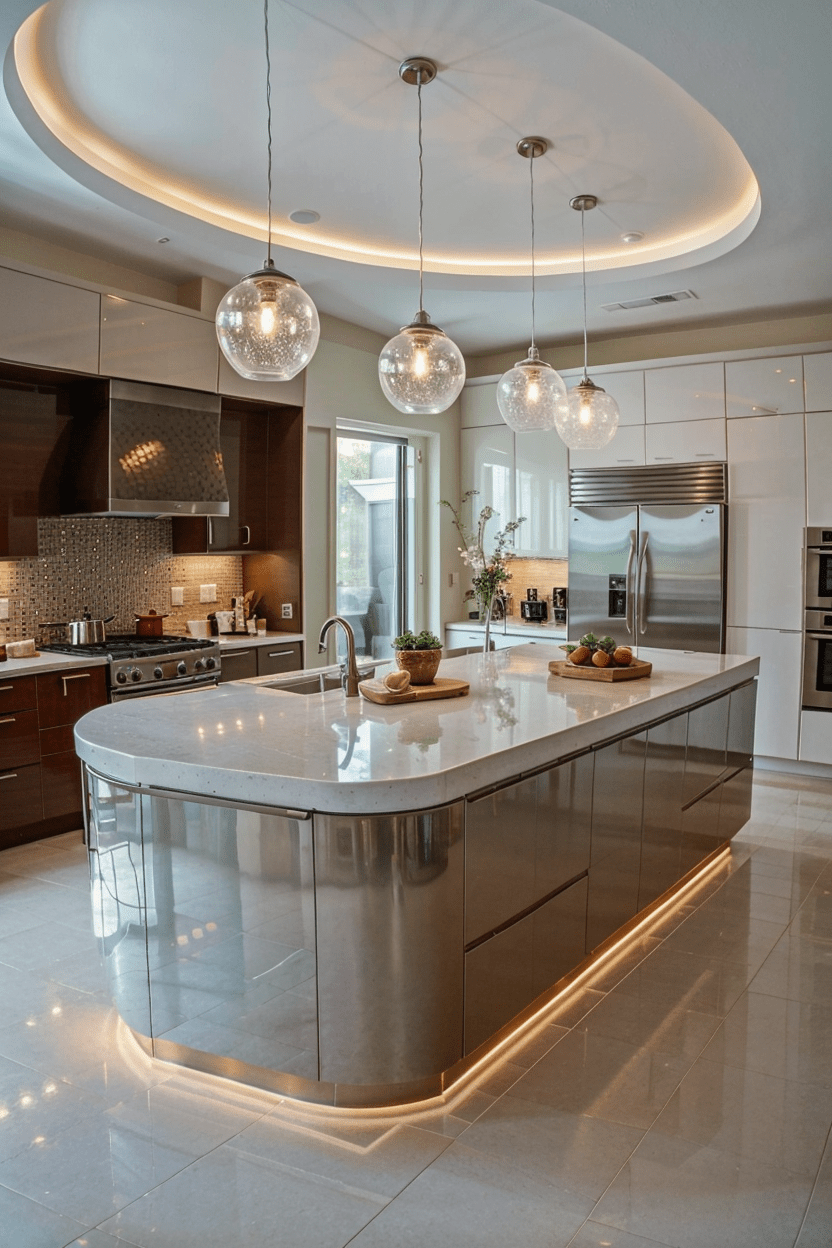
Quality: Often built with higher-quality materials and superior craftsmanship.
Features: Could be a broad spectrum of installed goods, from specialised storage, appliances and more-specific design elements.
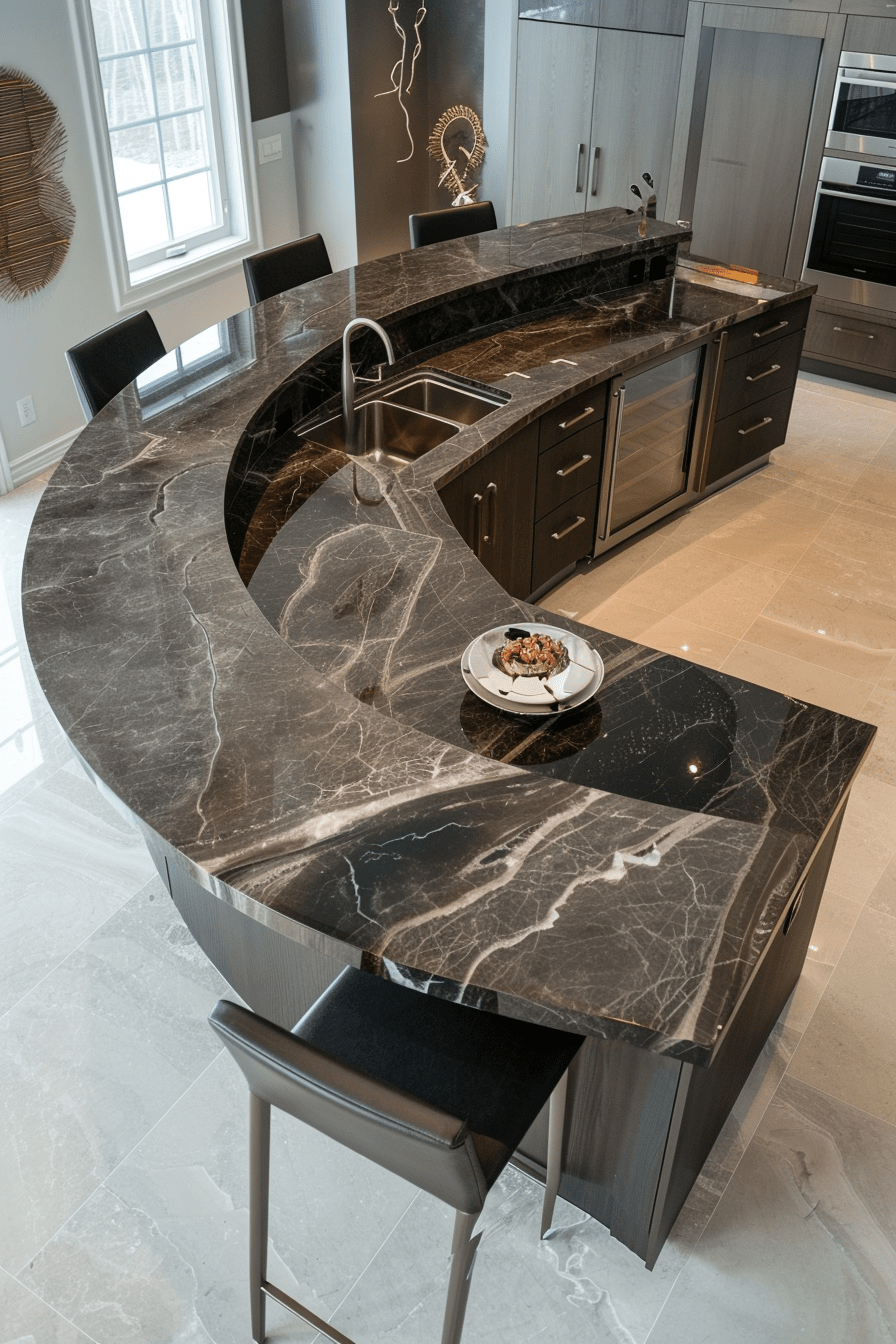
Cons:
Cost: Generally more expensive due to bespoke design and higher quality materials.
Time: The design and construction process can be time-consuming.
Single-Level vs. Multi-Level
Single-Level Kitchen Islands
In single-level islands, the height of the countertop is the same across the whole surface, providing a continuous and more expansive work surface.
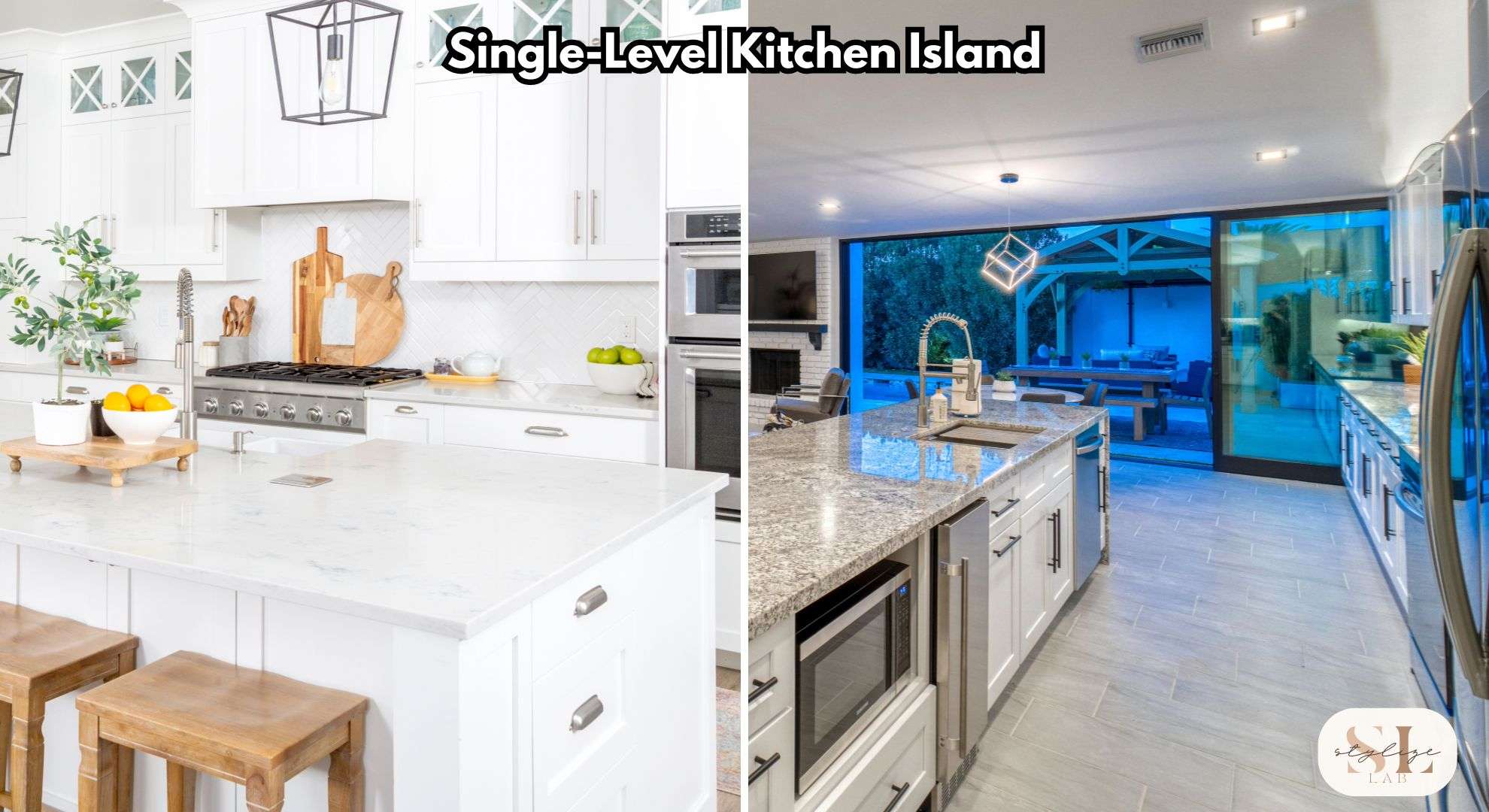
Pros:
Large Workspace: Provides a broad, uninterrupted surface ideal for food preparation, dining, and other activities.
Uniformity: Simple and sleek design that fits well with modern or minimalist kitchens.
Accessibility: Easier to clean and maintain, with no splits or level changes.
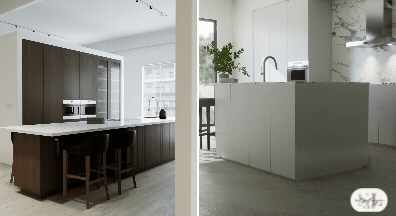
Cons:
Limited segmentation: Might not separate out functional areas, such as for prep space and serving space.
Multi-Level Kitchen Islands
Multi-level islands have countertops of varying heights, often with a higher bar area and a lower cooking or prep area.
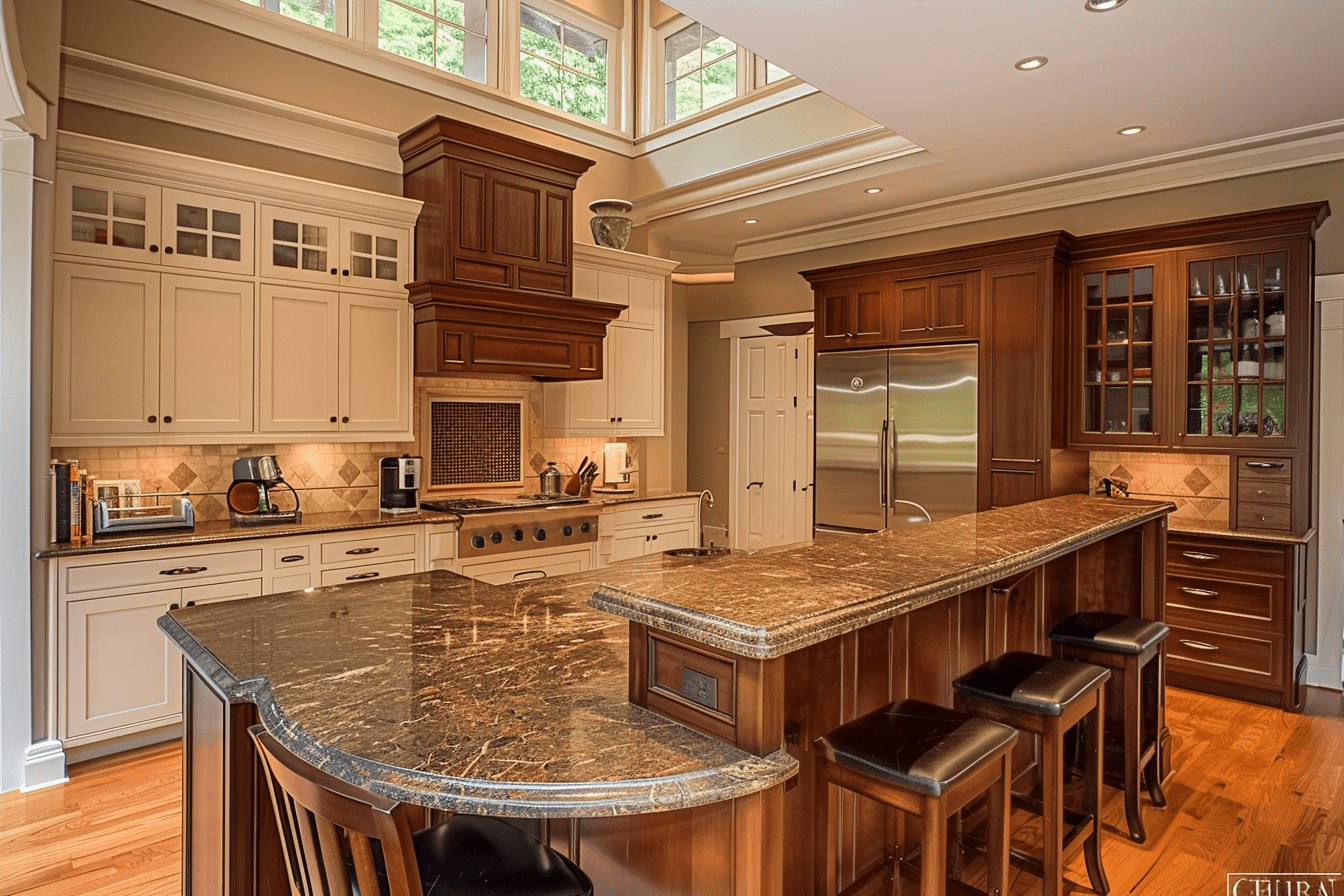
Pros:
Functionality: Different levels can be assigned specific functions, such as food prepping on a lower level and dining or socializing on a higher bar level.
Aesthetics: Adds visual interest and can complement a diverse range of kitchen designs.
Child-Friendly: Lower levels can be more accessible for children helping in the kitchen.
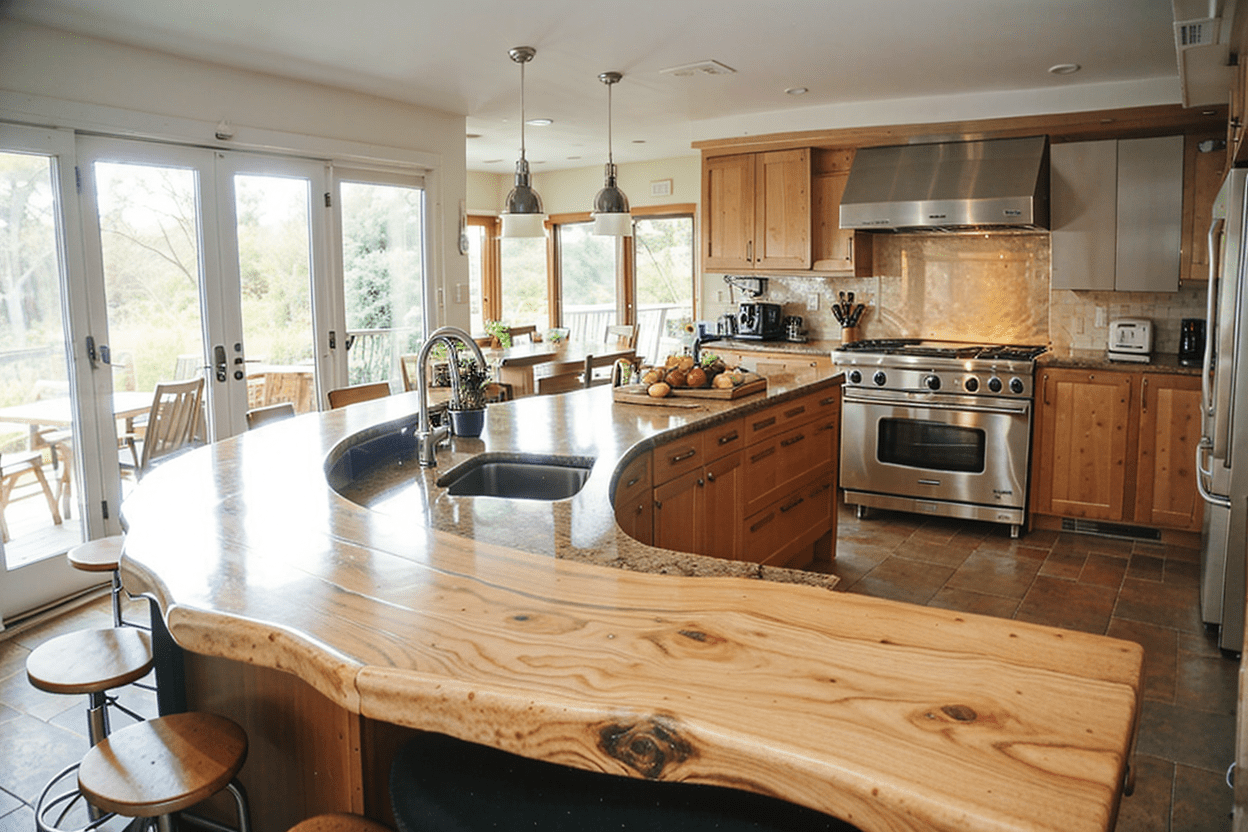
Cons:
Cleaning: More challenging to clean due to the various surfaces and levels.
Complex Integration: More planning is needed, especially to make sure workspaces are ergonomically and aesthetically integrated with the heights.
Shape and Size
Form, dimension, materials, colors and finishes are all of crucial importance in the functional and style of the island. Below we break down each of the essential aspects.
Choosing the Right Shape
Rectangular Islands
When to Choose: If you have a narrow or elongated kitchen and you’re boost your counter space, go for this one.
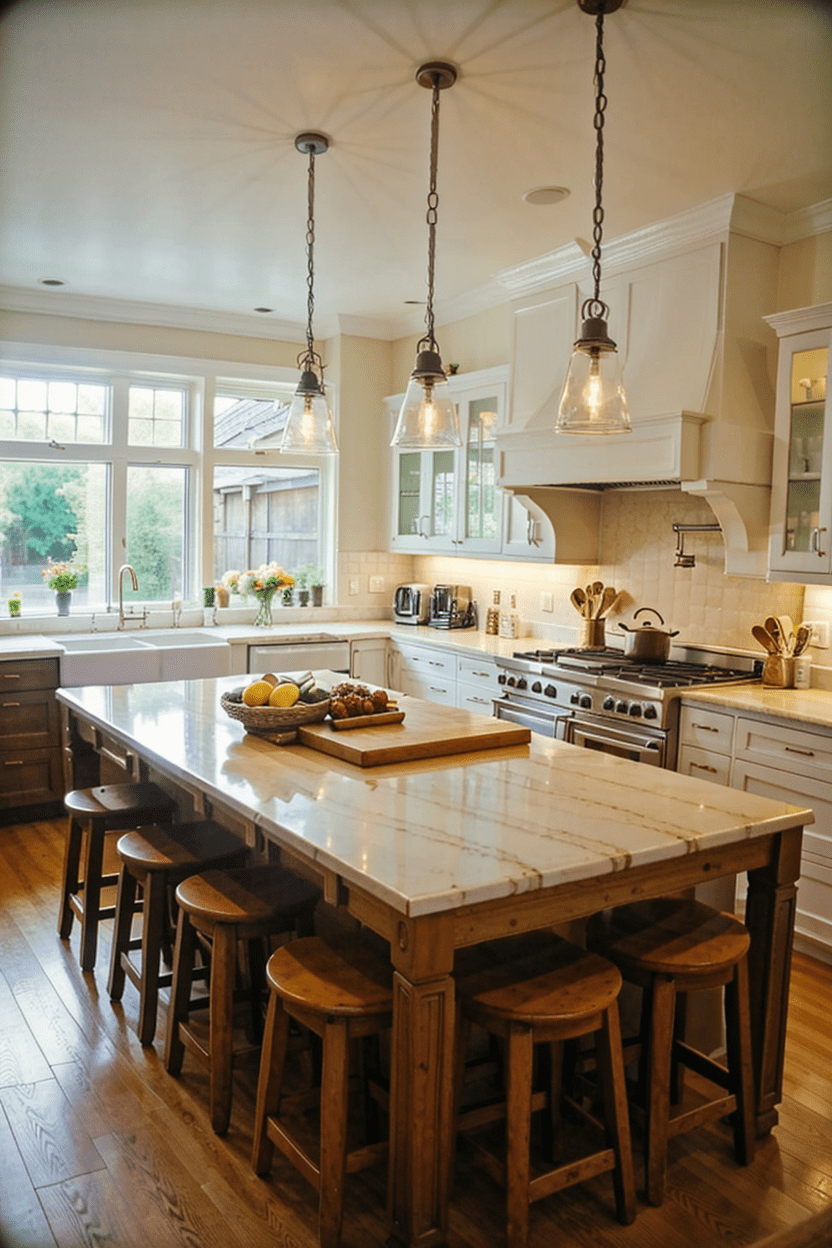
Benefits: It’s great for making the most out of your kitchen. It offers generous counter surface and lots of storage. Plus, it’s ideal if you need multiple areas for meal prep.
Considerations: Be mindful, as this shape may take up more floor space and can make a smaller kitchen feel even more cramped.
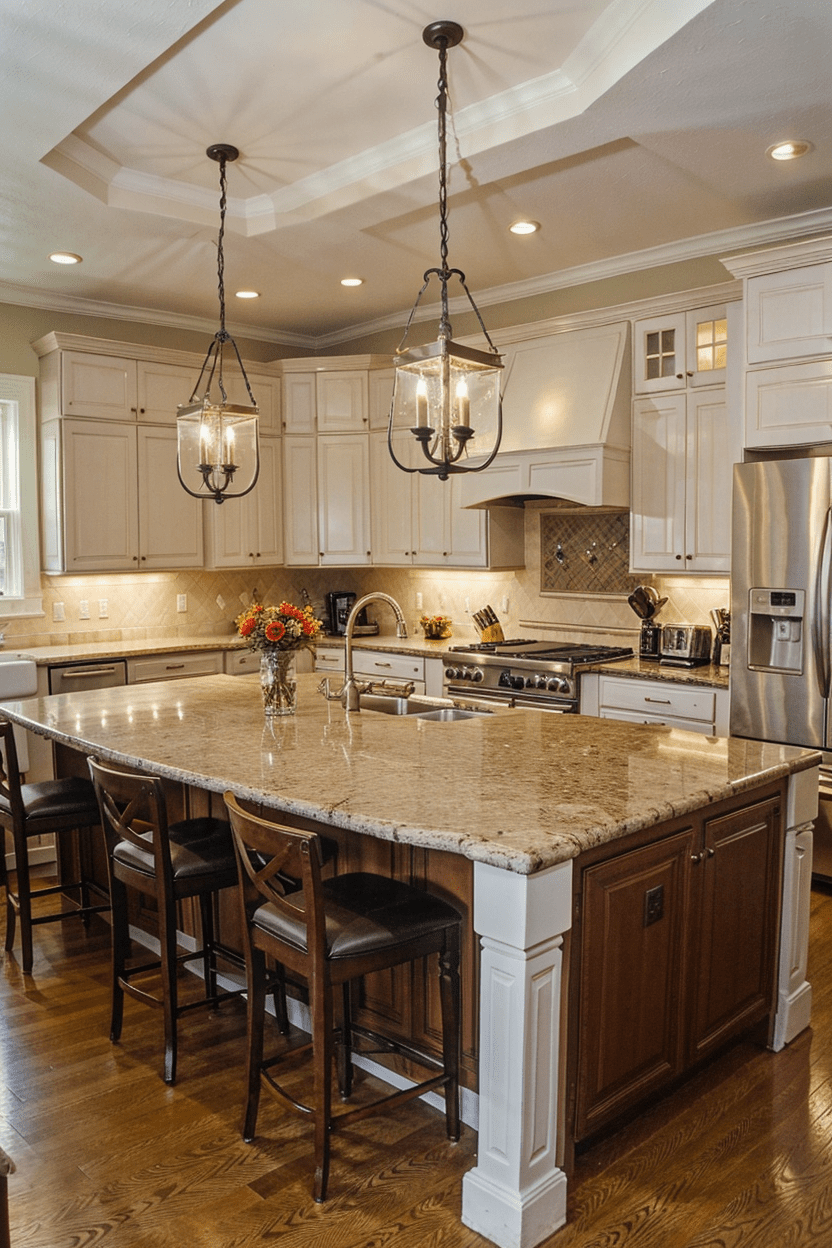
Square Islands
When to Choose: Perfect for roomy, open kitchens where seeing symmetry and balance is important.
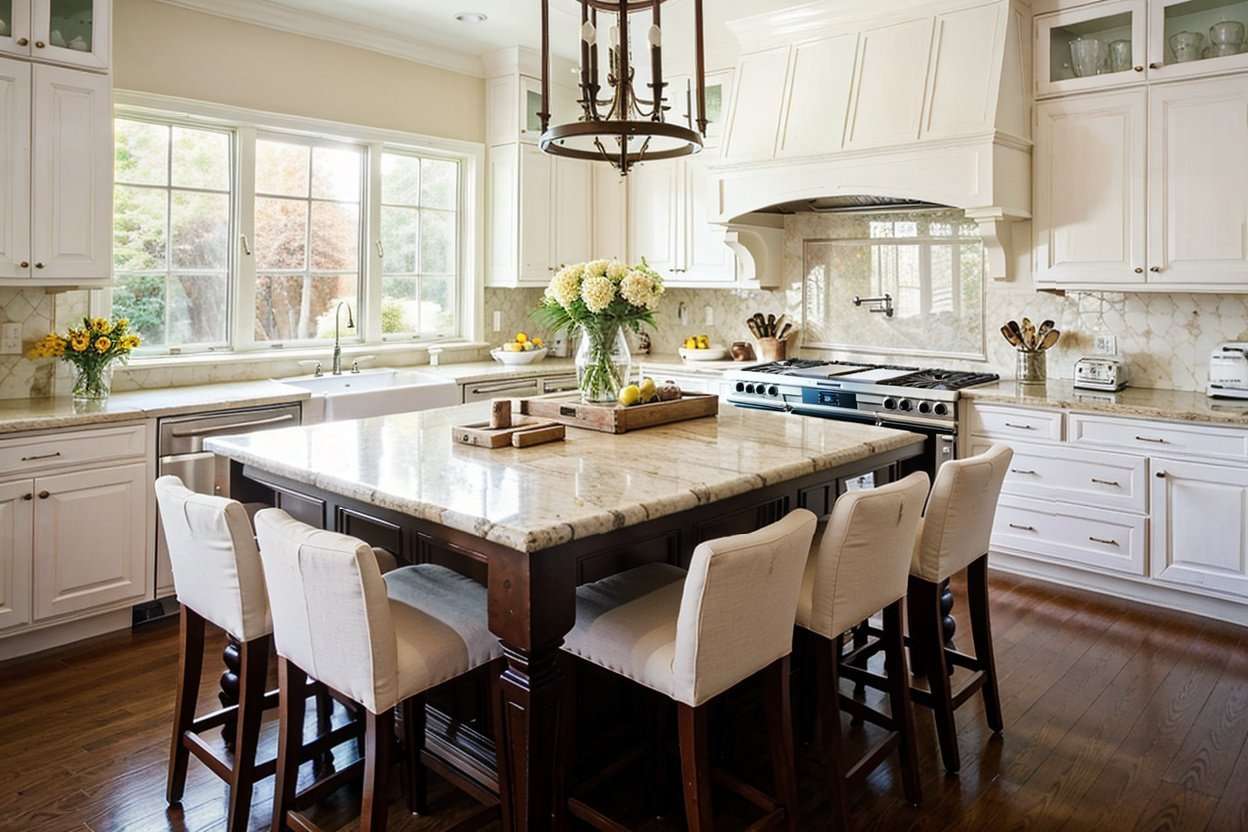
Benefits: Acts as a central hub where everyone can gather around with ease. It’s especially great for social kitchen activities.
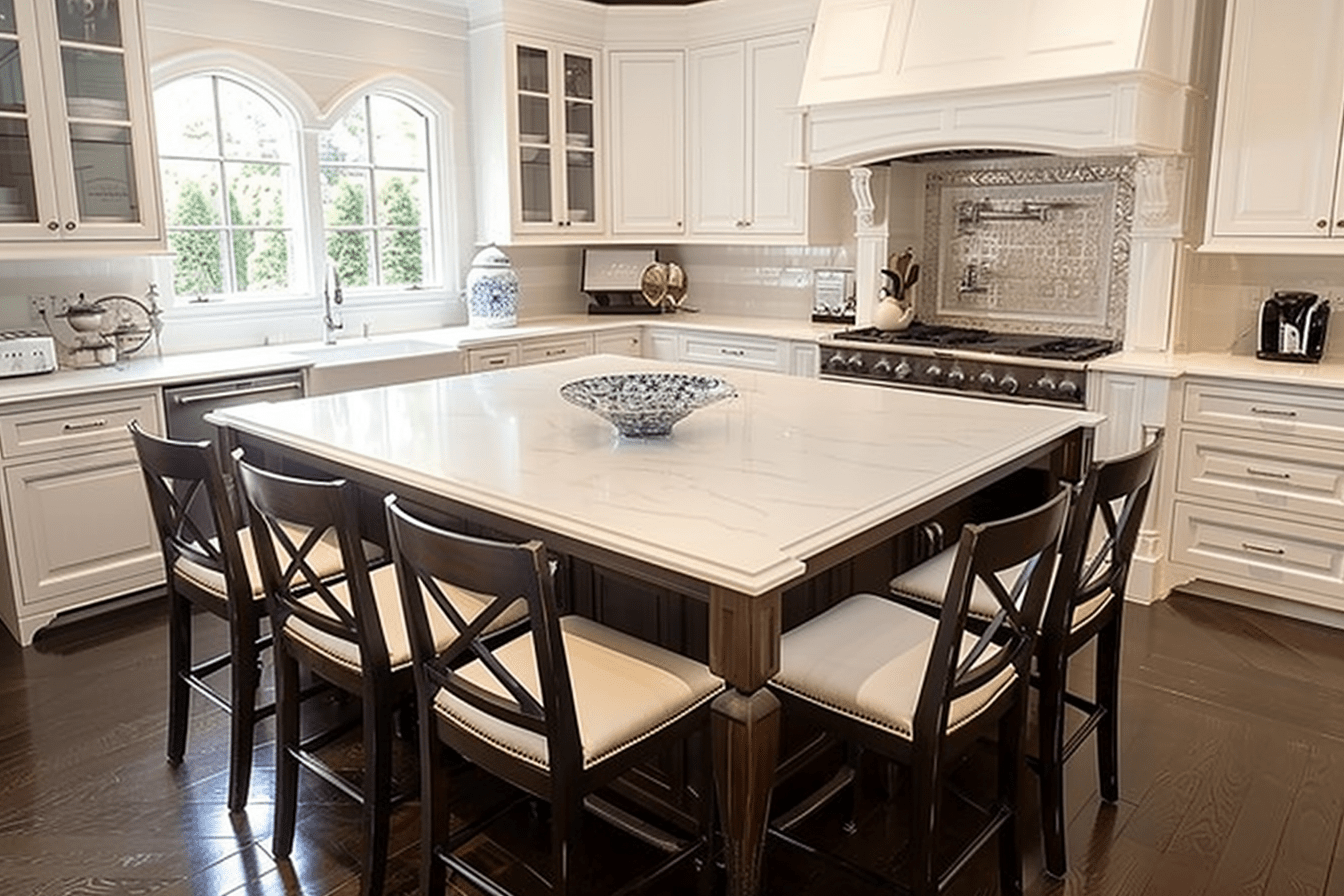
Considerations: This could overwhelm a smaller kitchen, and you’ll need meticulous planning for placing seating and maintaining a good traffic flow.
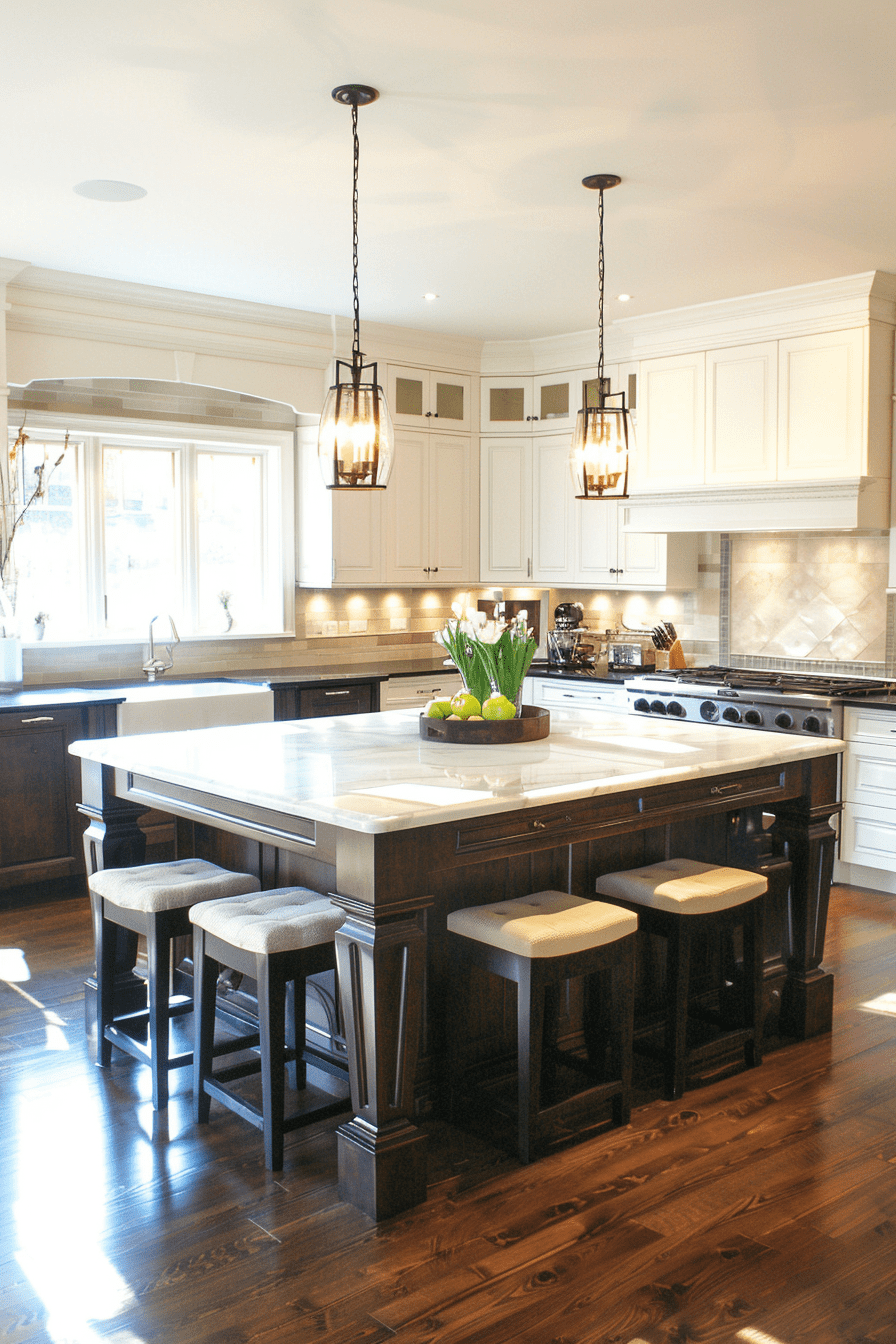
L-Shaped Islands
When to Choose: Fantastic for open-concept layouts, or uniquely arranged kitchen spaces.
Benefits: Helps to define different functionalities within a shared open-plan area, giving you zones for cooking, dining, and hanging out.
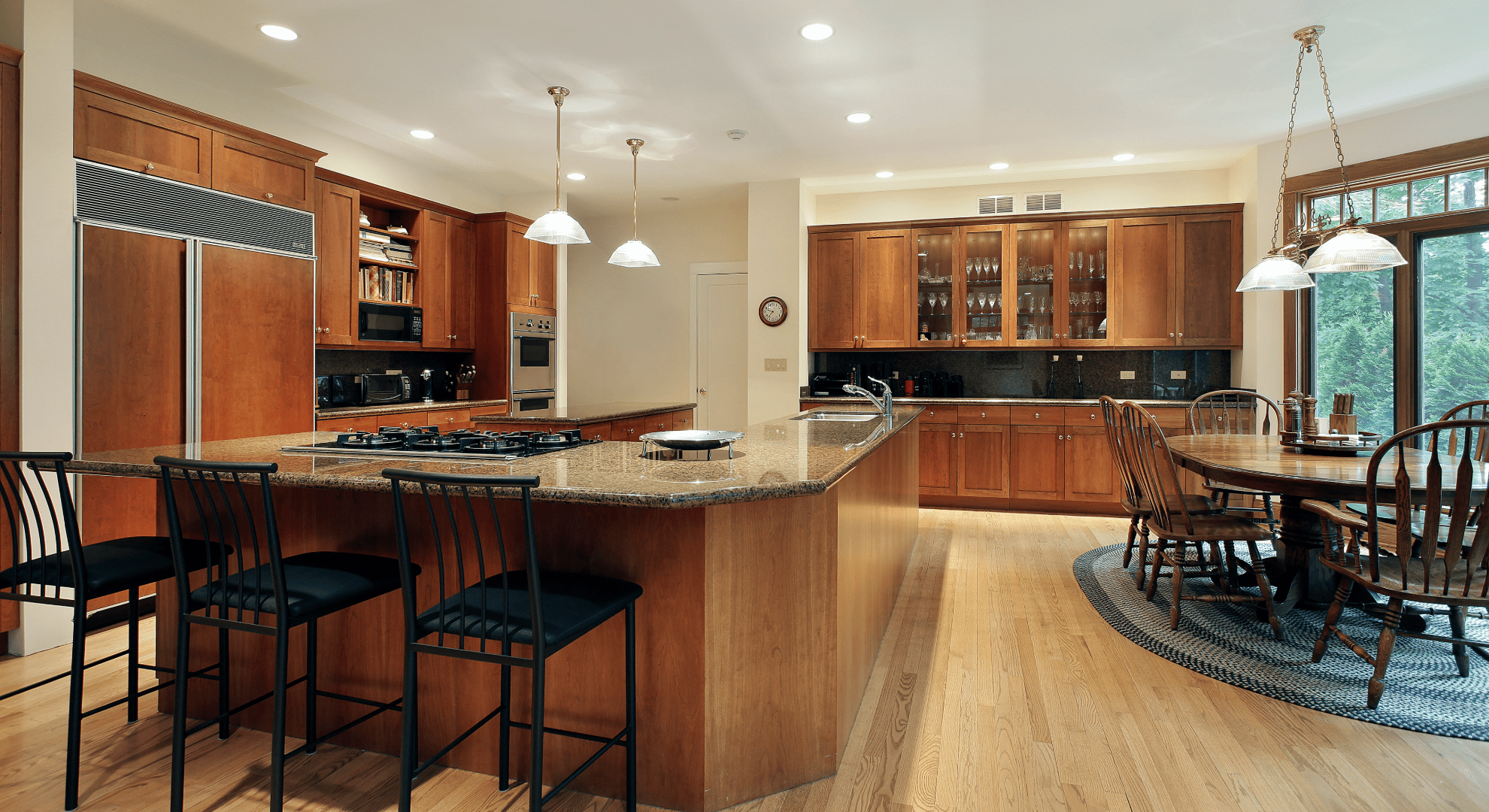
Considerations: It’s a bit trickier to plan and may leave you with fewer cabinets and drawers to work with.
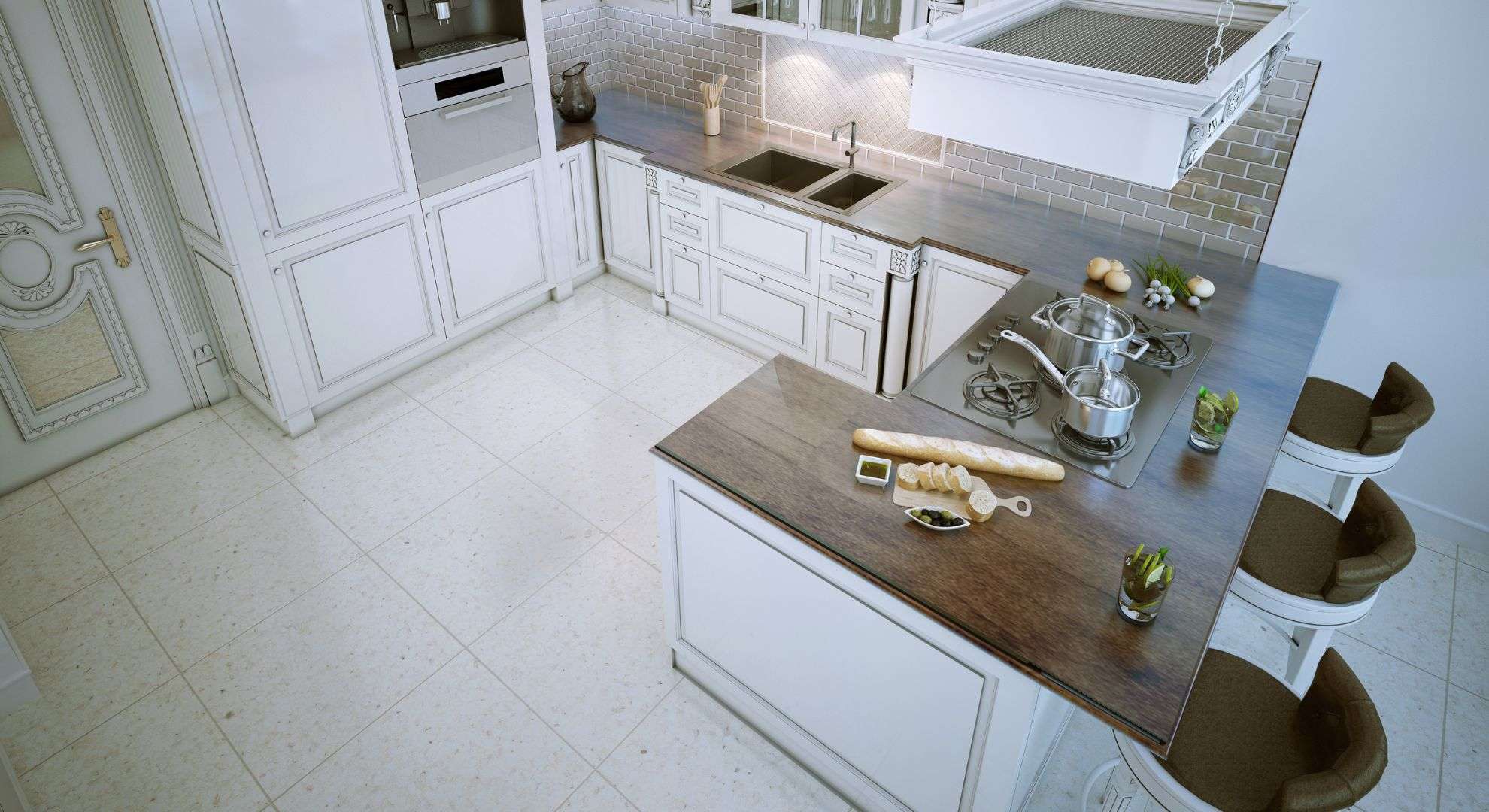
Circular and Oval Islands
When to Choose: Best if your kitchen is generously spacious and you want an island that stands out. (excellent focal point)
Benefits: Brings in those softer lines that aid smoother movement through the kitchen.
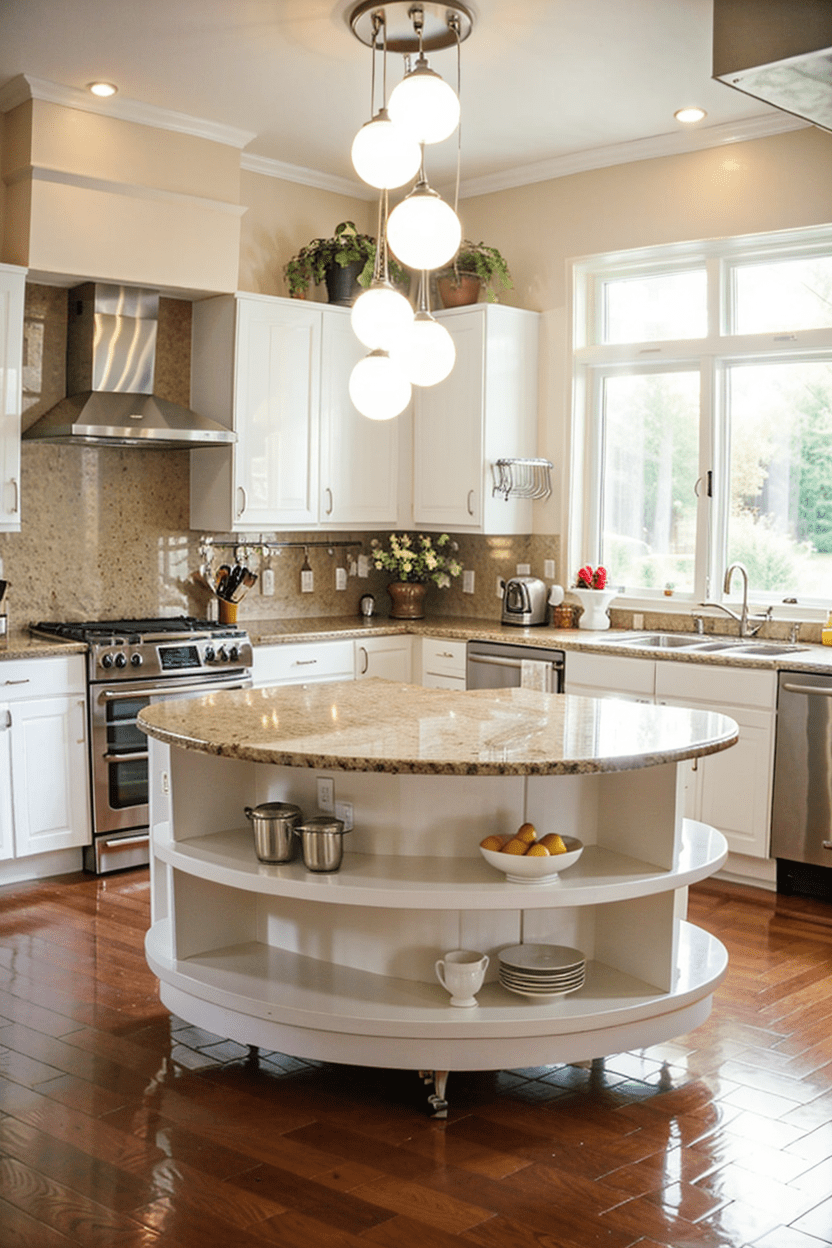
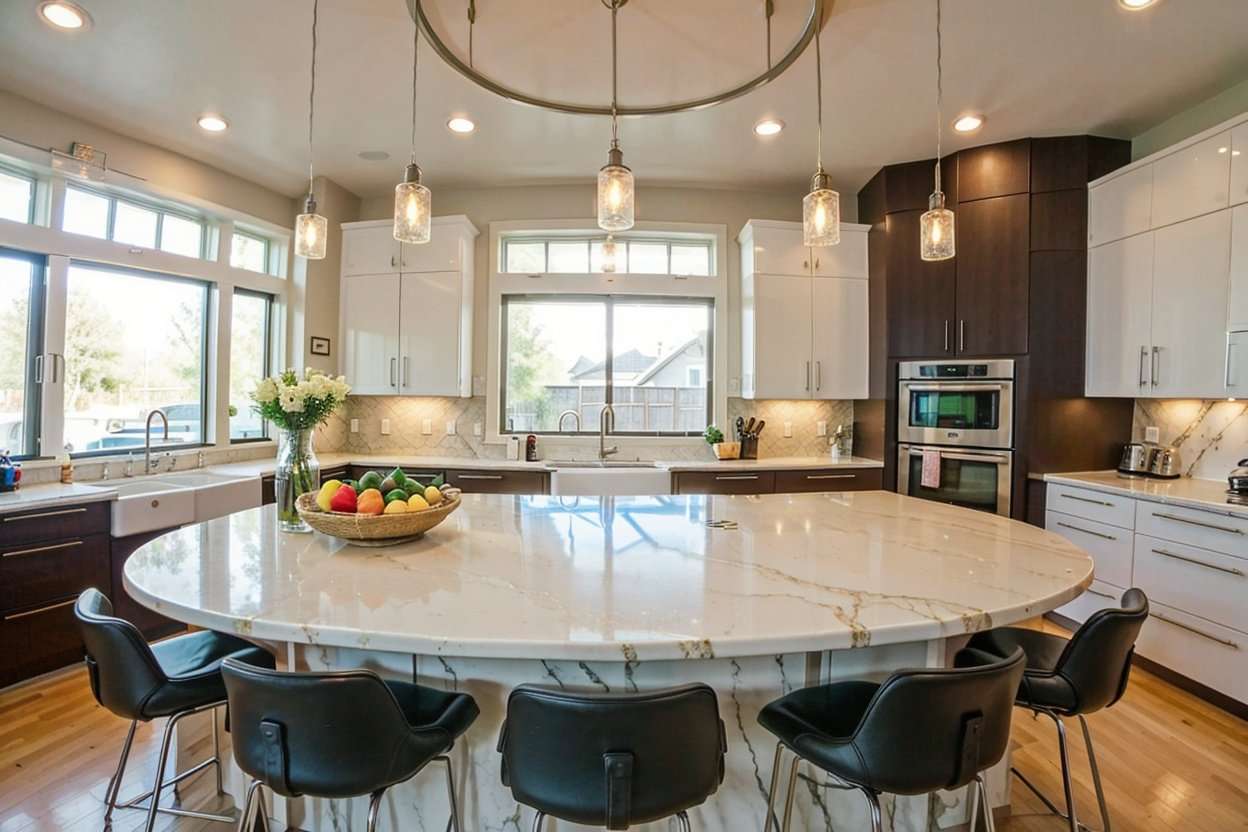
Considerations: Keep in mind, it’s not the most space-efficient and may fall short when you need ample counters for extensive kitchen work.
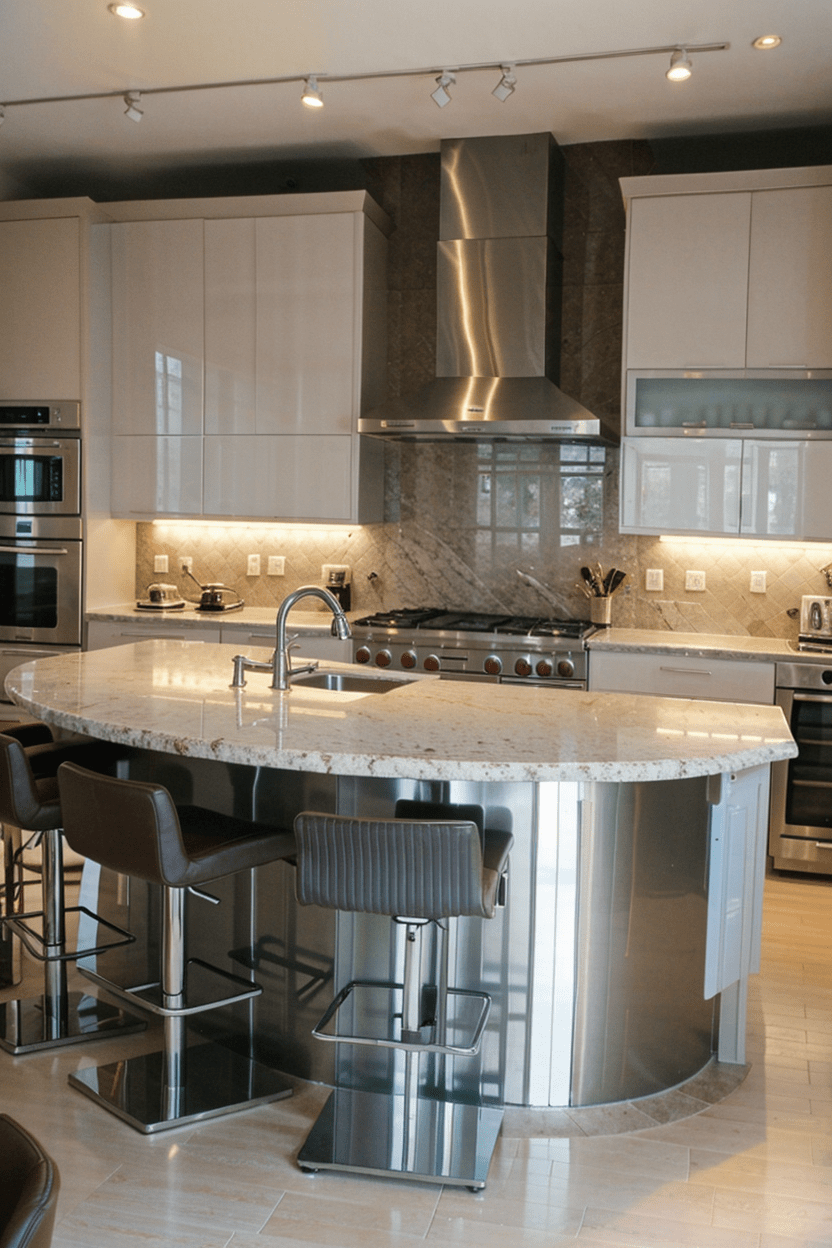
Figuring Out the Perfect Island Size:
Get the Measurements Right:
You’ll want at least 36 in to 48 inches of space around the island. This room to move around is a must for comfort and convenience.
The island should fit your kitchen size.
Compact kitchens may only need a small island, around 24 in” to 36 in” wide, while larger spaces can support a width of 48 in” or more.
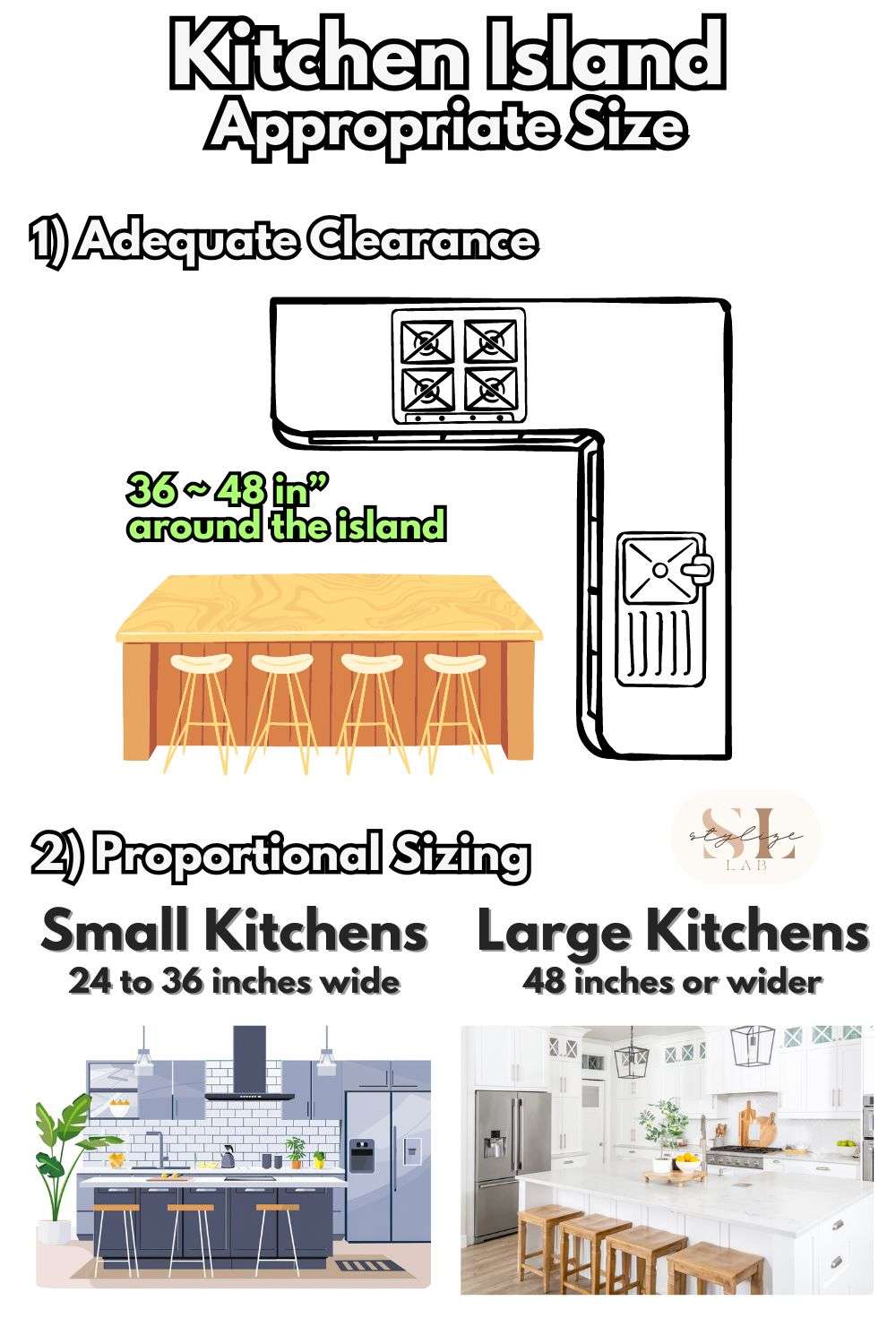
Think About What You’ll Use It For:
What do you want to use the island for? Are you adding a cooktop, sink, or some extra seating? These features affect size and design.
Think about the island’s main purpose: is it for prep work, dining, or extra storage? Your answer will help shape its size and layout.
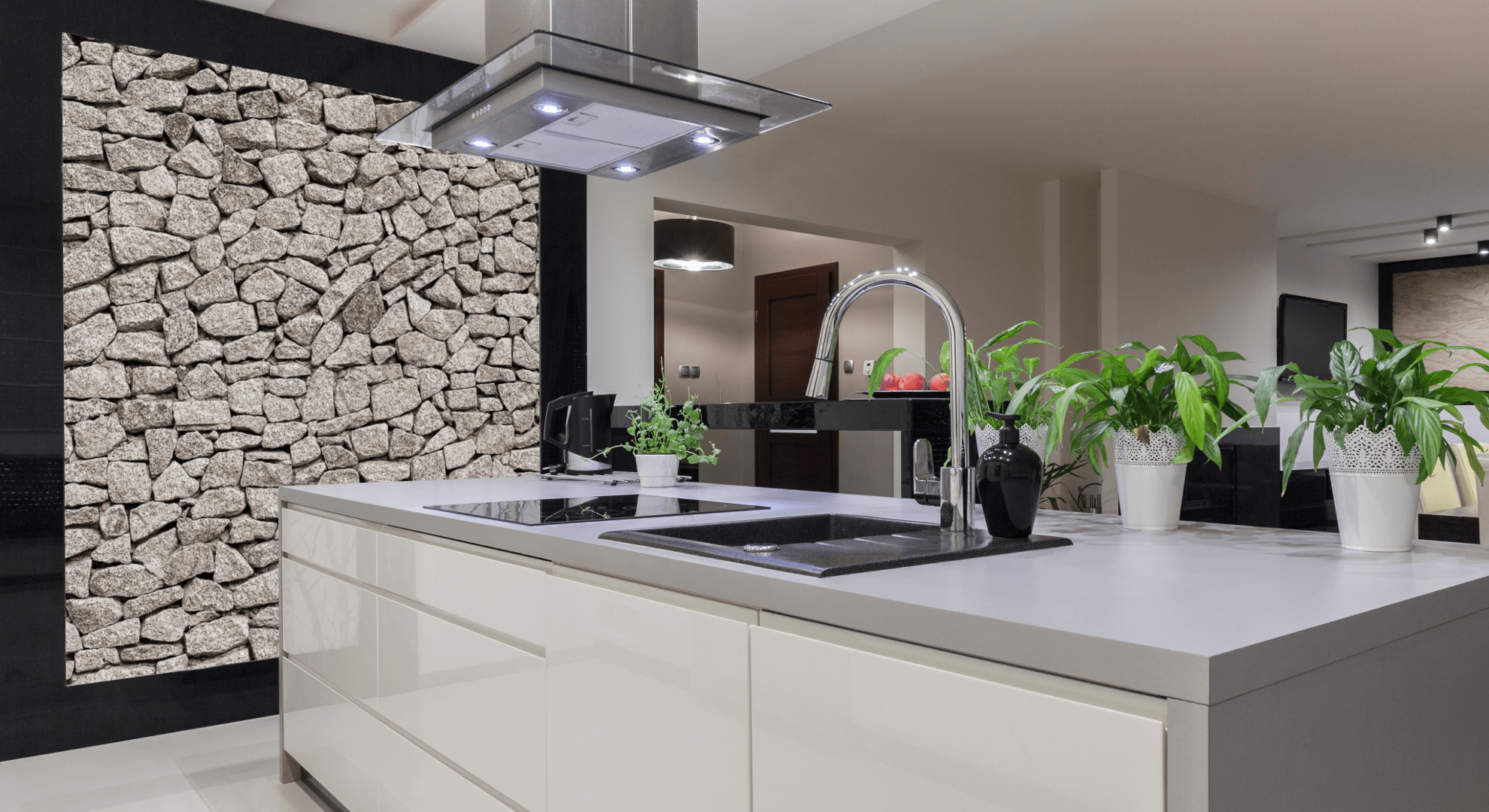
Materials
Popular Picks:
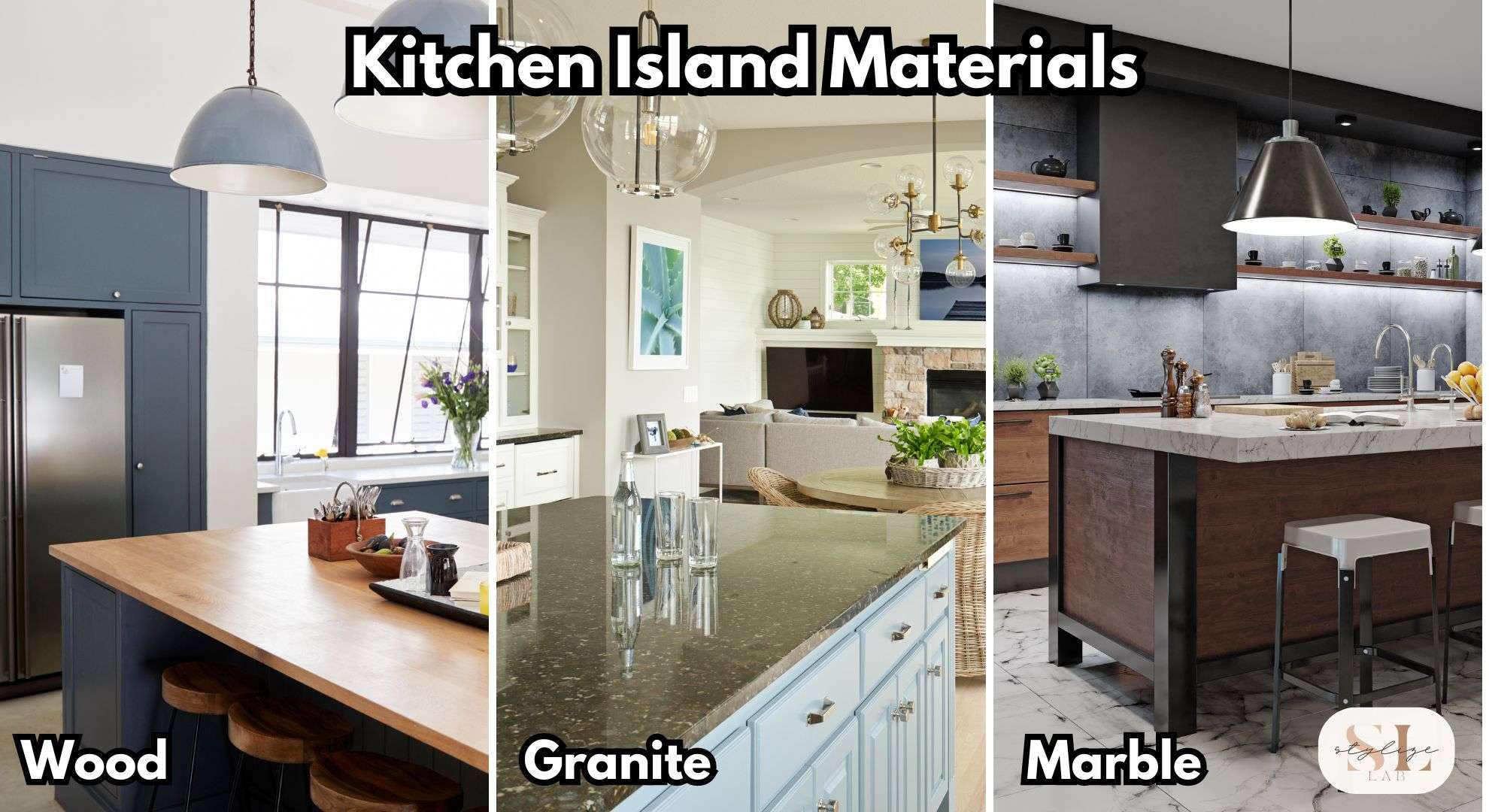
Wood:
Pros:
- Adds a welcoming warmth and available in numerous finishes.
- Perfect for rustic or farmhouse styles.
- Easily customized.
Cons:
- Requires regular upkeep.
- Prone to scratches and water damage.
Granite:
Pros:
- Extremely durable and heat-resistant.
- Comes in a wide range of colors and patterns.
- Infuses a touch of luxury into your kitchen.
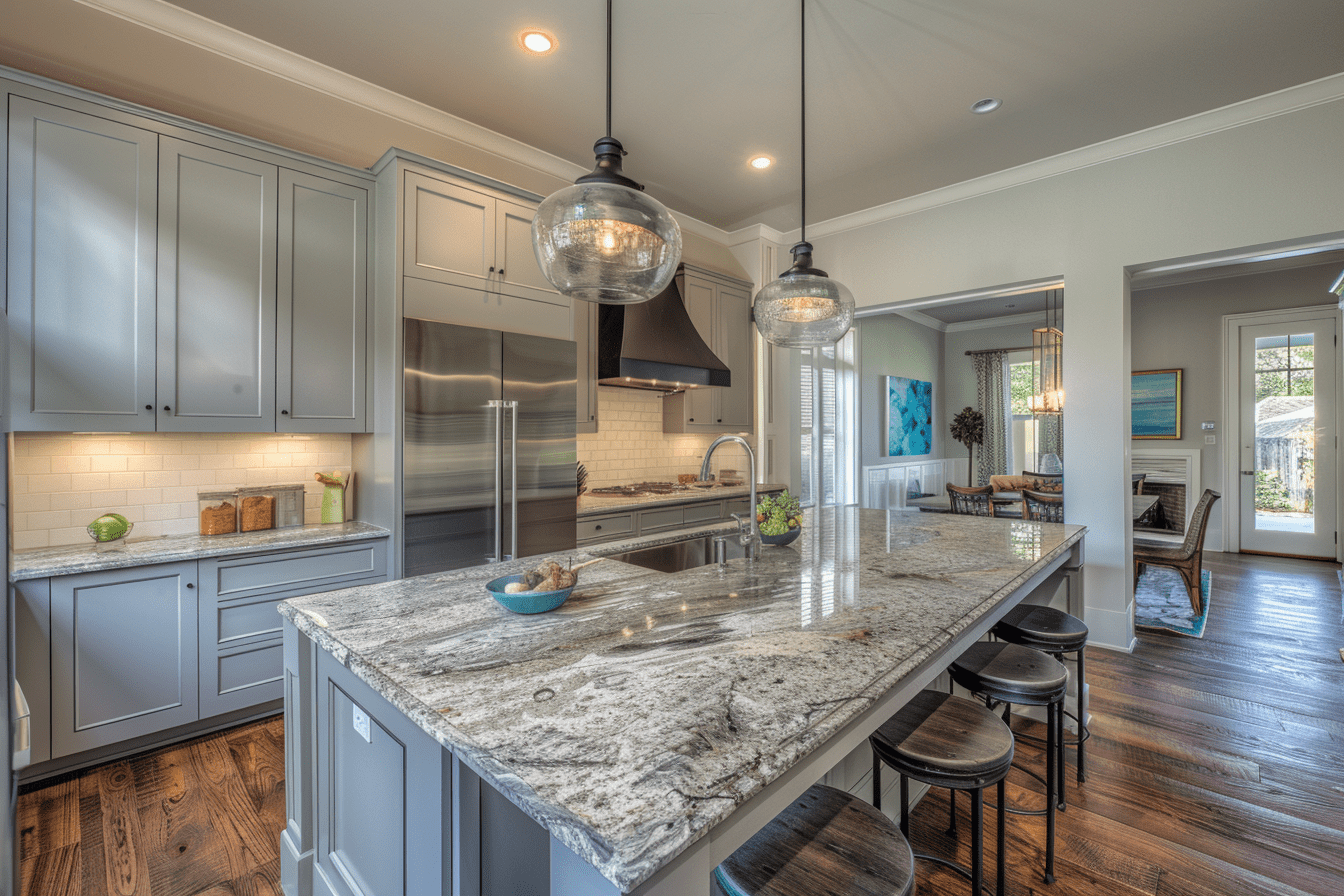
Cons:
- On the pricier side.
- Needs sealing to prevent stains.
- Can chip or crack if hit too hard.
Marble:
Pros:
- Timeless elegance, great for upscale kitchens.
- Cool surface is ideal for baking.
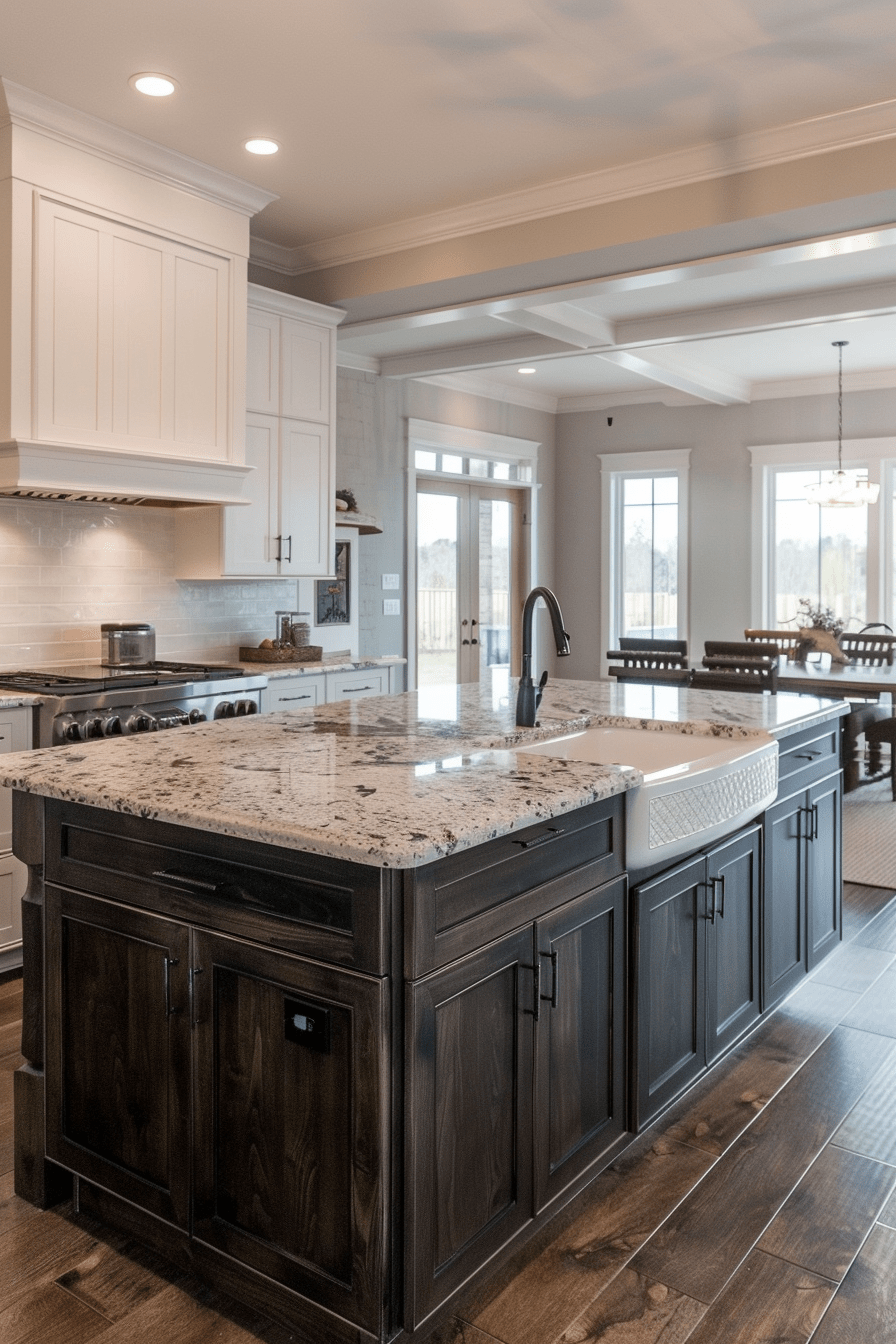
Cons:
- Easily etched and stained.
- Requires diligent maintenance.
- Can be costly.
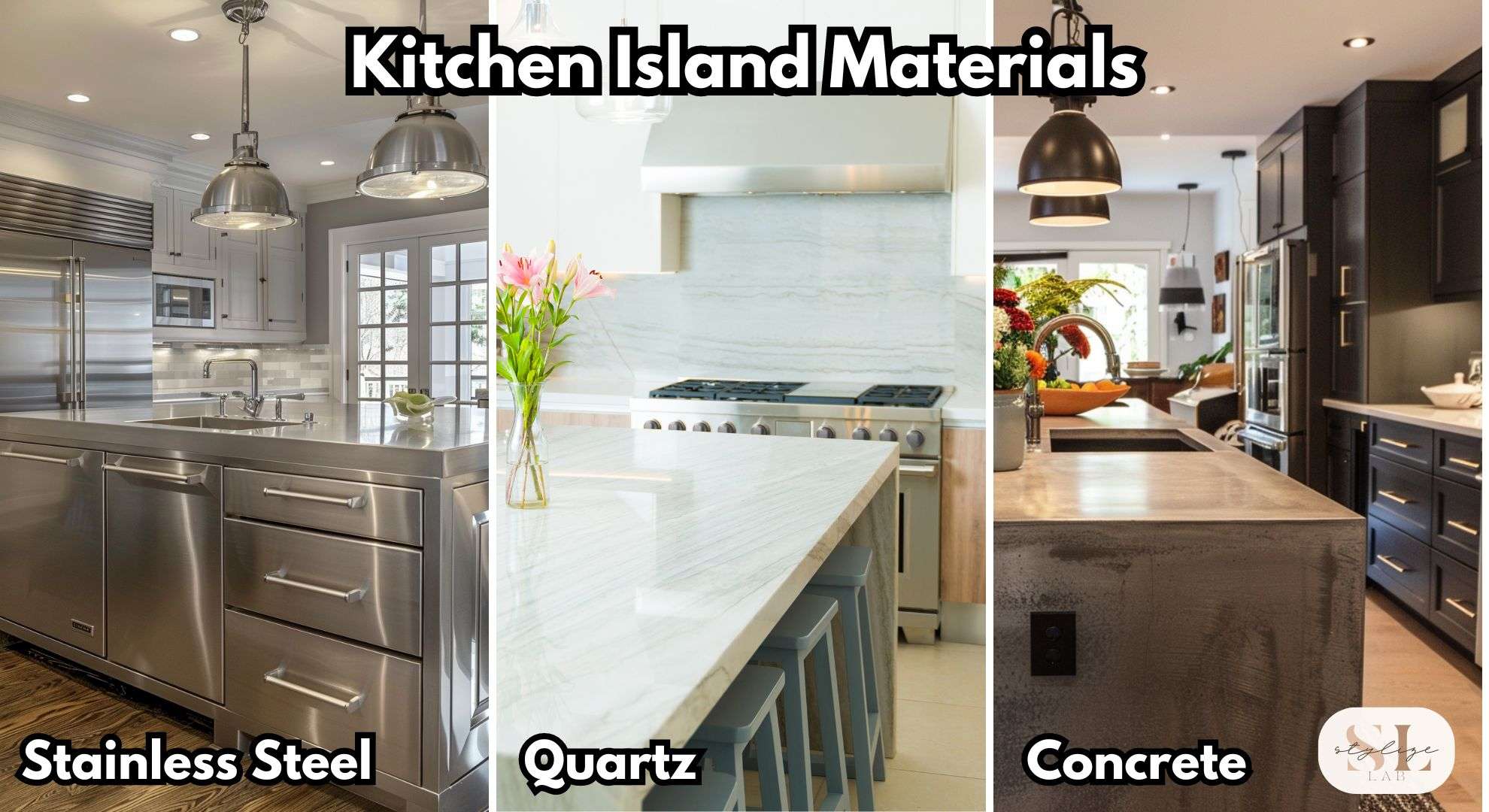
Stainless Steel:
Pros:
- Exceptionally durable, resisting heat and stains.
- Sleek, modern aesthetic that fits industrial designs.
- Simple to clean.
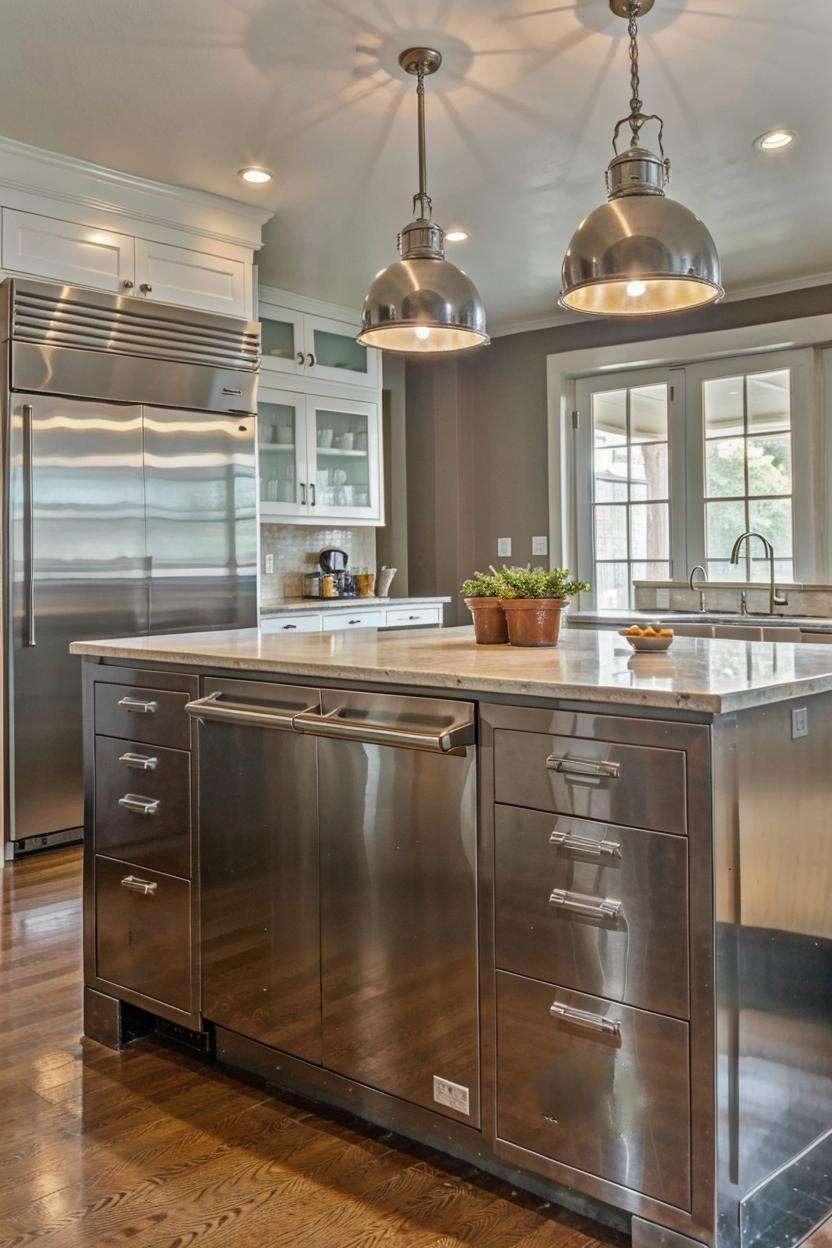
Cons:
- Shows fingerprints and scratches easily.
- May feel cold and clinical. (reminds me a bit of a hospital or industrial kitchen, I don’t know, I can’t like it 🤔)
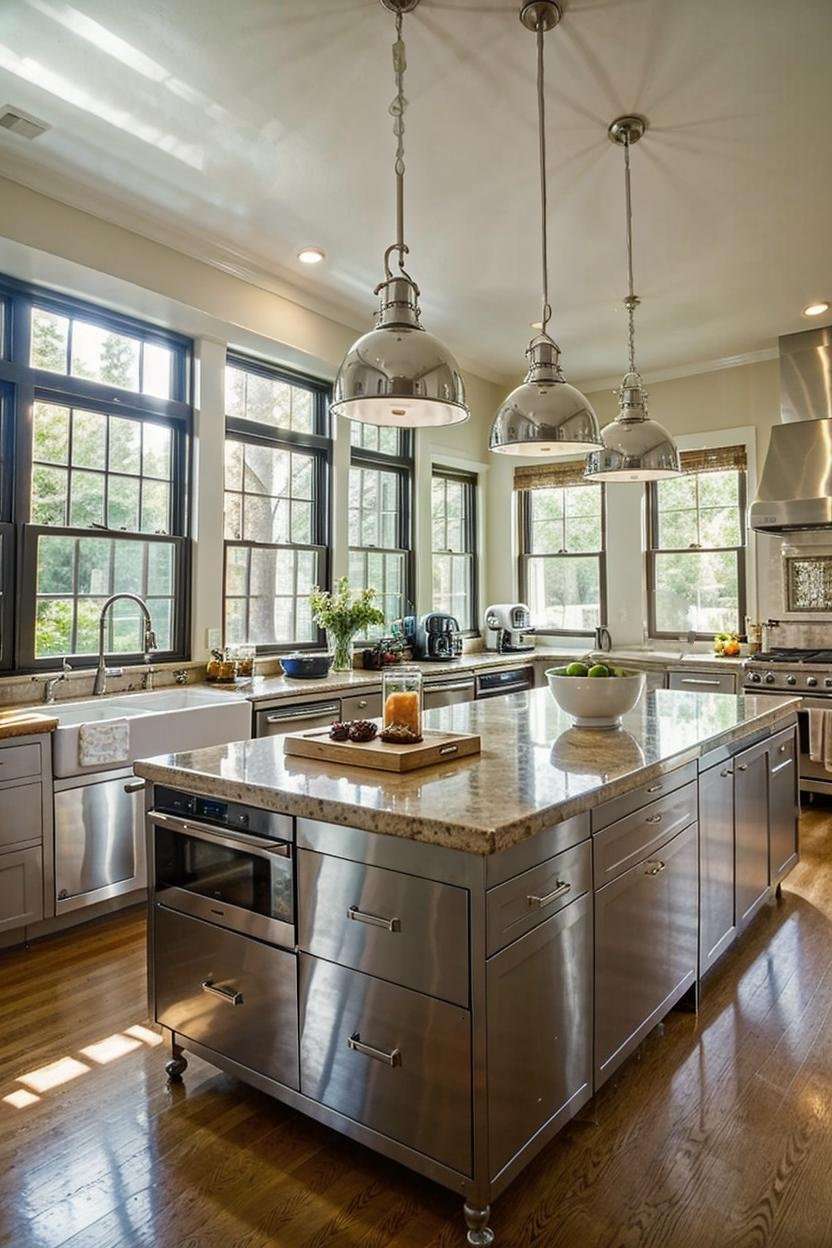
Quartz:
Pros:
- Engineered for consistent color and pattern.
- Super durable and non-porous.
- Very low-maintenance.
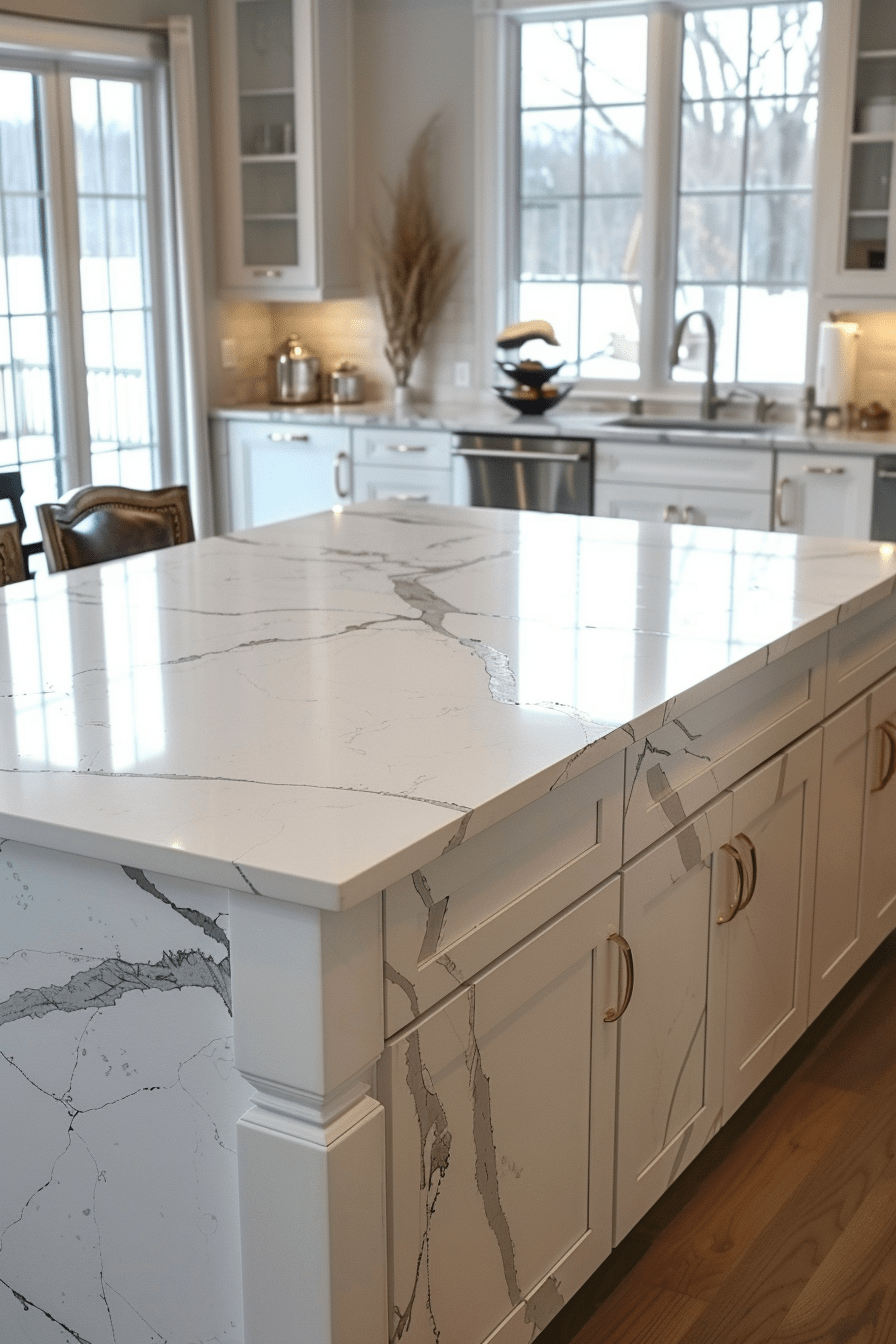
Cons:
- Can be on the expensive side.
- Not impossible but still somewhat vulnerable to heat.
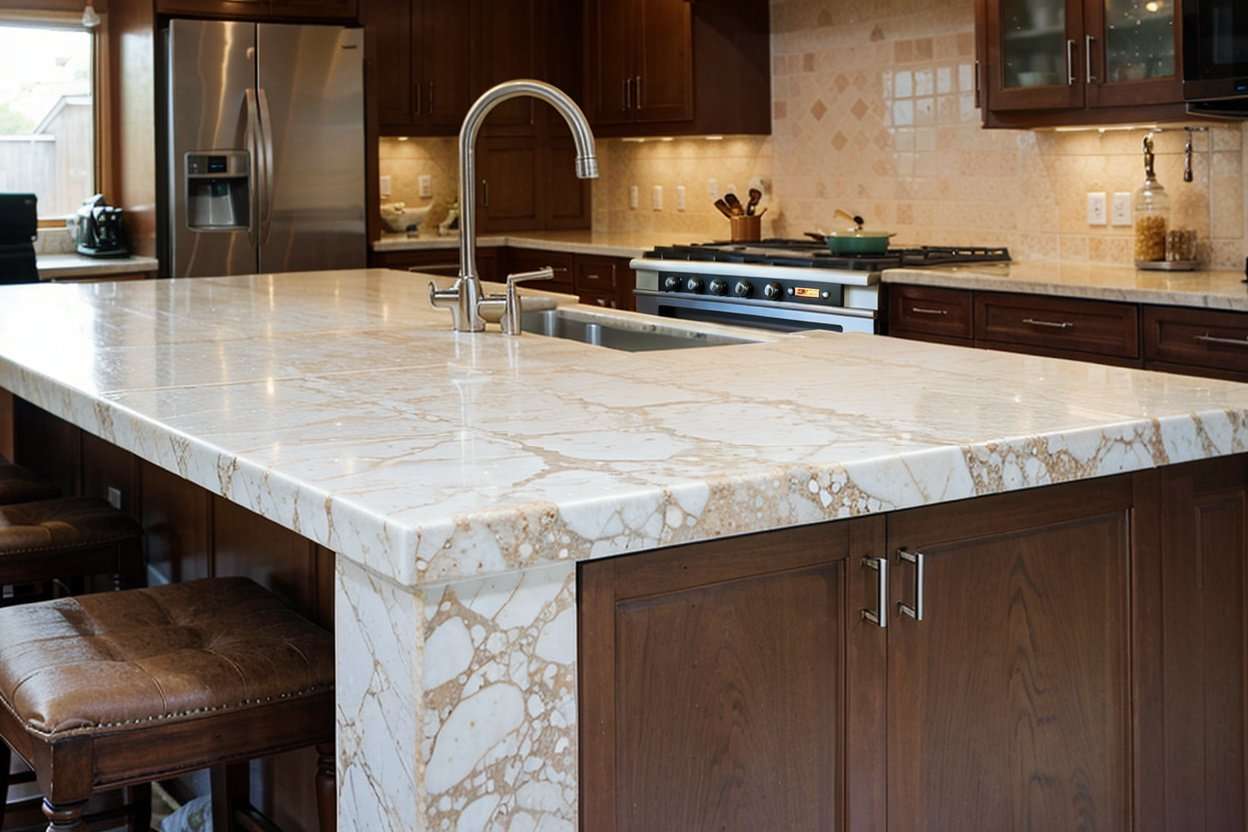
Concrete:
Pros:
- Highly customizable in both shape and color.
- Extremely durable with the potential to be sealed against stains.
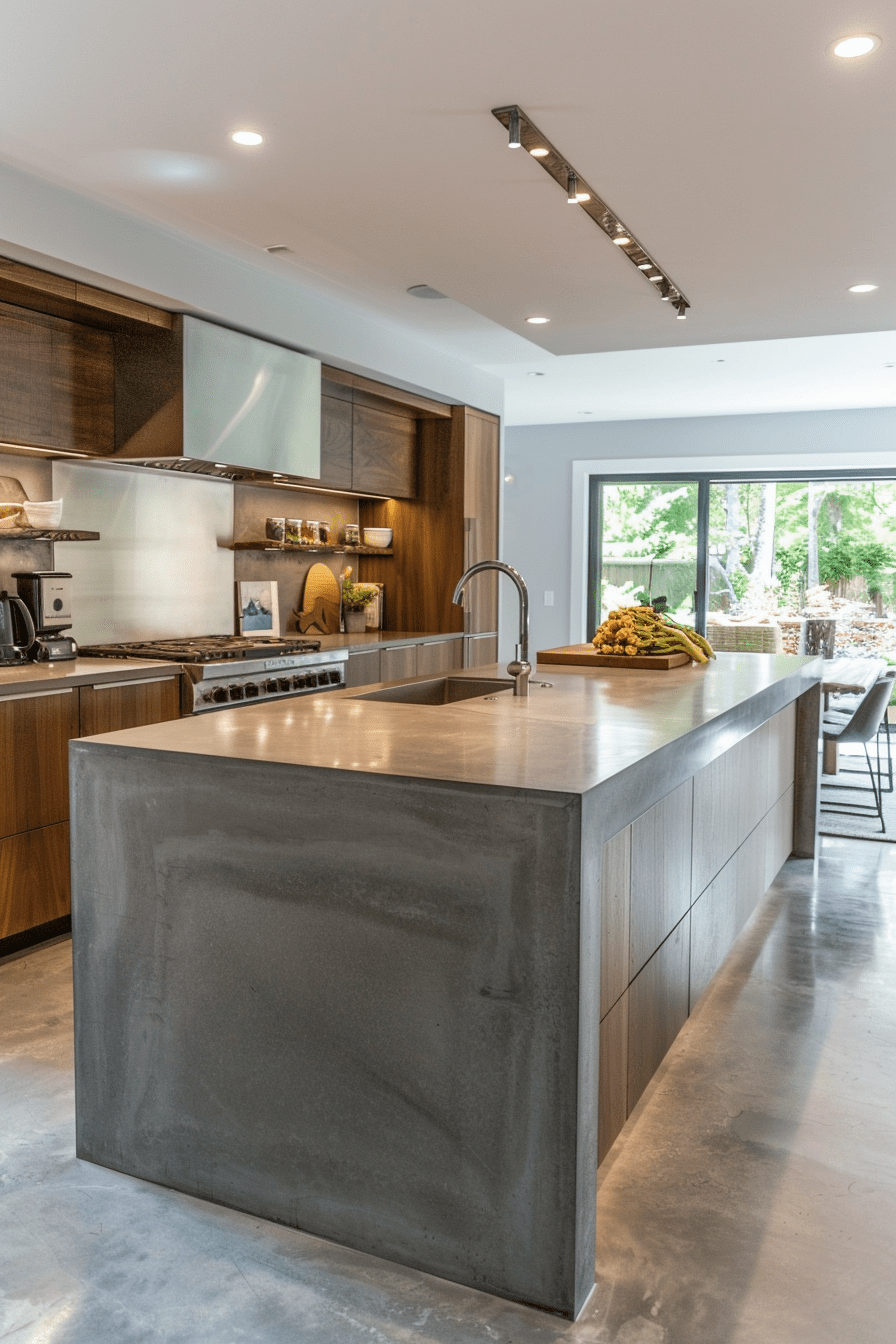
Cons:
- Heavy, often requiring reinforcement.
- Can chip or crack over time and may need occasional resealing.
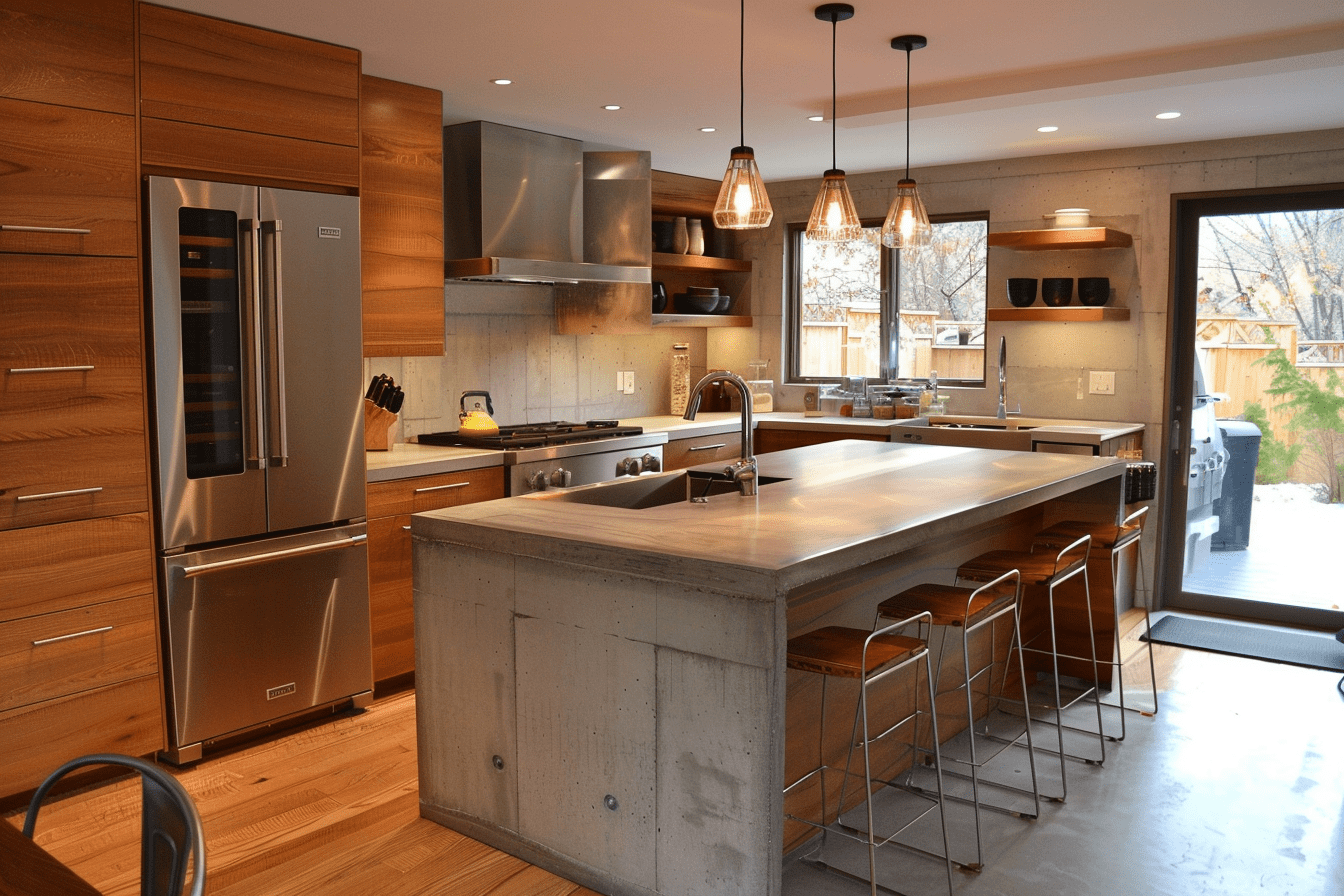
Colors and Finishes – Selecting Colors
Harmony with Kitchen Design:
Aim to sync the island color with your kitchen’s overall palette. It ties the space together if you choose colors that match or complement your cabinetry or countertops.
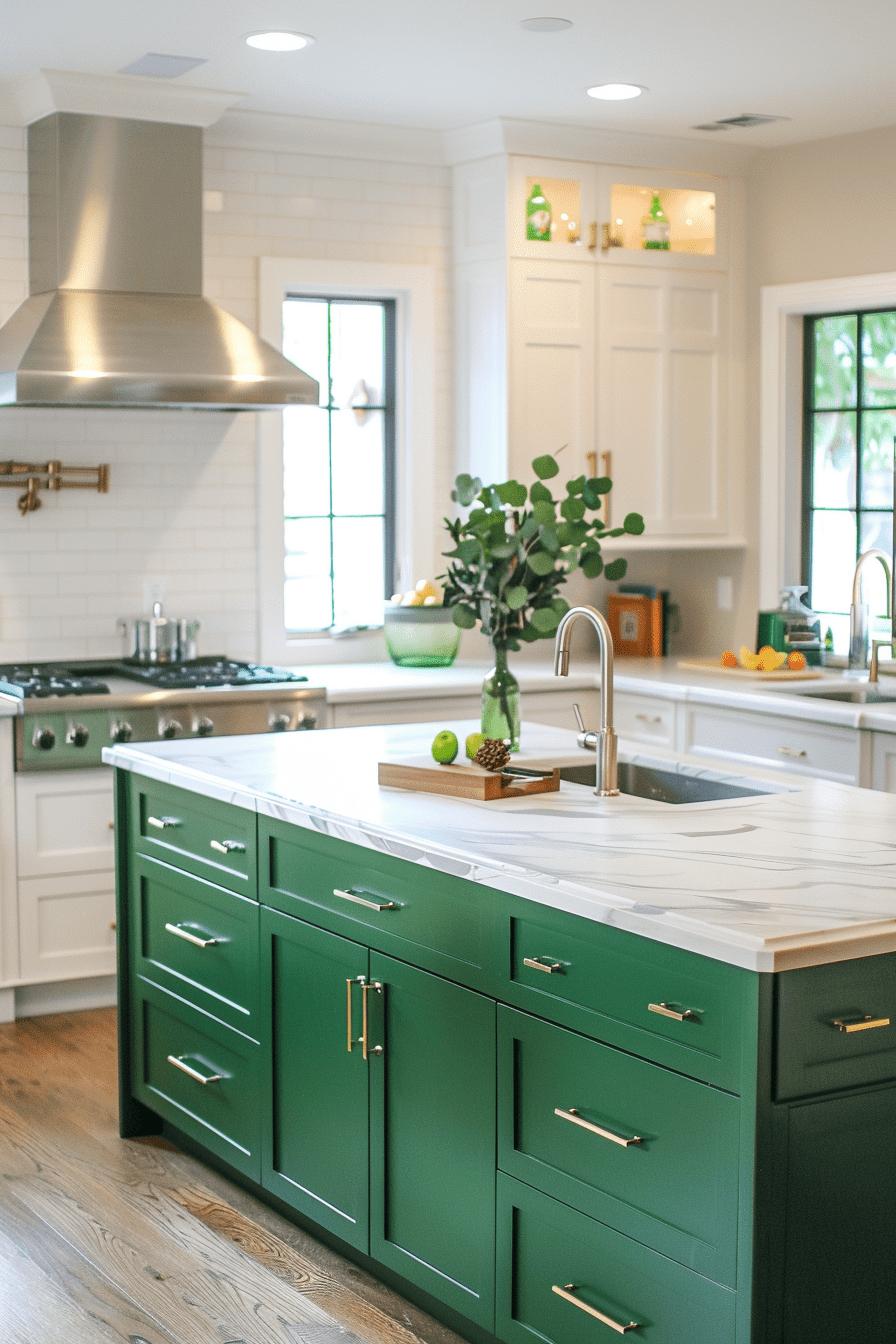
To make the island stand out, go for contrasting shades.
A dark-colored island can anchor a lighter kitchen and vice versa.
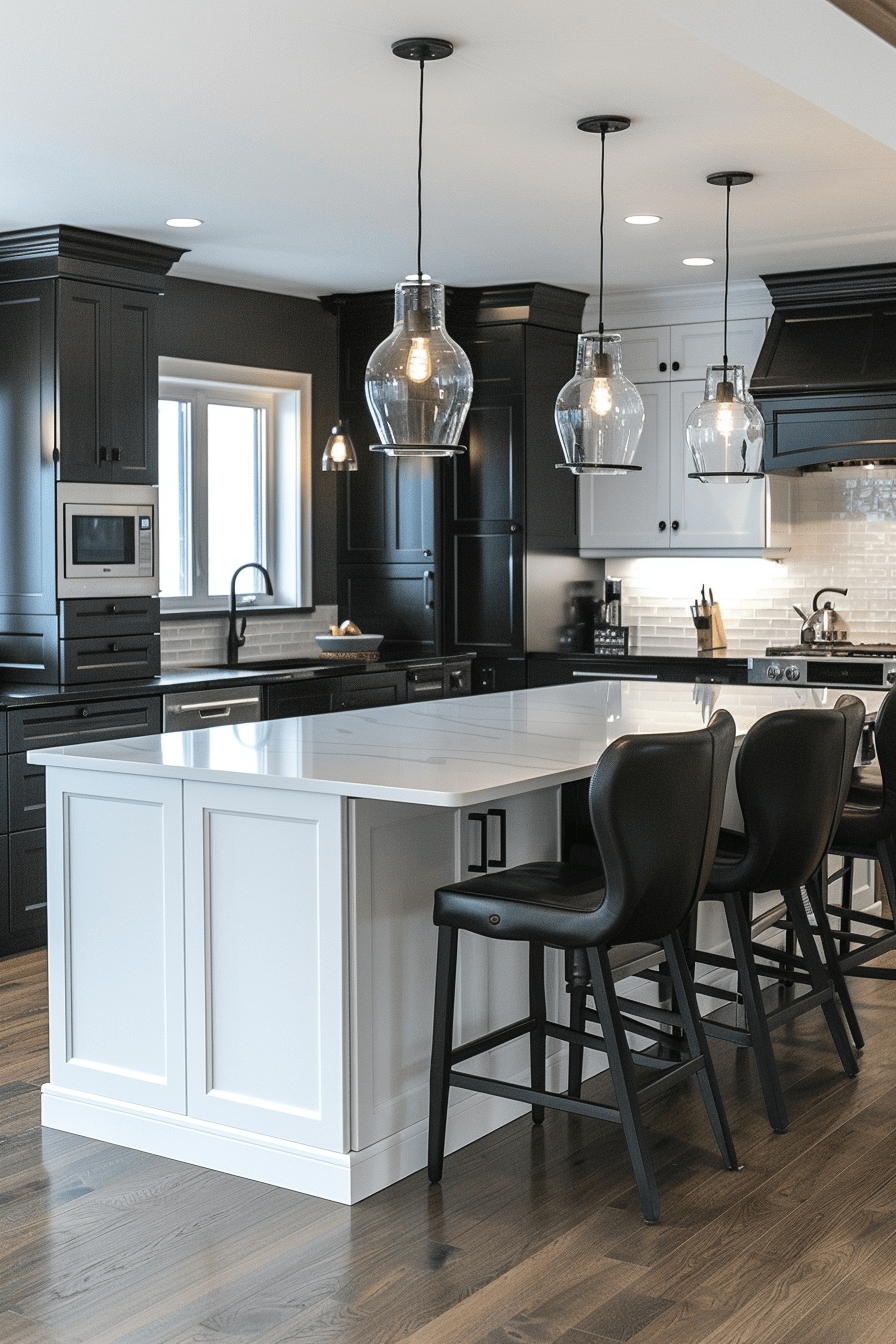
Popular Choices:
White and Off-White: Timeless and adaptable, these hues make your kitchen feel more spacious and light-filled.
Gray: Neutral and elegant, perfect for both modern and classic kitchen designs.
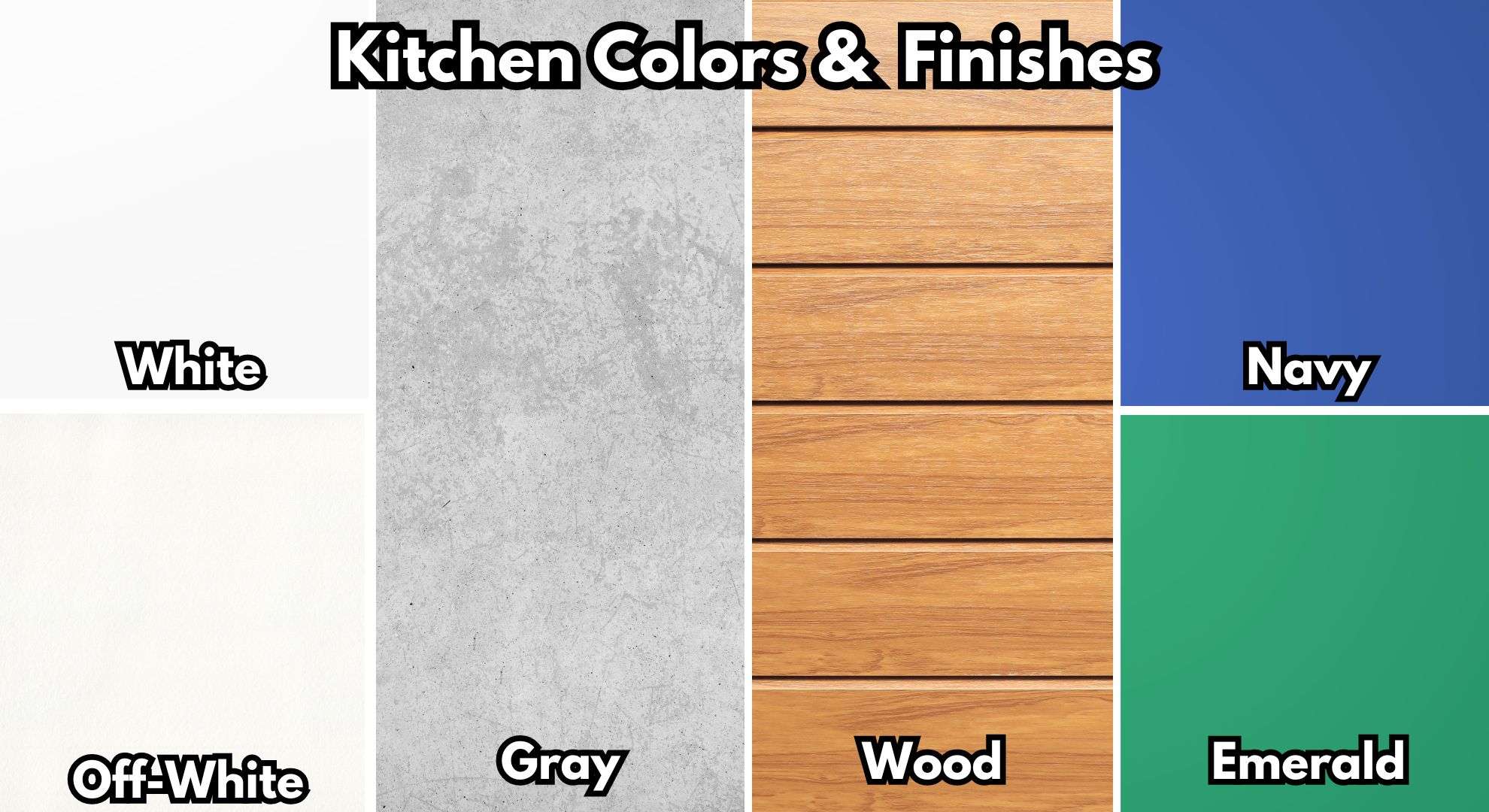
Natural Wood Tones: Brings in warmth and texture, excellent for rustic or farmhouse aesthetics.
Bold Shades (Navy, Emerald, Black): Helps create a dramatic center piece that adds boldness and character to the space.
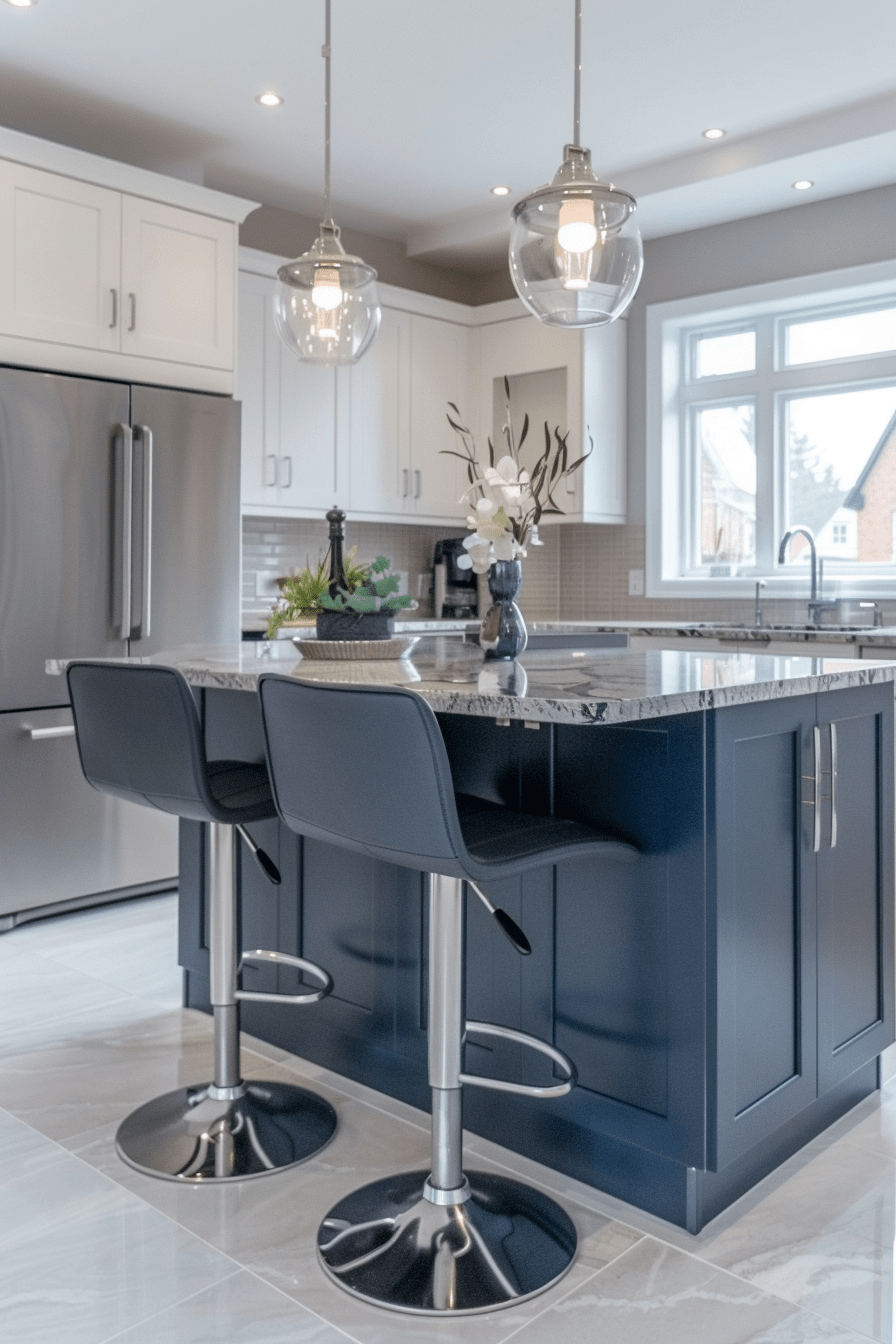
Picking the Perfect Finish:
Matte Finish:
- Pros: Great at hiding fingerprints and small scratches. Plus, it delivers a sleek, humble appearance.
- Cons: Grease can be a foe and tends to be harder to clean when the surface is porous.

Glossy Finish:
- Pros: Bounces light around, making your kitchen feel extra bright. Clean-up is usually a breeze.
- Cons: Shows every little fingerprint and scratch, so be ready for frequent clean-ups.
Satin Finish:
- Pros: The happy medium! Combines a gentle sheen without being like a mirror.
- Cons: Fingerprints are still a thing, and you’ll need to maintain regular cleaning.
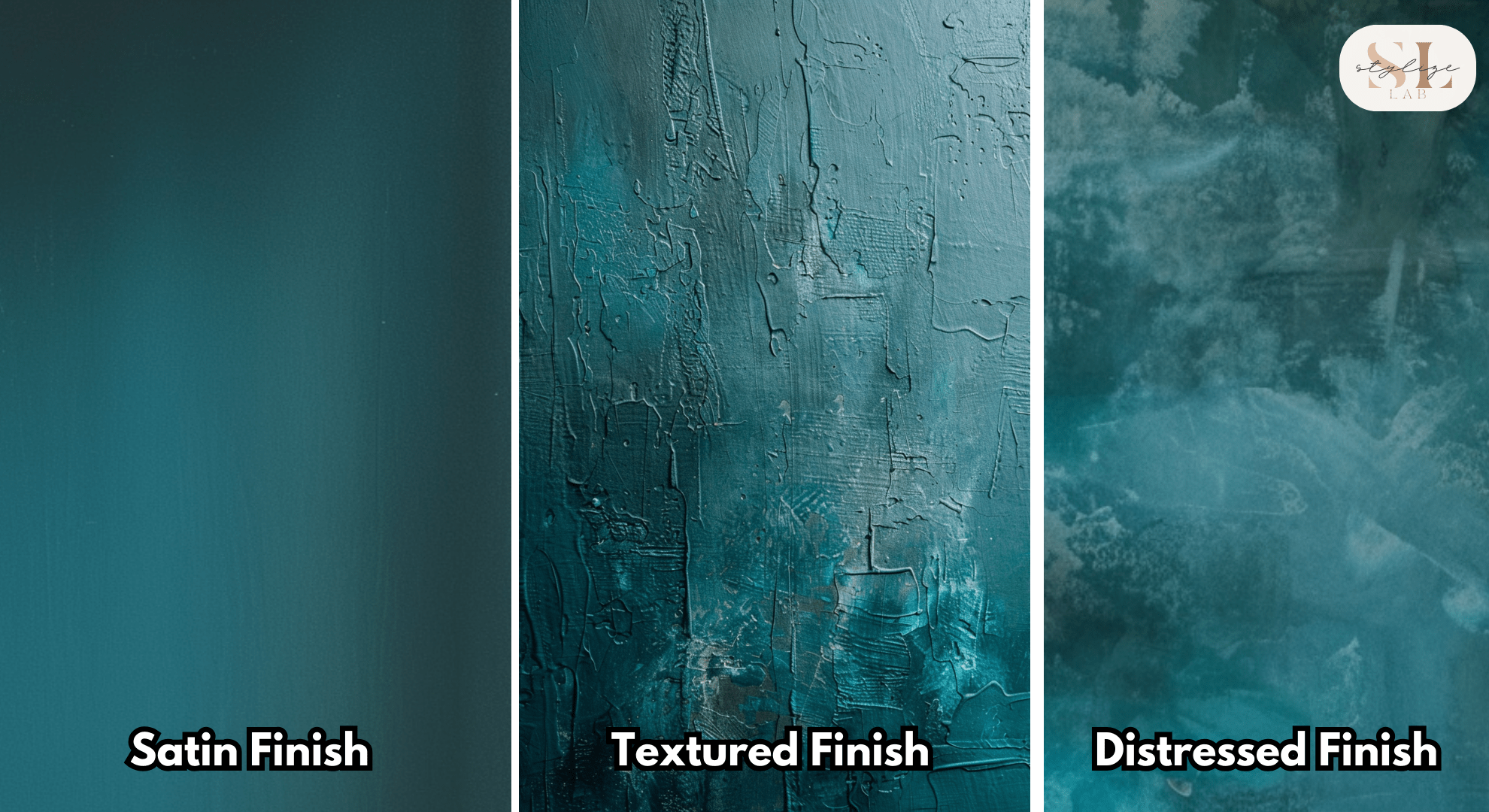
Custom Treatments:
- Distressed or Antiqued: Lends a charming, vintage vibe, perfect for farmhouse or shabby chic decor.
- Textured or Patterned: Adds a unique visual twist but be prepared for a bit more effort when it comes to upkeep.
Functional Features of Kitchen Islands
Adding functional features to your kitchen island can elevate it from a simple workspace to a central hub of activity.
Here’s a closer look at how features like seating, storage, integrated appliances, and lighting can enhance both the utility and look of your kitchen island.
Seating Options🪑
Bar Stools
Types: Available in various designs, including backless, with backs, swivel, and adjustable height options.
Height: Standard bar stool height is around 28-30 inches for a 42-inch counter. Counter stools are shorter (24-26 inches) for a 36-inch counter.
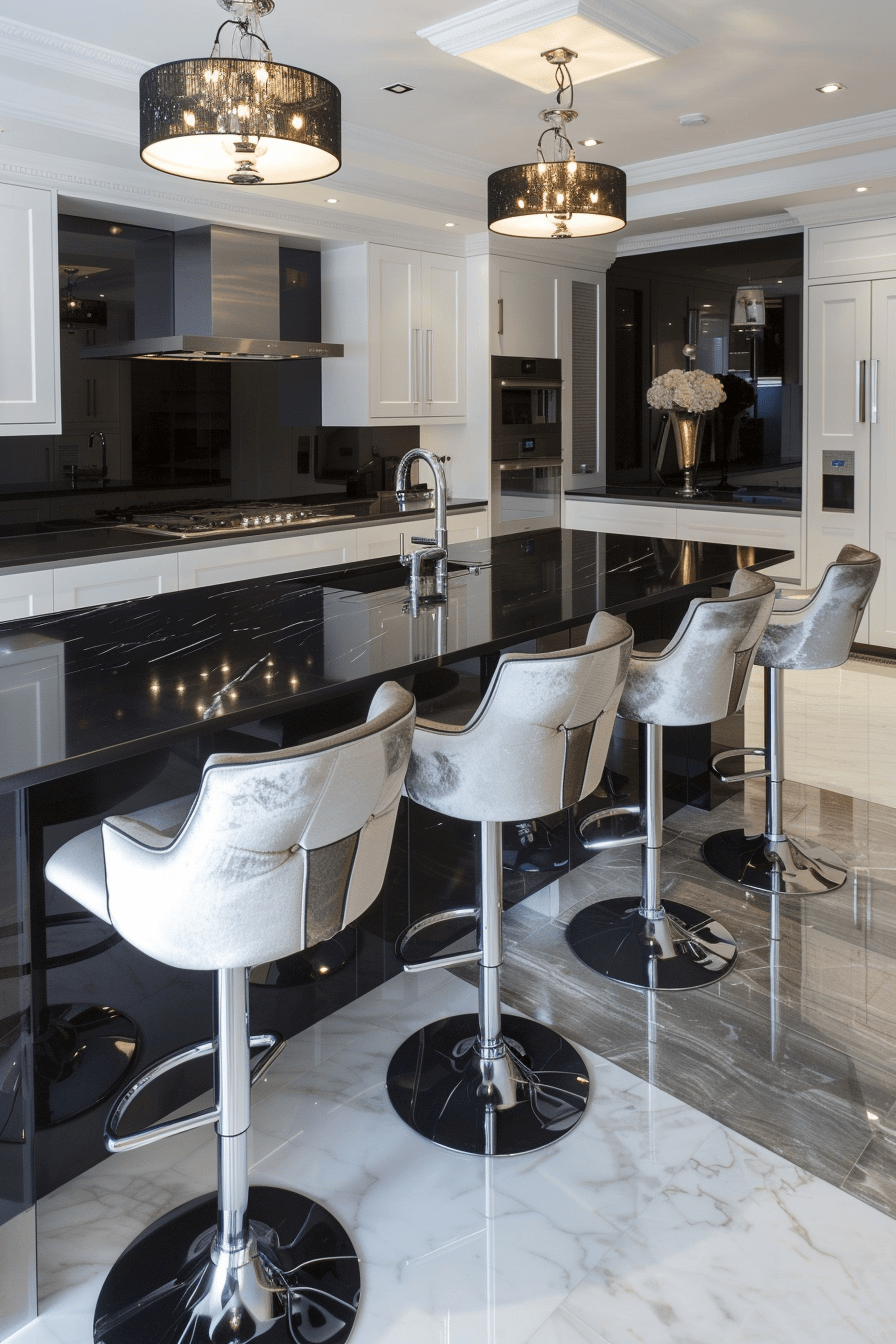
Layout: Ensure an overhang of at least 12 inches to provide comfortable leg space. Allow 24 inches of width per stool for adequate elbow room.
Materials and Styles: Choose from materials like wood, metal, or upholstered for comfort and style. Match or complement your kitchen’s design theme.
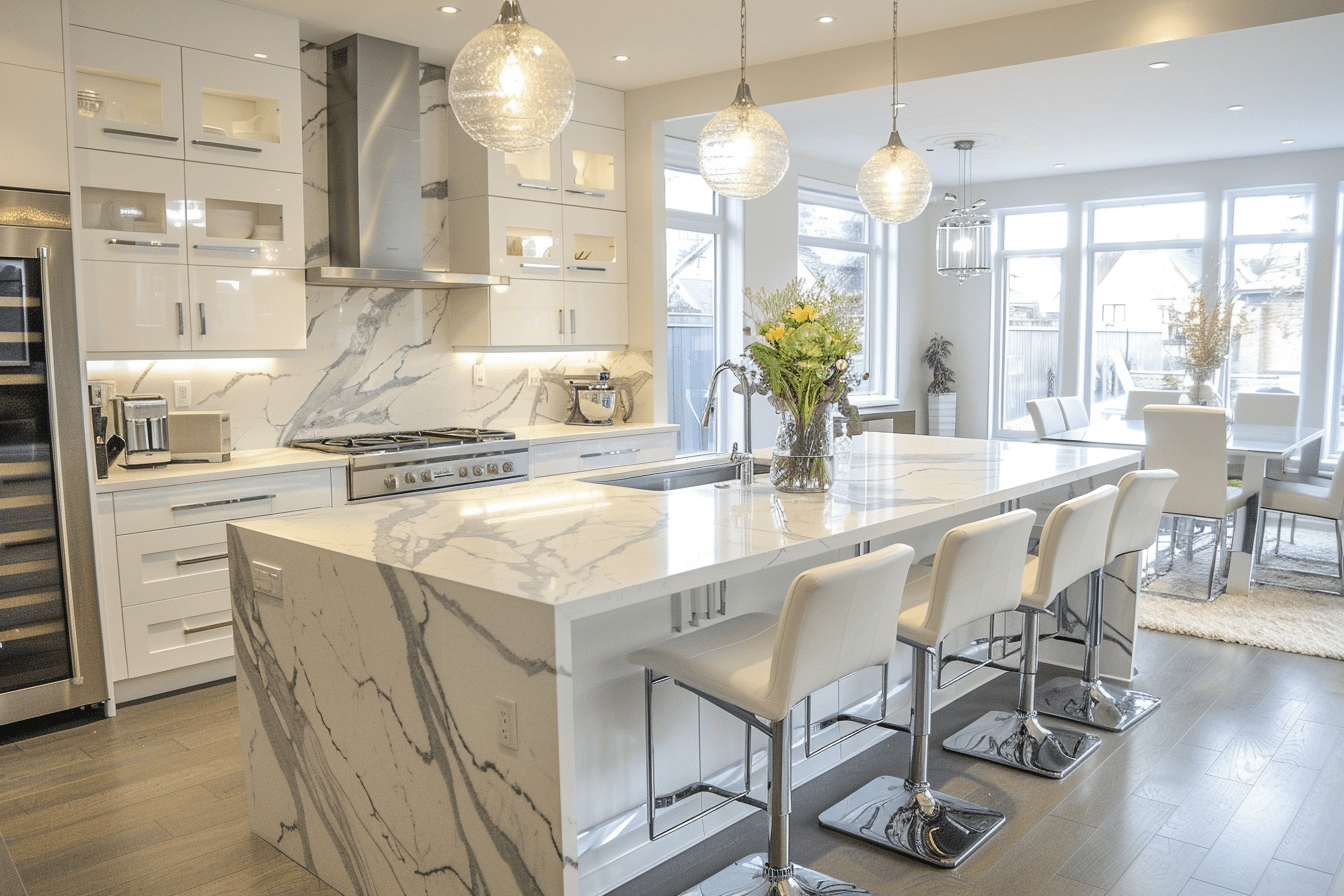
Built-In Benches
Types: Can be custom-built to fit one or more sides of the island, often forming a cozy nook.
Benefits: Ideal for creating a communal dining space and maximizing seating in smaller kitchens.
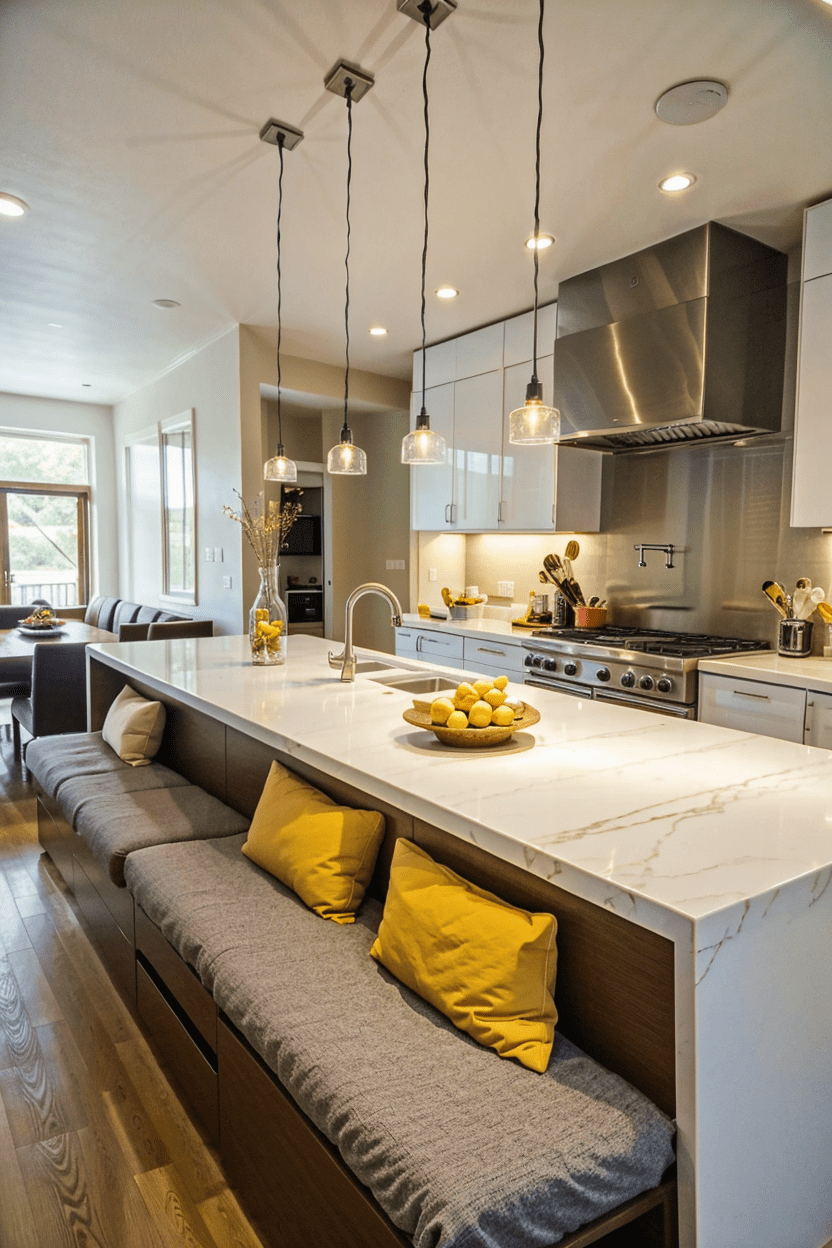
Storage: Some designs incorporate storage underneath the benches, offering an additional practical benefit.
Comfort: Ensure comfortable seating by adding cushions or upholstery, and consider adding a backrest for more support.
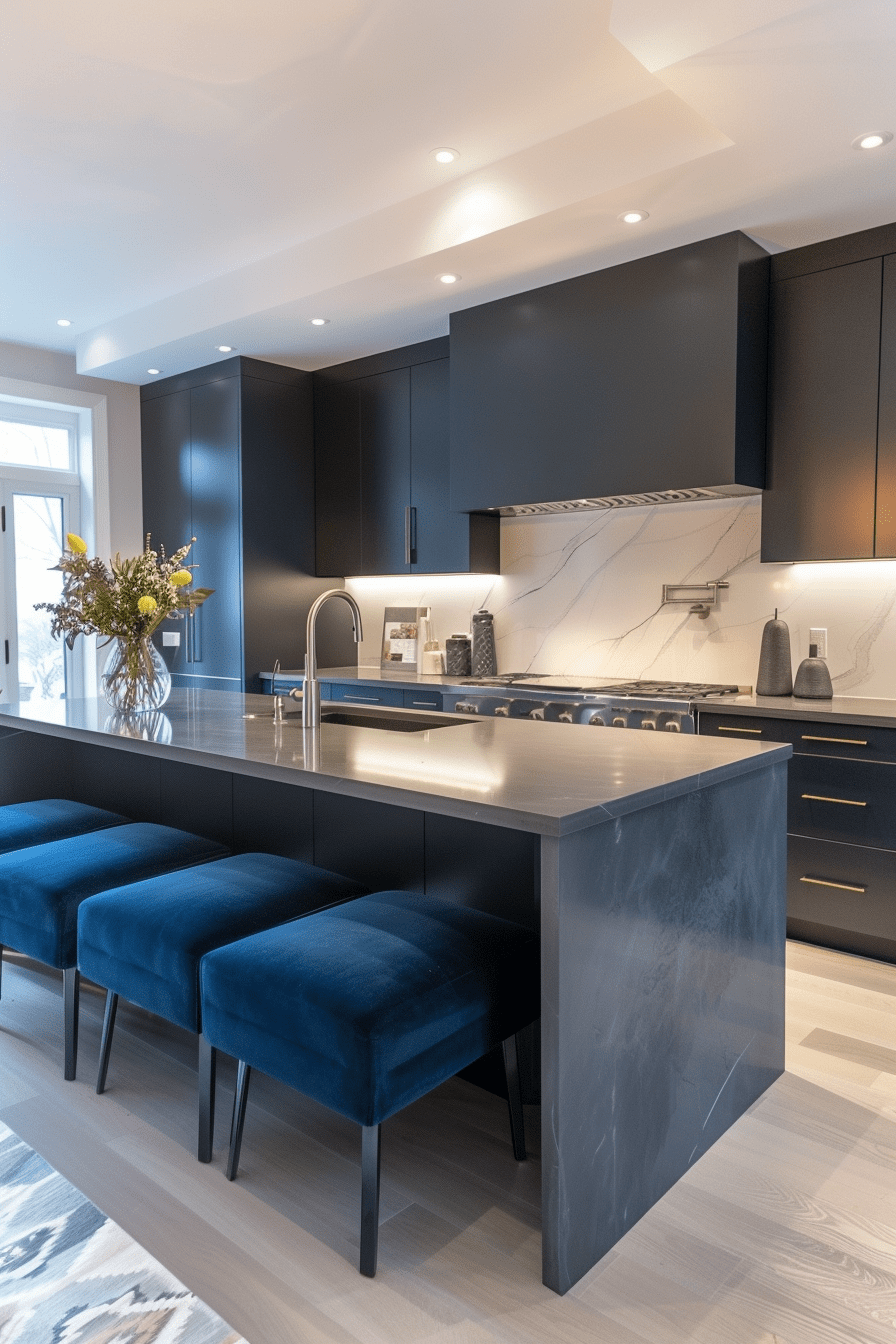
Extended Countertops
Cantilevered or Extended Overhangs: Provide seating by extending the countertop beyond the base of the island.
Pros: Creates a casual dining area with minimal additional construction.
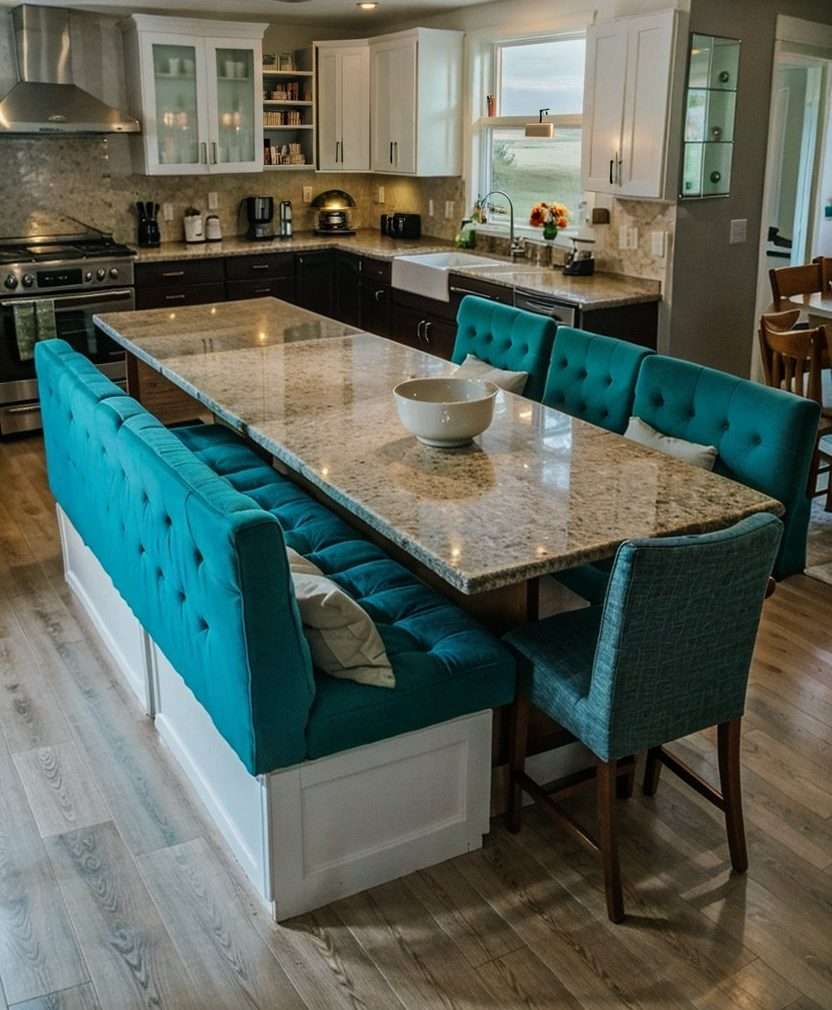
Cons: May require supports or braces to ensure stability, especially for longer overhangs.
Storage Solutions 📦
Let’s chat about the different types of storage options you can use to keep your home organized and stylish:
Cabinets
Custom or Pre-Manufactured: You can go for custom cabinets tailored to your exact needs and available space, or you might opt for pre-manufactured ones that come ready to install.
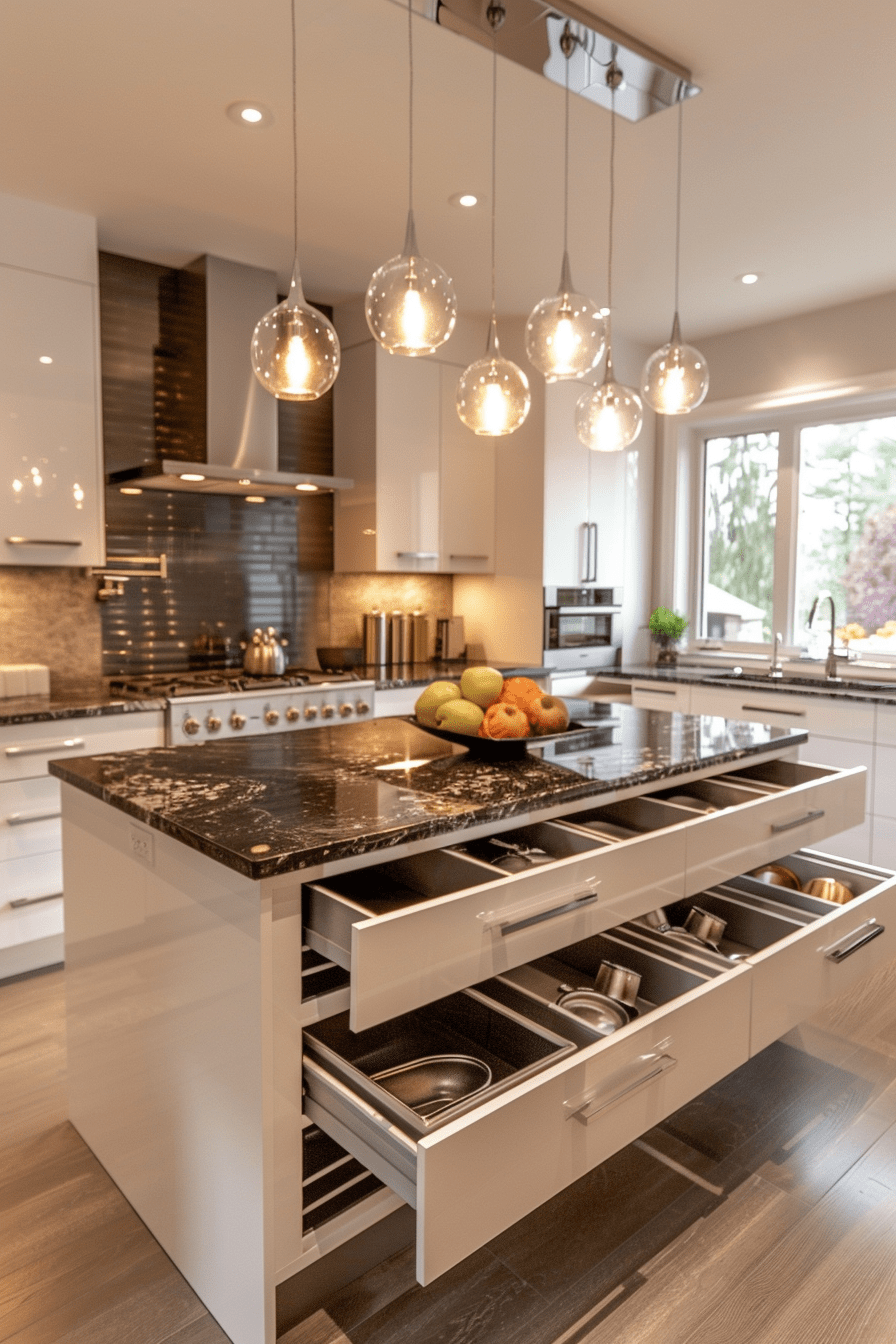
Accessibility: Adding cool features—like roll-out trays, pull-out baskets, or even lazy Susans—makes it easy to reach everything inside without a hassle.
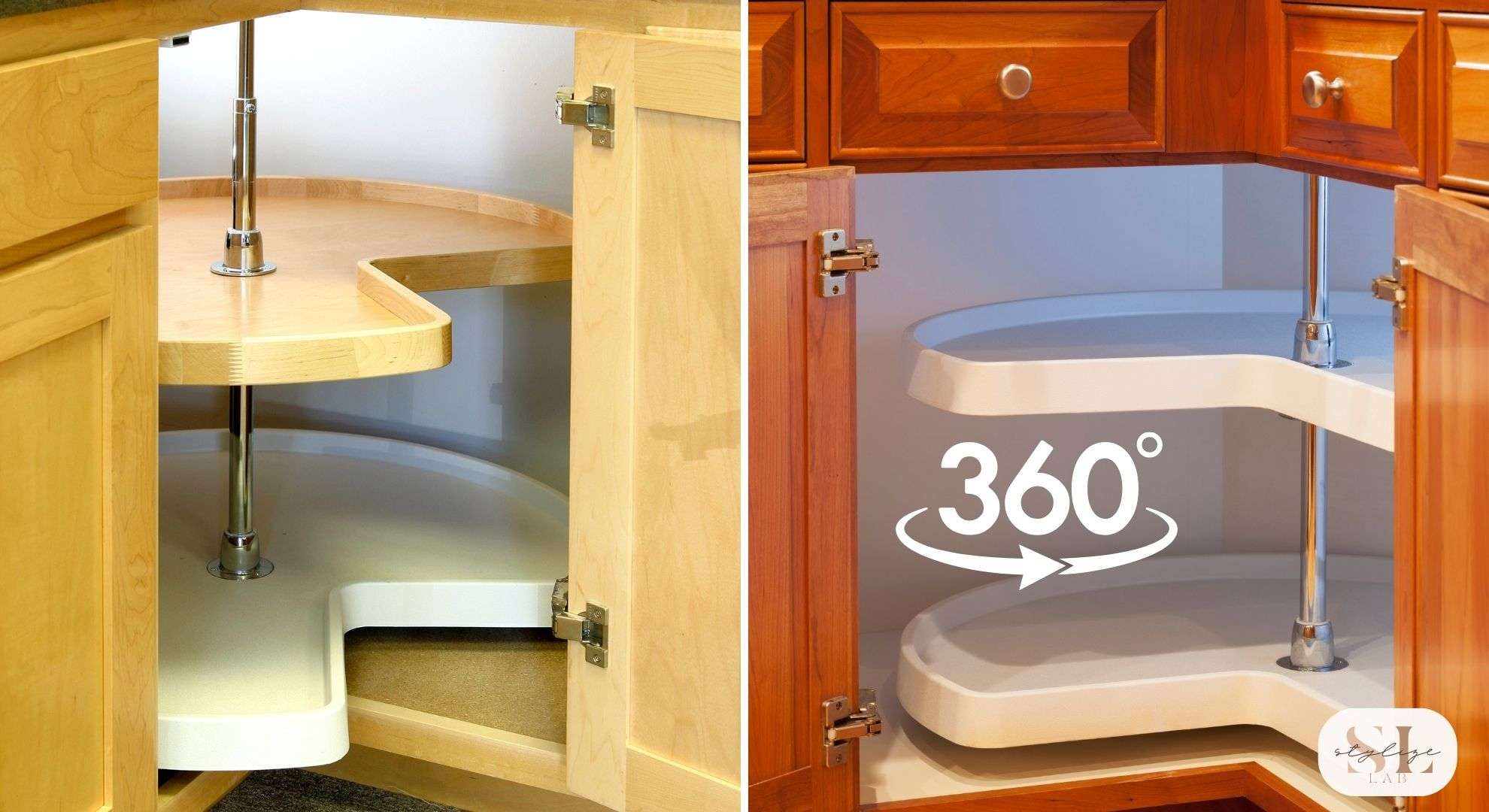
Drawers
Utility Drawers: These are amazing for storing your utensils, cutlery, and smaller kitchen gadgets. Drawer organizers can work wonders in keeping everything tidy and easy to find.
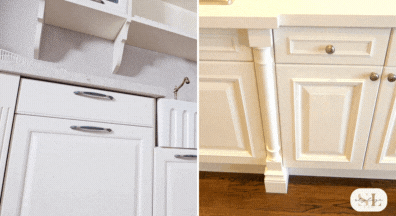
Deep Drawers: Got big pots, pans, and other large items? Deep drawers are perfect. Adding a soft-close mechanism stops that annoying slam sound and helps keep your drawers in good shape for years.

